








































After two months of loose schedules, vacays, beach days, camp drop-offs and seemingly endless meal requests, I’m craving the structure of a real routine. More than any other time of year, September signals a fresh start—a clean slate for the kids in school and for us as a family as we vow to embrace better habits.
One of our biggest goals is to eat dinner together more, despite how busy my kids’ soccer schedules get. My son is about to start his senior year—the last school year he'll be at home before he goes off to college—so I’m feeling all the emotions, wanting to slow things down with more sit-down meals at the table, free of devices and distractions. We’ve also agreed to try and cut back our cell phone time at home. If you’re trying to do the same, our story on page 27 offers solid ideas and shares the positive results schools who’ve banned mobile devices are seeing.
In this issue we’re also exploring the use of AI tools like ChatGPT to do homework and projects. When is it okay and when is it cheating? Turn to page 25 for guidance from educators and experts on how to talk to your kids about using AI tools responsibly and ethically.
If you're considering private school, you’ll want to hear the insights about the admissions process from experts on page 61. Then, our special "Meet the Schools" section will help you get to know the area's leading independent schools.
If you have a neurodiverse child who is non-verbal or who has trouble expressing themselves, you’ll be inspired by the proven methods we share on page 22 that’ll help them communicate. Whether your child is preschool-bound, moving on to high school or prepping for college, we’ve got guidance for each big transition.
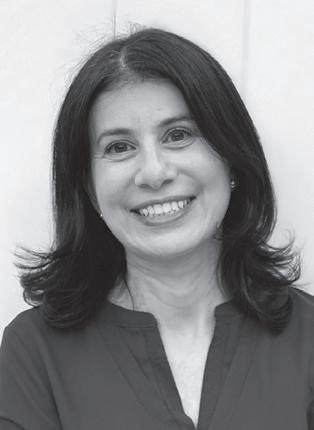
FOLLOW
Threads


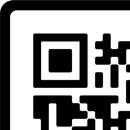
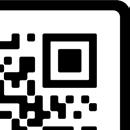
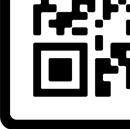

Volume 8, Issue 1 • 2024
Editorial Director
Dina El Nabli
editor@njfamily.com
Art Director
Leeza Hernandez
Managing Editor
Jennifer Amato
Contributors
Heidi Borst, Jennifer Kantor, Ronnie Koenig
Jennifer Lesser, Kerrie McLoughlin
Jennifer Salvato Doktorski
Arricca Elin SanSone
Production Designer
Rosa M. Joseph
Project / Business Manager
Erica Barton
Director of Advertising
Marcy Holeton
Advertising
Ann Cusack, Cathy Grote
Debbie Lubranski, Barbara Nastro
Pamela Peterson, Erin Salman
Andrea Thorne
Co-Publishers
Dina El Nabli / Marcy Holeton
Founding Publisher
Cindy Mironovich
The acceptance of advertising by New Jersey Family does not constitute an endorsement of the products, services, or information being advertised. We do not knowingly present any products or services that are fraudulent or misleading in nature. Editorial inquiries and advertising rates may be addressed to Kids Monthly Publications, Inc., P.O. Box 669, New Providence, NJ 07974. New Jersey Family can be reached by sending an email to editor@njfamily.com, or by visiting njfamily.com.

Reproduction of New Jersey Family or Big Book of Education in whole or in part without written permission from the publisher is prohibited. All rights reserved. Copyright 2024 by Kids Monthly Publications, Inc.

In Jersey, wows run in the family! From apple orchards to high-flyin’ rides and 58+ explorable parks. Alpaca farms, planetarium shows and tropical indoor waterparks. It’s one wow after another. Find your wow at visitnj.org.

Back to School shopping made easy with 150+ stores. Scan the QR code for our latest deals.

4 5 3 2
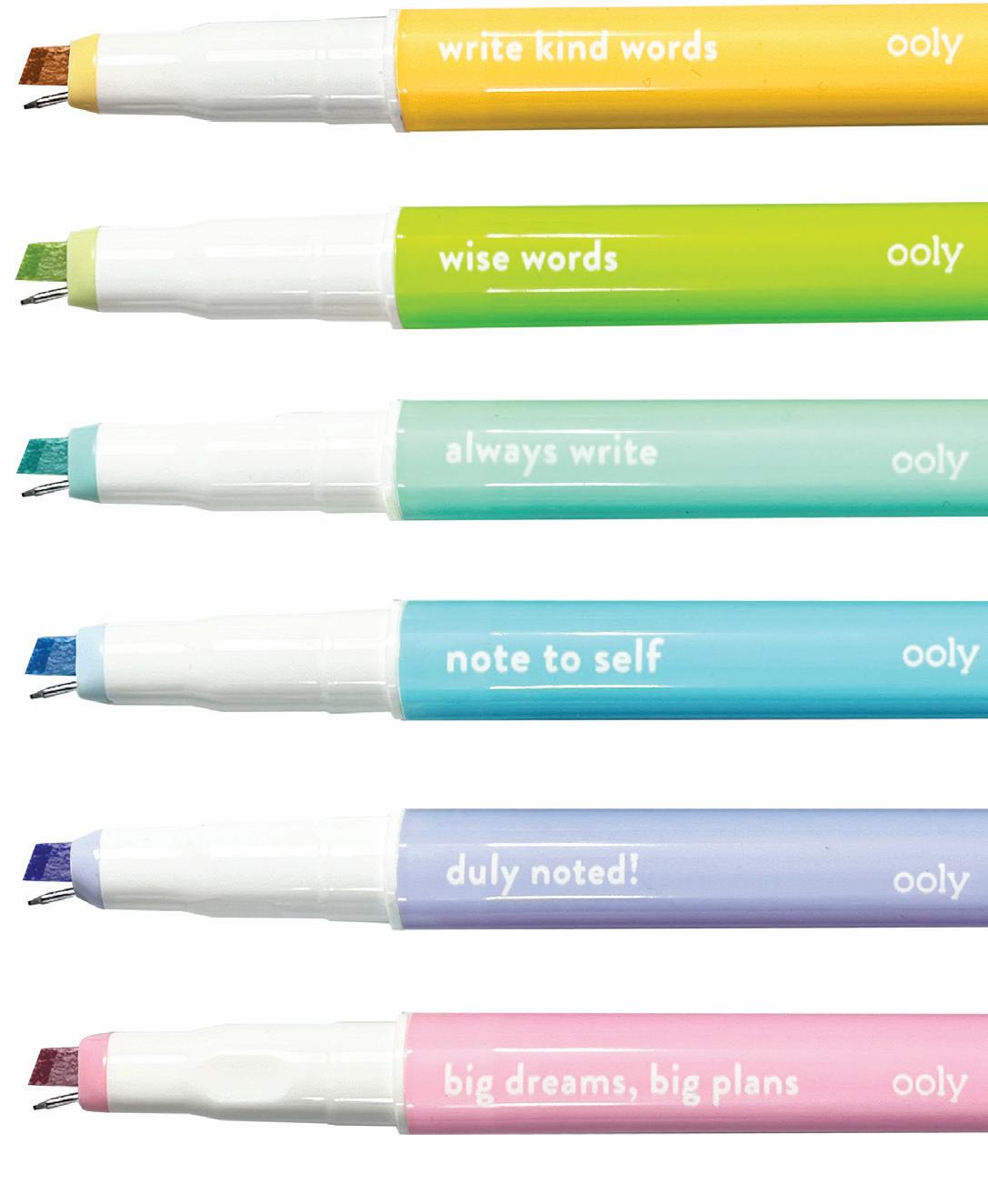
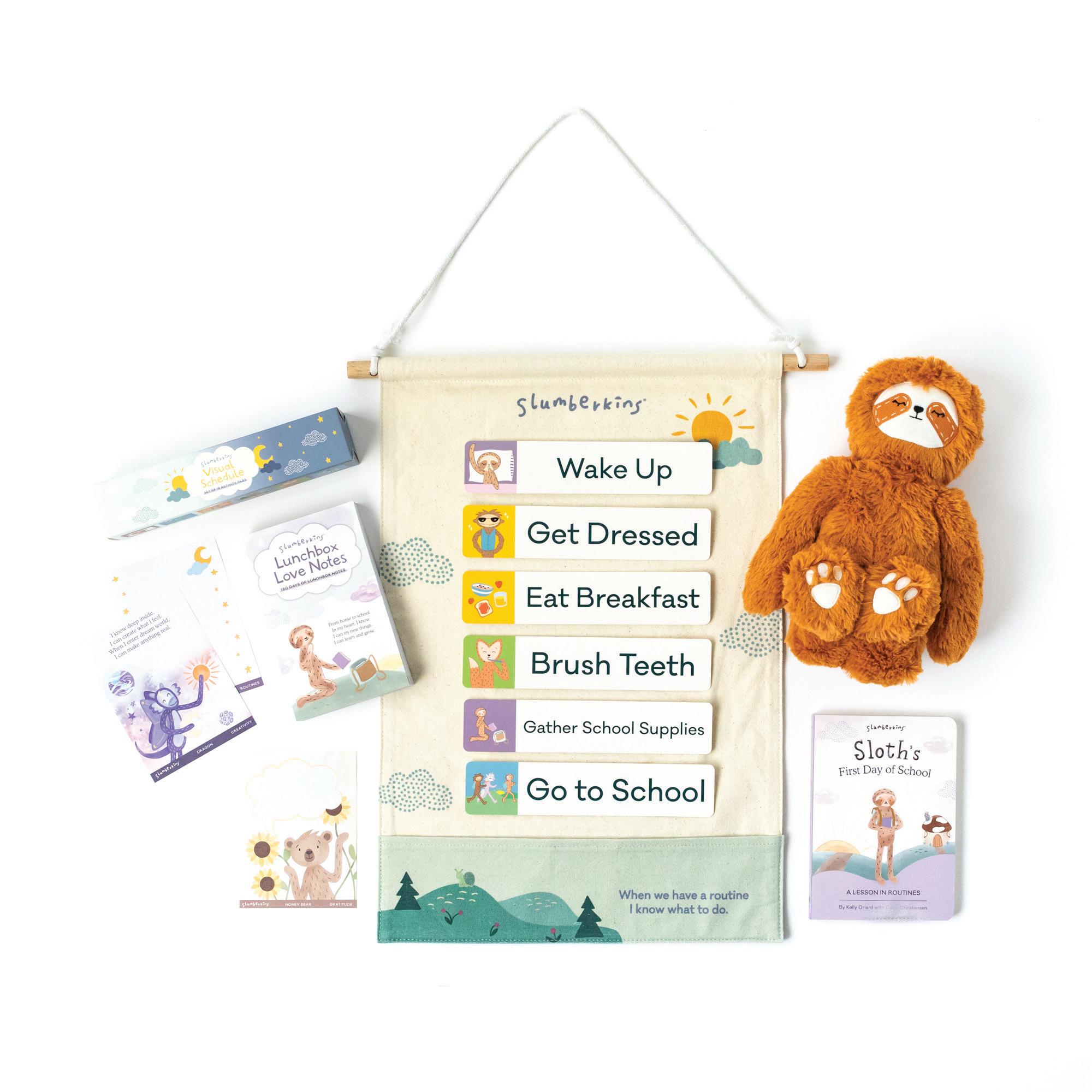


1. SHARK SIPS This durable, leak-proof bottle with a built-in straw keeps drinks cool for up to 12 hours, has a carry handle and is dishwasher-safe. Kids Stainless Steel Insulated Water Bottle, Bentgo. $19.99, bentgo.com
2. TAKE NOTE This 2-in-1 pen and highlighter set has six pastel-colored dual tips with both a fine pen and highlighter. Each has an inspirational message, too. Noted! 2-in-1 Micro Fine Tip Pen and Highlighters, Set of 6, Ooly. $14.95, ooly. com 3. CALM & COLLECTED The Back-to-School Kit and Separation Anxiety Set help kids adjust to new routines and manage anxiety from being apart from parents. Routines Visual Schedule, Slumberkins. $40, slumberkins. com 4. SUPER COOL This foldable, freezable lunch bag uses patented technology in its walls to keep food and drinks cool for hours without needing ice packs. Freezable Playtime Lunch Box, PackIt. $29.99, packit.com 5. SNACK ATTACK This dual-compartment leakproof snack container keeps fruits and veggies fresh and dips mess-free. Day Tripper Snack Container, PlanetBox. $11.96, planetbox.com

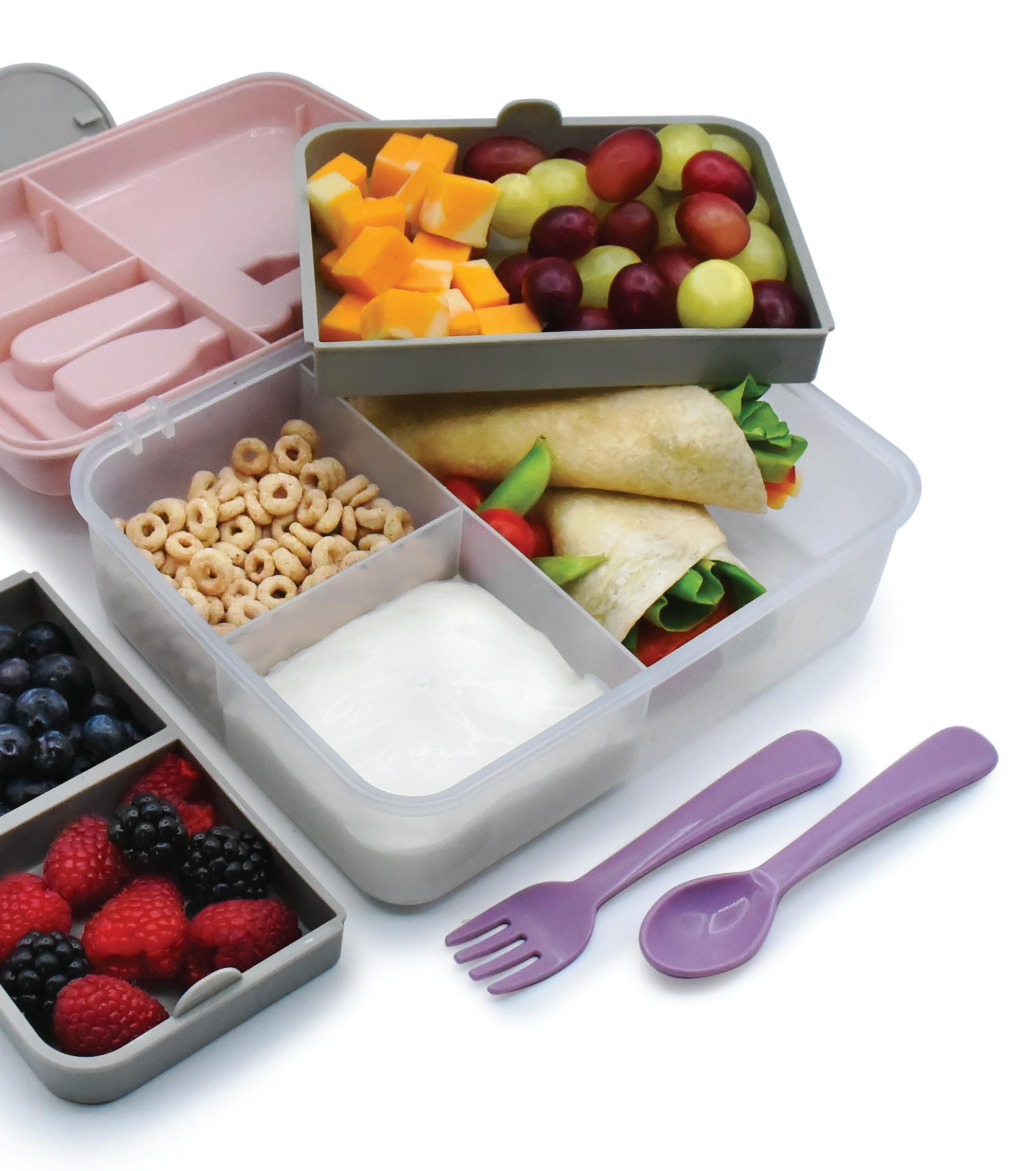
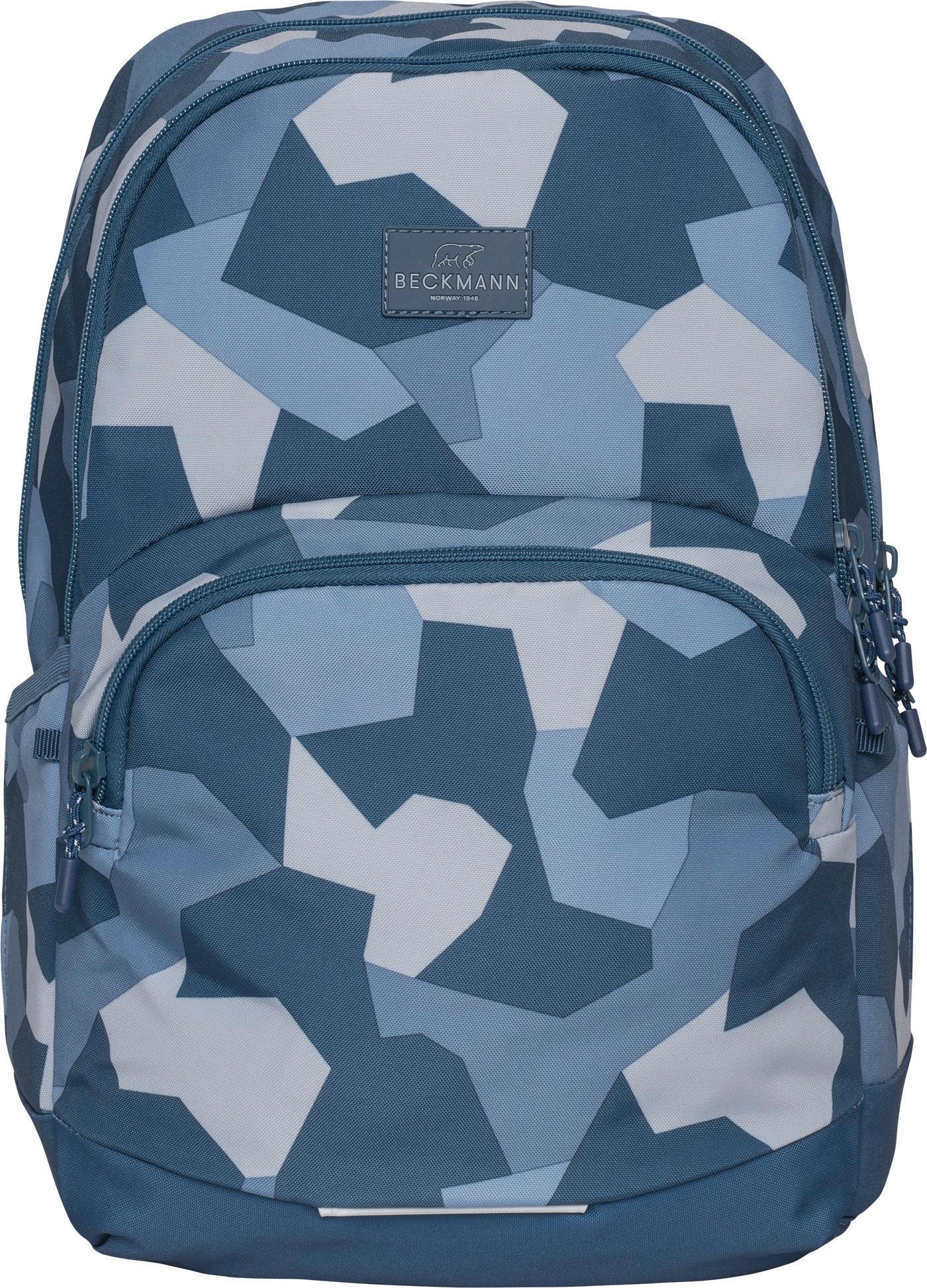
1. WRITE JEDI Star Wars fans will be all over these gel pens that are replicas of the LEGO Star Wars Lightsaber, in red, blue, green and purple. IQ LEGO Star Wars Lightsaber Gel Pen Set, IQ. $15.99, amazon.com 2. BETTER BACKPACK Has your kid outgrown their first backpack? This ergonomically designed bag has roomy compartments, a laptop pocket and a removable hip belt. Sport Junior, Blue Camo, Beckmann. $119, beckmann-us.com 3. STACKED LUNCH This lunchbox has two spacious compartments to elevate your kid’s meal by keeping sandwiches, fruits, veggies and other snacks well organized. 2 Tier Bento Box, melii. $14.99, meliibaby.com 4. NAMESAKE 2
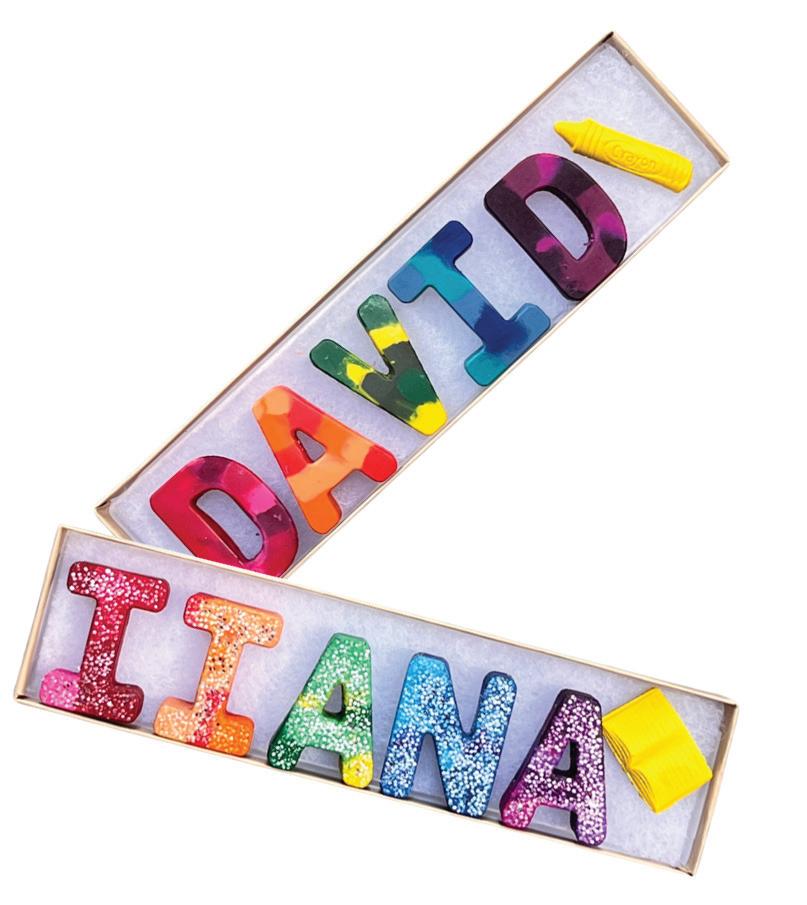

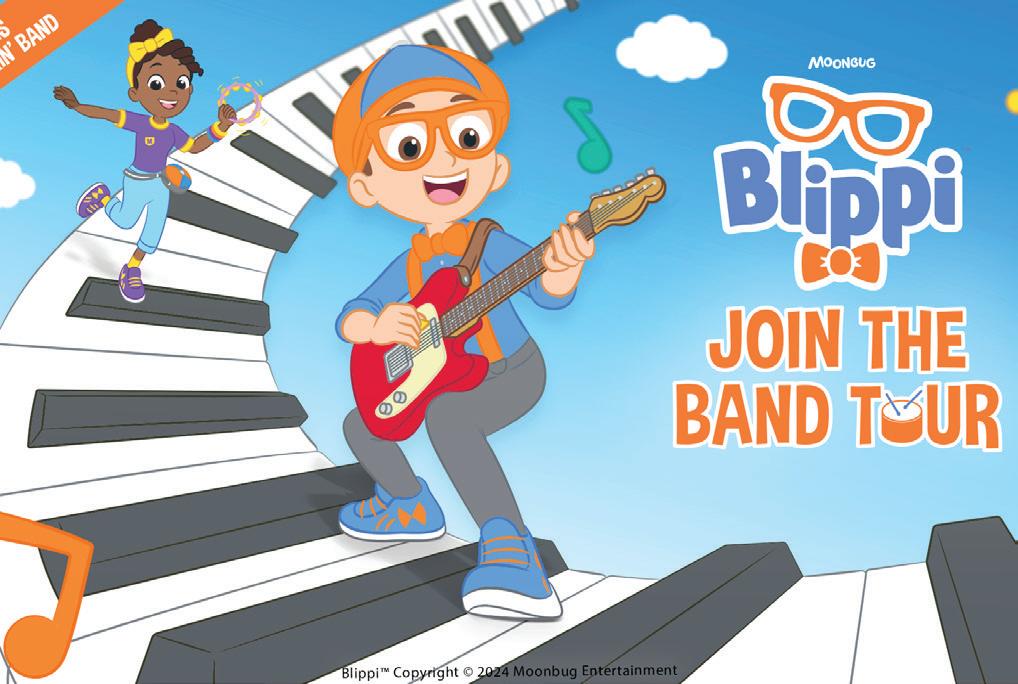

10/5 Blippi: Join the Band Tour
10/13 Encanto: The Sing-Along Film Concert
11/16 The Illusionists – Magic of the Holidays
11/29 A Charlie Brown Christmas: Live on Stage
11/30 Mannheim Steamroller Christmas by Chip Davis
12/13-26 New Jersey Ballet’s The Nutcracker with New Jersey Symphony
1/26 Pinkalicious The Musical*
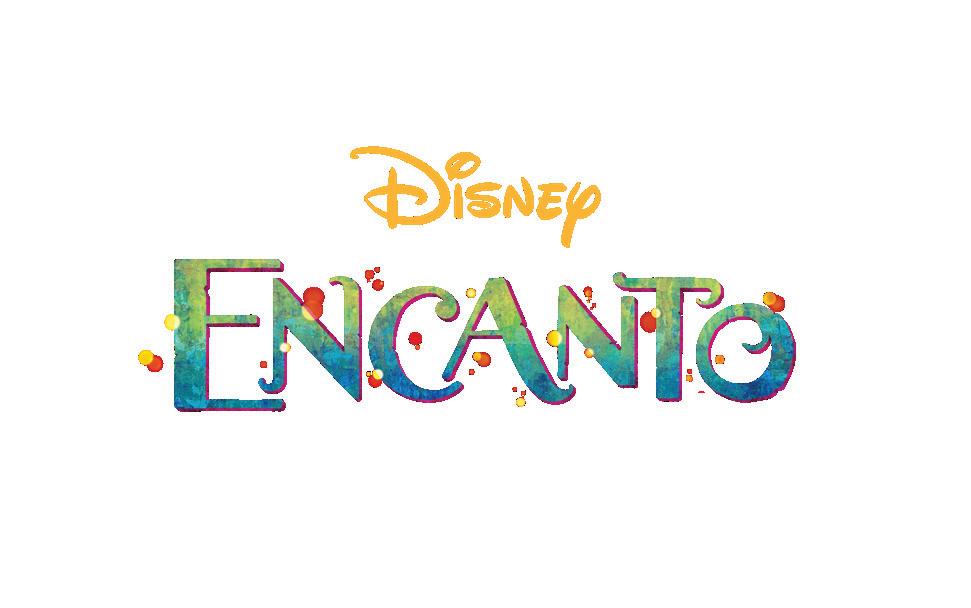







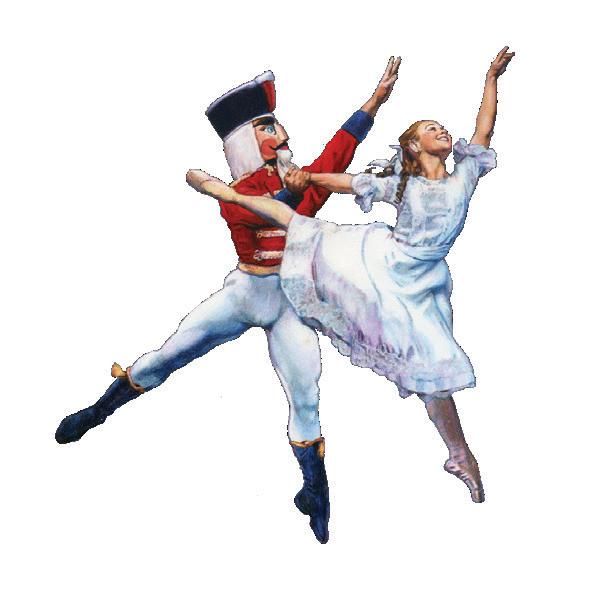

2/22 The Gazillion Bubble Show
3/7 Kodo
3/9 A Year with Frog and Toad*
3/21 The National Dance Company of Ireland: Rhythm of the Dance
4/5-6 Stomp
5/4 Pete the Cat*
5/13 Cat Kid Comic Club: The Musical*


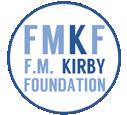

Wellpoint offers benefits to kids, families and adults through NJ FamilyCare.
Doctor visits
Have questions or need help?
Hospital stays
Call us at 877-453-4080 (TTY 711), Monday through Friday from 9 a.m. to 5 p.m. These calls are free. More information about Wellpoint (choosewellpoint.com/nj).
Do you need help with your healthcare, talking with us, or reading what we send you? We provide our materials in other languages and formats at no cost to you. Call us toll free at 833-731-2147 (TTY 711).

Tips to help your kids embrace good sleep habits before heading back to school
Back to school means a new year of challenges and adventures for your kids. But no one can learn when they’re sleepy (and cranky).
After a summer of late nights and sleeping in, the whole family probably needs a sleep makeover. Here’s how to get everyone back into the groove, with tips from the American Academy of Pediatrics, the American Academy of Sleep Medicine and the Sleep Foundation:
MAKE SURE KIDS GET ENOUGH SLEEP
It’s probably more than you realize: Preschoolers need 10 to 13 hours of sleep, while grade schoolers require 9 to 12 hours. Teens need 8 to 10 hours.
START ADJUSTING TO EARLIER BEDTIMES GRADUALLY
About a week or two before the new school year begins, start inching back bedtimes. Have your child go to bed 15 minutes sooner and get up 15 minutes earlier to help them get used to the new schedule.
BEGIN A SOOTHING NIGHTTIME ROUTINE
This helps kids of any age settle down
BY ARRICCA ELIN SANSONE
so they can fall asleep more easily. A bath, reading a book together, and tucking them in can be part of the ritual for young kids. Big kids should find something that relaxes them, such as journaling, reading or meditating. Your kids should put down screens at least an hour before bedtime.
ENSURE YOUR CHILD’S BEDROOM IS A PEACEFUL PLACE
The room should be dark, cool and quiet. Use a sound machine to mask street noise if that’s a problem.
SET UP A PHONE CHARGING STATION
To encourage everyone to unplug, keep phones out of bedrooms. This also prevents late-night scrolling (this applies to you, too!).
PRIORITIZE SLEEP FOR YOURSELF, TOO
Your kids are watching you. And we promise you’ll feel better able to handle the morning routine when you get a good night’s sleep, too.
—Arricca Elin SanSone is a New York-based health and lifestyle writer.





Amblyopia, or lazy eye, is the most common childhood visual disease, affecting about one to five percent of kids worldwide. Caused by abnormal visual development early in life, the weaker (or so-called lazy) eye often wanders inward or outward.
Children may have an increased risk of lazy eye due to premature birth, small size at birth, or a family history of lazy eye. If the issue isn’t treated (or treatment is delayed too long), a child may lose vision permanently in the affected eye.
Kids commonly are treated by wearing glasses for a lengthy period of time before patching (the eye with better vision is patched to stimulate the weaker eye). Alternatively, drops may be used to blur the vision in the unaffected eye to make the affected eye work harder.
Unfortunately, the current treatment method has shown poor results for many kids. “This often means that children patch or are treated with glasses or eye drops for a year or longer but the vision does not even reach half of normal vision, which is 20/40,” says Irene Gottlob, MD,
BY ARRICCA ELIN SANSONE
professor of neurology at Cooper Medical School of Rowan University and attending physician with Cooper and Inspira Neurosciences in Camden.
But now a new study published in The Lancet has found that patching sooner—without a long period of glasses-wearing first—helps to correct the disorder more effectively in most kids. One group in the study received patching for 24 weeks after 18 weeks of glasses; the other group received patching for 24 weeks after three weeks of glasses.
The results measured the improvement of vision. “We found that children younger than 5 years and 4 months are likely doing better with starting to wear glasses for a while,” says Dr. Gottlob, who was the senior author clinical lead in the study. “Other children have better visual results when starting patching sooner.” In general, younger children with less severe visual loss responded better to initial treatment with glasses.
Further research is necessary, but the study is a step toward helping provide more personalized care and better treatment results for kids with amblyopia.
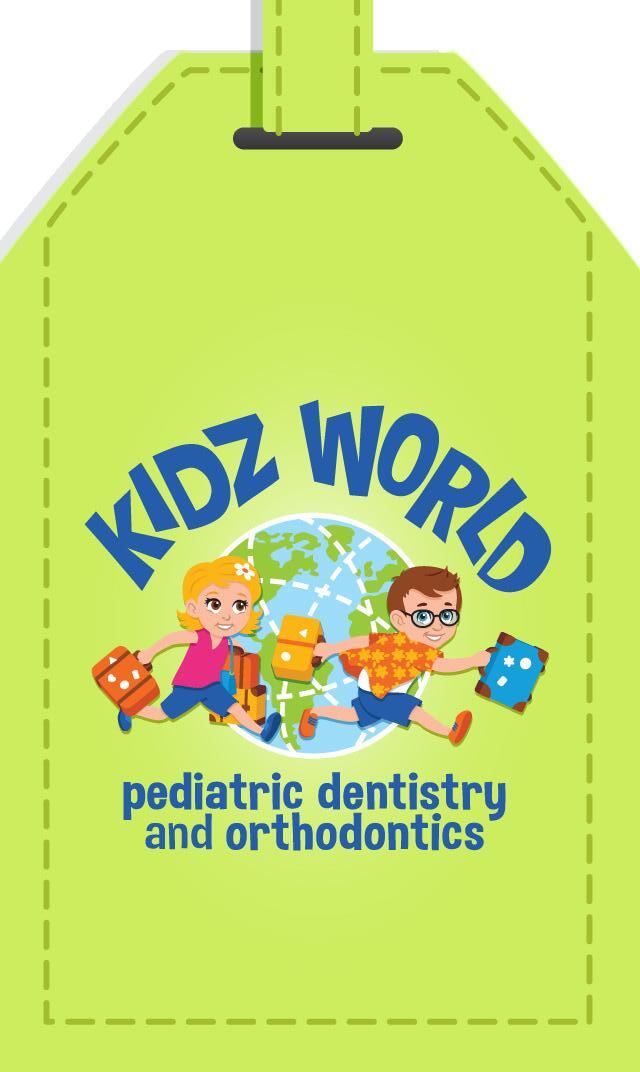
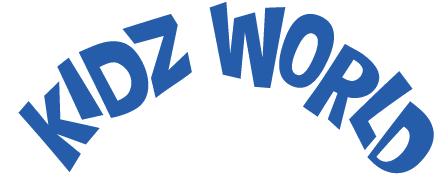

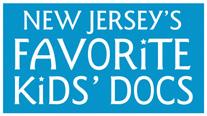









12 things to consider as your kids start a new year

By ARRICCA ELIN SANSONE
Trained to handle everything from minor bumps to medical emergencies, school nurses have a vital part in keeping your child safe and healthy throughout the school year. “Our role is to help kids stay in school and be present to learn every day,” says Robin Cogan, RN, NCSN, a New Jersey school nurse and clinical coordinator at Rutgers School of Nursing-Camden. “We don’t want kids to miss anything.”
While you may not realize it, school nurses are certified, just like teachers. A New Jersey certified school nurse (NJ-CSN) or national certified school nurse (NCSN) must complete specific educational and continuing education requirements and be licensed by the NJ Board of Nursing and the Department of Education.
School nurses typically are the only healthcare providers in the school for the students, teachers, visitors and other staff. Most—though not all—schools have full-time school nurses. “Ask if yours has a nurse in the building all day, every day,”
says Eileen Gavin, FNP, NCSN, president of the New Jersey State School Nurses Association. “Sometimes nurses serve multiple schools. You can approach your school’s Board of Education to express your concerns that the school be staffed appropriately.”
Here’s what school nurses say will help parents prepare kids for a safe, healthy school year:
It’s tough to adjust to a new year after a summer of late nights and sleeping in, but sleepy kids can’t learn. “Manage what’s in their rooms so you can limit screen time,” says Gavin.
Hungry kids aren’t going to be able to focus, so get kids to eat before they come to class, says Gavin. Set up the night before so it’s one less thing to do in the morning. For teens,
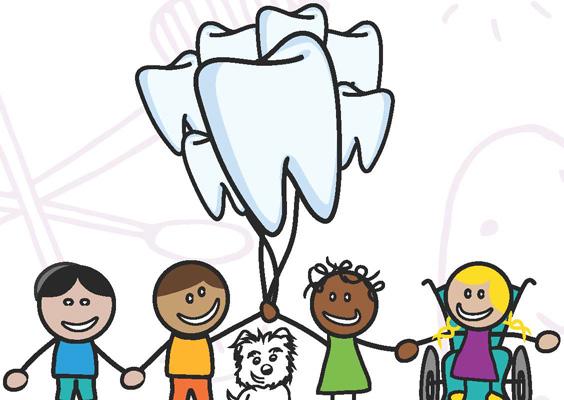
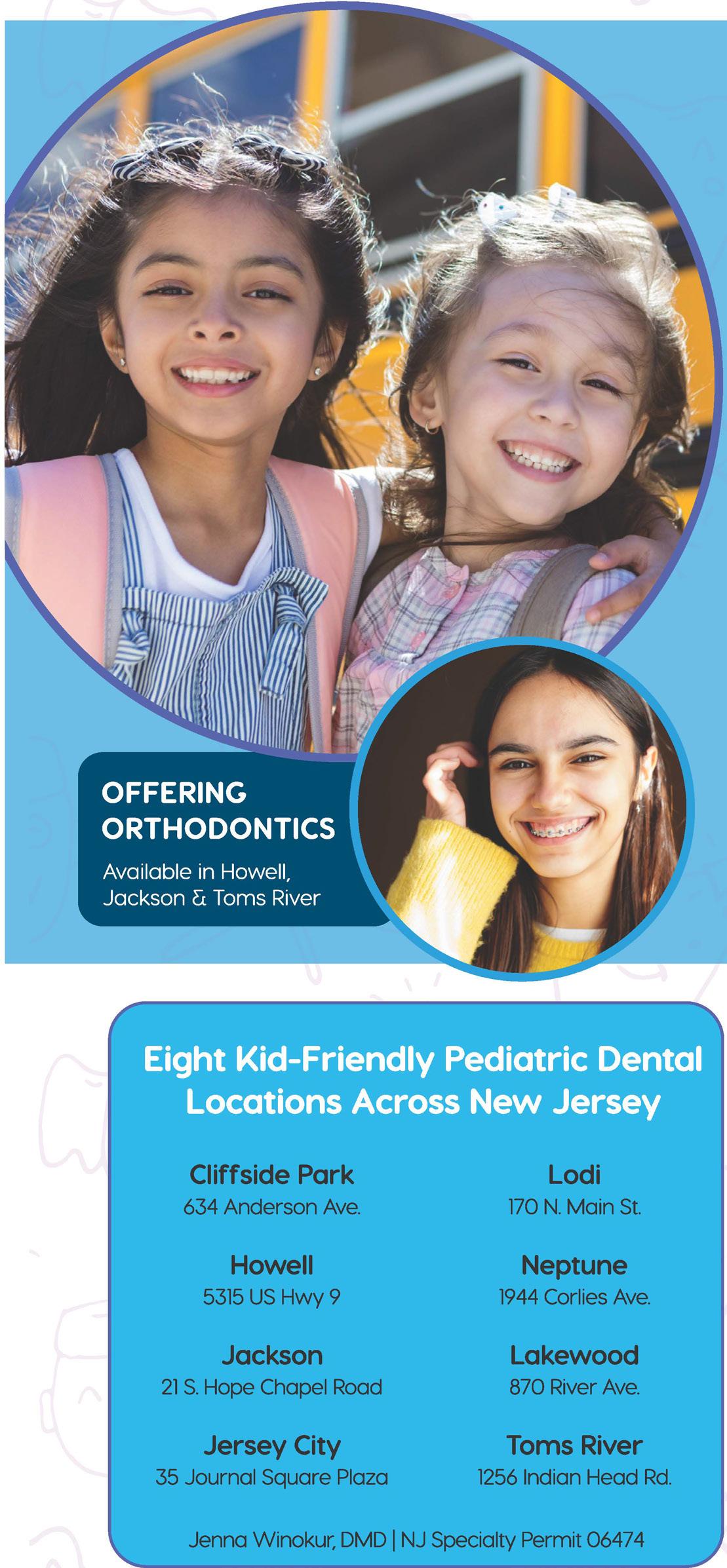





any forms before the first day of school every year. Also, be aware that while sports physicals are good for one year, there’s a health update required quarterly, says Cogan.
Ensure your cell phone number and email address are correct (and that messages aren’t going to spam). Also, confirm that everyone on the school pickup list still is accurate. “Sometimes these important details get overlooked,” says Cogan.
Kids who are new to any New Jersey school district require an entry physical. For all kids, immunizations should be updated. If your child is just starting daycare, be aware that children ages 6 months to 59 months need proof of a flu shot every year by December 31, says Cogan.
TALK WITH THE SCHOOL NURSE ABOUT ANY FAMILY CONCERNS
send protein bars or cheese sticks in their backpacks if they don’t feel like eating right away.
ESTABLISH A RELATIONSHIP WITH THE SCHOOL
Meet your school nurse on Back to School Night. Ask about how health-related issues are communicated, and what your preference is if you need to be contacted. “For example, do you want to know any time your child sets foot in the school nurse’s o ce, or only for serious conditions?” says Gavin.
COMMUNICATE YOUR CHILD’S HEALTH CONDITIONS
This includes any condition for which your child may need emergency medication, such as diabetes, asthma, food sensitivity or allergy, or a bee sting allergy. “Your child’s school nurse is the connection to develop evidence-based emergency action plans for these types of conditions and to share them with the staff,” says Gavin.
SEND IN THEIR MEDICATIONS ON
Medications should be available for use on the first day of school. If your child needs an EpiPen, make sure you send two of them. “These come in boxes of two, so sometimes parents think it’s okay to keep one at home and one at school, but sometimes a child needs both pens when experiencing a reaction,” says Cogan.
MAKE SURE PAPERWORK IS UPDATED ANNUALLY
The new school year o cially begins on July 1, so resubmit
Sometimes kids complain of physical symptoms, such as a headache or stomachache, when they’re actually upset about something, such as a death of a loved one or pet, divorce, or other family event. “You can share whatever you feel is important if it impacts your child’s ability to flourish in school,” says Cogan.
CHECK IN WITH THE NURSE ABOUT YOUR CHILD’S MENTAL HEALTH, TOO
“About 35 percent of visits to the school nurse were about mental health pre-pandemic,” says Gavin. “This has increased significantly post-pandemic.” Gavin says many school nurses can offer support by connecting kids with a school counselor or offering other resources, such as teaching mindfulness techniques and other coping strategies.
This includes: teaching kids to cover their mouth and nose when coughing or sneezing, throwing away used tissues, and coughing or sneezing into your elbow, not your hands, says Cogan. Remind them about proper handwashing, too (sing “Happy Birthday” or “Row Your Boat” twice, while scrubbing the tops and bottoms of hands and between fingers).
It’s tough to miss work, so have a plan in place if your child is ill and can’t go to school, says Gavin. Know what your school’s stay-home policy is. For example, for certain cases such as vomiting or diarrhea two or more times in the past 24 hours, fevers of 100.4 degrees F or higher, contagious skin infections, pink eye, and extreme sore throat and fever, you should contact your pediatrician and keep kids home.

By JENNIFER AMATO
7 things to know before they go
reschool is an exciting time in the lives of our littles. It may be their first time away from home for an extended period of time. They will have lots of opportunities to learn, socialize and make friends. And they will likely also bring home the expected cold or two. Here’s what to know about your child’s introduction to their school years, and how to adapt as parents, too.
Can your child follow simple directions? Does your child show interest in exploring new things and participating in activities? Can your child follow a routine and understand the concept of structured time for meals, rest time, and activities? Do they have the physical stamina to participate in a half-day or full-day program successfully with a structured rest time during the full-day program?
If so, your little learner is probably ready to start school—whether or not you are, says Laura Hubschman-Scuderi, M.Ed, director of Palisades Country Day School in Closter.
“Look at their developmental milestones, assess their skills at expressing their needs and following simple instructions, note their social interactions and their ability to handle some tasks on their own,” she says. “Are they able to independently use the toilet, wash their hands, put on simple articles of clothing and eat?”
Every child has their own learning style and needs for development, and many preschools have teachers who adapt to the process.
“A multi-sensory learning approach should always be at the forefront of daily life in the preschool classroom. Through visual, tactile and auditory experiences, children develop mathematical and literacy concepts,” says Hubschman-Scuderi.
Many preschools offer academic and recess structures, as well as an array of special programs such as music, creative movement, sports, multicultural holiday celebrations, character education, mindfulness, art classes and more. They should be painting, drawing and singing to help with not only their expression but also their fine motor skills, Hubschman-Scuderi says.
“At times the child does have an academic-like experience for the first time,” says Erin Seppala, senior marketing manager for Apple Montessori Schools, which has multiple locations throughout New Jersey. “Children have an innate desire to play and explore. This is the ultimate way of learning and Apple provides that in an environment that fulfills their natural desire for knowledge supported through the right tools.”
Consistency and routines help children feel safe and secure, Hubschman-Scuderi says. “When children (and even adults) know what to expect, they feel more in control, less anxious, and more likely to exhibit positive behaviors,” she says. “Routines help children build stable emotional foundations with their families and teachers while fostering independence and confidence in their own abilities to take on new challenges. They learn to trust and build healthy relationships with those around them.”

Whatever you’re facing, it’s easier to shoulder when your burden is shared. So, when you need care, know that there’s a place where care rises to another level. Where medicine can only be described as leading-edge. And where great hearts and minds come together to create hope, ease fear and give you the support you need . . . mind, body and spirit. The name? Holy Name. Where providing great medicine isn’t a goal. It’s a religion.
“COOPERATIVE AND CREATIVE PLAY FOSTERS LANGUAGE DEVELOPMENT AND PROBLEM-SOLVING SKILLS AND EXPANDS IMAGINATION...”


She adds that you need to keep a stable morning routine, sleep patterns, mealtimes and family time at home.
When young ones are exposed to new people, places and things, it’s great for their well-being. However, if you feel your child may be overwhelmed, you can talk to your child’s teacher about pulling back or adding quiet time to the day.
You can ask for progress reports or meetings with the teacher to check in on your child. Don’t wait until those dreaded middle school parent-teacher conferences to get a read on what’s going on.
“Constant communication is the key to help a child adjust and parents to form trust with the school body,” Seppala says.
This may be the first time your child is away from you for an extended period of time. Separation anxiety is normal, but touring the preschool with your child and getting to know their teachers will help them feel more comfortable, Hubschman-Scuderi says.
“During the first few days, there may be tears; however, once a bond is made with teachers and relationships begin to bloom, children feel safe and confident to explore the classroom and school activities independent of their families,” she says.
There is no doubt that the more kids you’re around, the more germs you’re around. Ask what immunizations are needed before the start of school. And check the school’s guidelines and protocols for sick
children, and how you have to report if your child stays home from school (especially if he or she has a fever), Hubschman-Scuderi says.
Kids will establish a strong foundation for their social and emotional development, learning skills and interpersonal relationships by starting school early, says Hubschman-Scuderi.
“Preschool is meant to be fun. It is an opportunity for our young learners to develop confidence to explore new things, take on healthy challenges, ask questions about the world around them, and to foster positive peer and adult relationships while becoming more self-aware,” she says. “These are pivotal years for personalities to develop in a nurturing and loving environment away from sole caregivers.”
If you’re excited about a new adventure, your kids will be, too. “Begin talking about routines your child can expect from the preschool setting and the wonderful teachers who will be guiding them throughout the day,” says Hubschman-Scuderi. “At home, you can encourage your child to practice self-help skills to build confidence and independence, like unzipping coats, hanging them up, saying good morning. Make sure you foster healthy and consistent eating and sleep habits to set your child up for success when the school days are right around the corner.”
The more you encourage your child, the more it fosters independence, confidence, self-awareness and responsibility in young learners, says Hubschman-Scuderi, which can help them relax and settle in to their preschool journey.
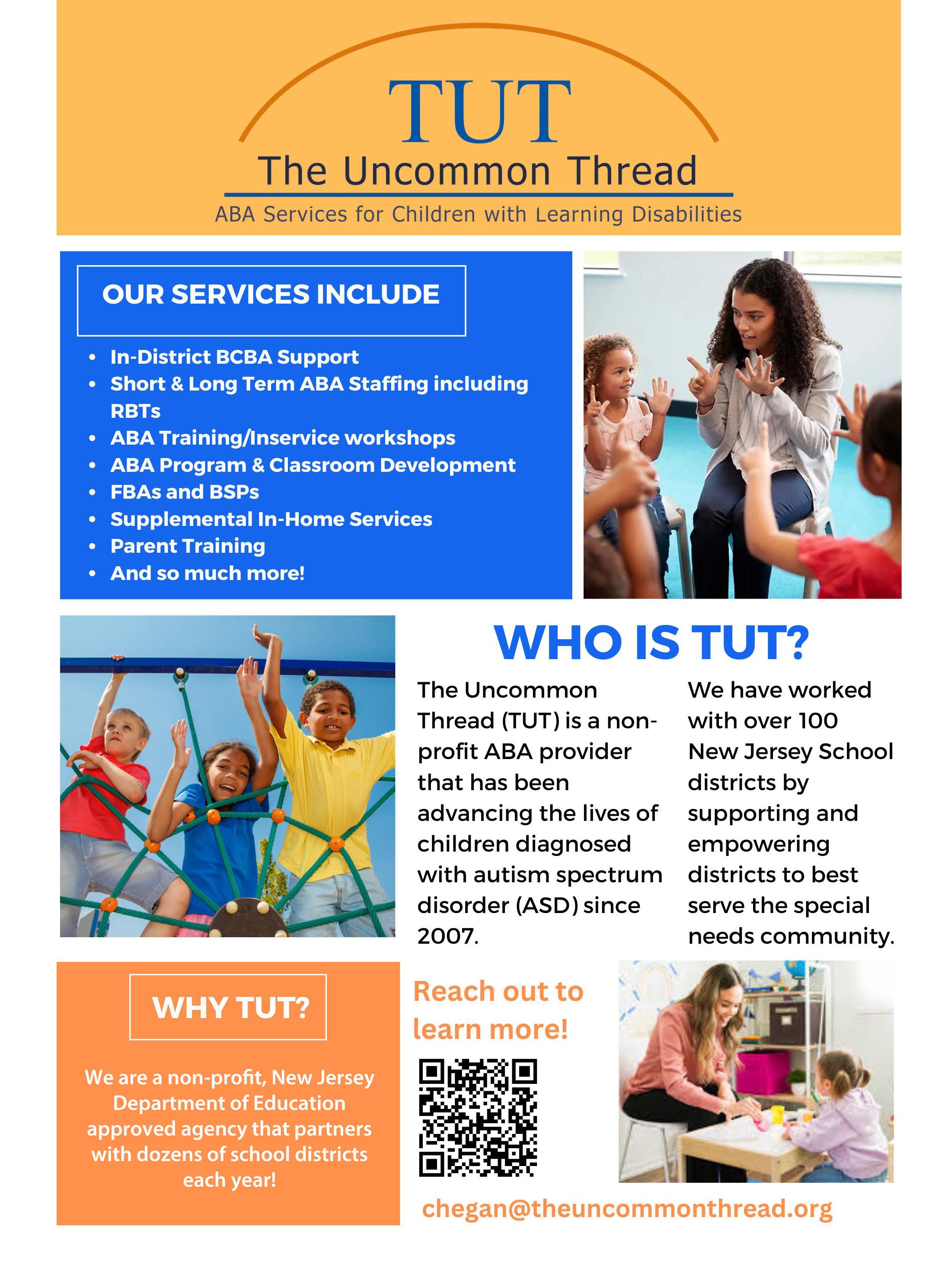

By RONNIE KOENIG
hen you have a child with autism or any other developmental disability, one of the biggest obstacles in connecting with them can be a lack of communication. If your child is non-verbal, only somewhat verbal or speaks but has trouble expressing themselves or being understood, the result can be frustration and the emergence of maladaptive behaviors that make life hard on everyone in the family.
It makes sense—if you can’t get what you want or need from a parent or teacher, crying, screaming or being aggressive will be the fallback. But thankfully, it doesn’t have to be this way.
“Parents can seek out professionals in the field of applied behavior analysis and speech-language pathology. While behavior analysts and speech-language pathologists may sometimes address communication skills differently, each field has something to offer to support a child’s communication needs,” says Joe Novak, Ed.D.,
director of clinical content for Autism New Jersey. “The effects of communication intervention are often enhanced when behavior analysts and speech-language pathologists collaborate and when skills are practiced across settings.”
There are several practices that can be effective for increasing communication skills in people with autism, Novak says. These include discrete trial teaching, naturalistic language strategies and functional communication training. In addition to these behavior analytic techniques, there is the field of augmentative and alternative communication (AAC).
Discrete trial teaching is teacher-led and highly structured, while naturalistic language strategies are more child-led and loosely structured. “These techniques are designed to teach a variety of skills, including how to ask for what you want and need, how to label things that you see, hear and feel, and how to respond to questions,” he says.
Functional communication training is designed to help replace challenging behavior with appropriate communication.
“Assessments are conducted to understand why the behavior is occurring, and replacement language is taught with the intention that it is used instead of the challenging behavior,” says Novak.
AAC includes a range of tools for communication, ranging from simple printed boards with pictures, to books with exchangeable pictures (the Picture Exchange Communication System, or PECS) to iPads or other touchscreen devices with specialized communication software such as Proloquo2Go. “These tools, when combined with appropriate instructional techniques, can enable effective communication for children who may have limited to no ability to speak or just generally struggle with their ability to express ideas,” he says. “Some students may also experience an increase in their ability to communicate using speech when being taught to use AAC tools.”
At Spectrum360, a New Jersey-based nonprofit organization focused on special education and development for individuals with autism and related disabilities, plans to increase communication might include individual or group sessions with a speech-language therapist, use of a communication system, a speech generating device, American Sign Language or other tools and methods. “It is all individualized to each person we serve,” says Dr. Danielle Taylor, chief operating o cer. “We believe that all people can communicate, and it is our job to demonstrate the many different ways of doing so and to assist them in developing a style that suits them best.”
Some of the options used at Spectrum360 include:
Spoken Language including Articulation and Speech
Production: “Our experienced speech-language therapists utilize many different intervention techniques when working with students to improve their spoken language abilities, including tactile programs such as PROMPT, shaping and modeling of sounds and vocalizations, and oral motor placement tools,” says Taylor.
Augmentative and Alternative Communication (AAC): “When a student’s vocal speech is not intelligible, implementing an AAC method is necessary to ensure that students can communicate effectively. AAC includes (but is not limited to) speech generating devices, PECS and American Sign Language.”
Pragmatics: “When a student needs to build their skills with
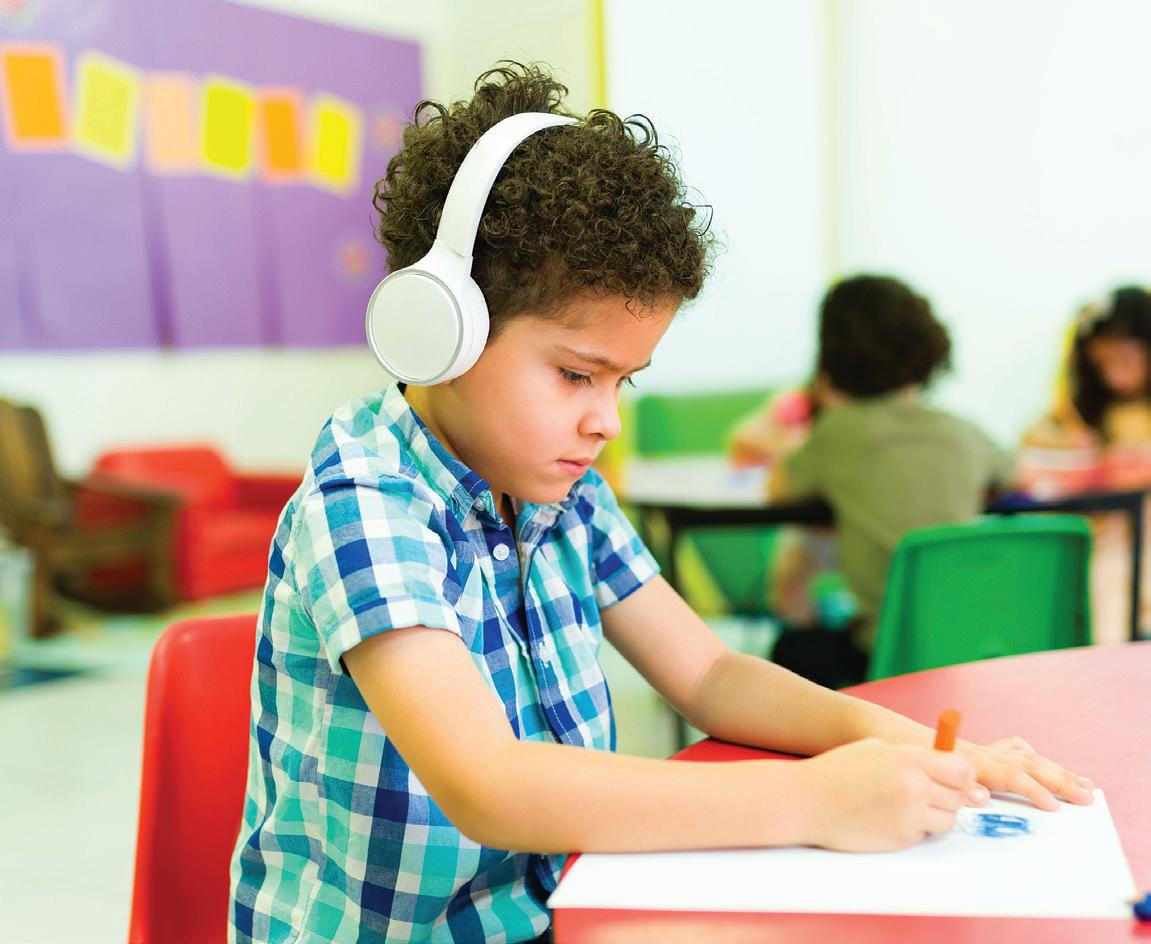
“JUST BECAUSE SOMEONE DOES NOT COMMUNICATE USING SPOKEN LANGUAGE DOES NOT MEAN THEY DON’T UNDERSTAND IT.”
communicating in social situations, we provide opportunities to observe others and practice that include video modeling, role playing and prompting.”
Taylor advises parents to notice which modes of communication are challenging for their child, and which ones they gravitate toward. “Start where you are by noticing what communication methods your child is drawn to—gesturing, speaking, drawing, writing— and encourage them to use these as much as possible in order to communicate what they need and want.”
Once a plan has been created that outlines the kinds of communication your child is working on, encourage them to use those methods and celebrate their successes. Also be sure to provide opportunities for practice at home and in the community.
The Lindamood-Bell Learning Process, which has more than 50 learning centers including a location in Morristown, builds the imagery-language foundation of learning to teach students of all ages to read and comprehend to their potential. For thirty years, their intensive, one-to-one instructional programs have helped to develop language processing to strengthen the sensory-cognitive functions needed for reading and comprehension.
“These sensory-cognitive functions include phonemic awareness for word attack, symbol imagery for word recognition and reading fluency, and concept imagery for comprehension,” says Megan Bowlin, M.A. Ed., center director, Lindamood-Bell Learning Process. “Our programs have also been successful in improving reading and comprehension for individuals with learning challenges including dyslexia, ADHD, and autism spectrum disorder.”
The organization’s Visualizing and Verbalizing program develops concept imagery—the ability to create an imagined or imaged gestalt from language—as a basis for comprehension and higher order thinking. The Talkies program (the primer to the Visualizing and Verbalizing program) is designed for students who need simpler, smaller steps of instruction to establish the imagerylanguage connection. The goal is to develop the dual coding of imagery and language as a base for language comprehension and expression. Talkies is especially helpful for students with a limited oral vocabulary and/or limited ability to verbalize and benefits students previously diagnosed with an autism spectrum disorder. Parents interested in learning more about these programs can call the Morristown Learning Center at 976-644-2202.
Whatever method you use, the most important thing is to keep the lines of communication open, Taylor says.
“Talk to your child as you would with their siblings,” she says. “Try to involve them in dinner conversations. Even if they do not actively participate, exposing them to the language is helpful. Our students hear and understand a lot more than we think so be mindful of what you say and discuss in front of them. For example, just because someone does not communicate using spoken language does not mean they don’t understand it.”
—Ronnie Koenig is a lifestyle writer who lives in Princeton with her husband and two kids.


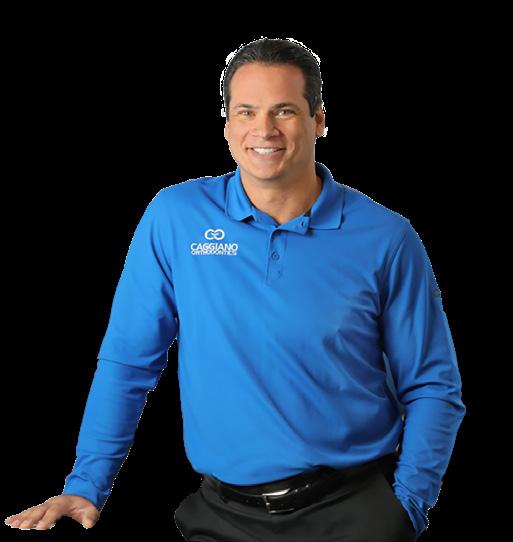



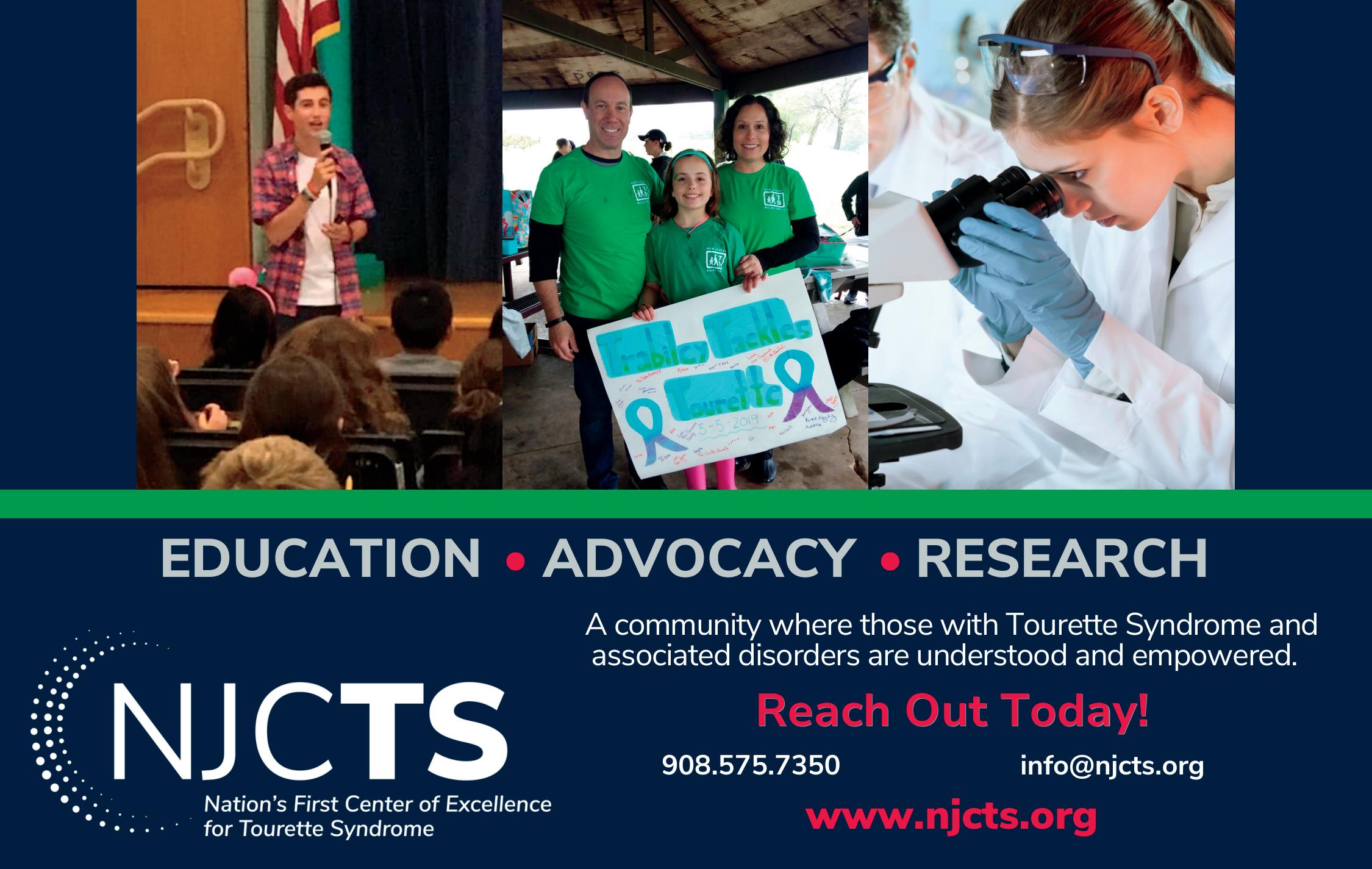









This story was written by Dina El Nabli, who leveraged ChatGPT to organize her ideas and get into the headspace of a teen on deadline.





Experts and educators share tips to help kids and teens use artificial intelligence tools responsibly

Chances are your teens may have used ChatGPT and other AI tools in some way when tackling homework, papers and projects. While these tools can be helpful for brainstorming, organization and more, they can also be a crutch kids use to cut corners or worse, do the work for them. Now more than ever, it’s important for parents to learn about AI and talk to their kids about using tools like ChatGPT (which has a free version) responsibly and ethically. But where do you begin? We asked educators and professionals who work with AI for tips to help guide the conversation with your kids. Here’s what they shared:
Kids need to understand that AI is a tool, not a substitute for doing their own research and writing. “AI can provide incredible support by offering different perspectives and quick access to information, but it doesn’t replace human intuition and creativity,” says Lauren Farrow, a former teacher and CEO of Teacher To Techie, which helps teachers leverage AI in the classroom.
Regina Clark, a journalism professor at Ramapo College in Mahwah and a Somerset mom of four teens, dedicated one of her spring semester class sessions to highlighting proper (idea generation) and improper (passing off AI-generated work as your own) use of AI tools. “AI can help clarify concepts and suggest new ways to approach problems, but the hard work and creative solutions should come from students,” Clark says.
Sure, AI is powerful, but it makes mistakes. “AI tools are only as good as the data they’re trained on. Sometimes, that data can be biased or outdated, leading to inaccuracies,” says Emily Levy, PhD, founder and director of EBL Coaching in Englewood and New York City, a specialized tutoring program that offers individualized instruction for students with special needs. Levy created Writing Mastery, a software program that uses AI to help students improve their writing skills by doing things like scoring and offering quick feedback. Levy says it’s vital to teach kids to verify AI-generated information by crossreferencing with reliable sources like textbooks, academic journals and reputable websites.
“Fact-checking isn’t just about correcting mistakes; it’s about understanding the information landscape,” Farrow says. “It helps students learn how to navigate and discern the quality of information they come across.” It can never be said enough: Make sure your kids double-check any AI-generated information they plan to use.
Using AI to cheat or do assignments is a growing concern in schools. “The temptation to let AI do the work can undermine a student’s learning journey,” Levy says. Talk to your kids about why it’s important to do their own work and how AI can complement, not replace, their efforts and original thoughts. Remind them that the consequences of turning in an AI-generated essay as their own are very serious and may result in a zero, having an incident of cheating documented at school or worse. These consequences can be even more severe in college. Teachers know when a student is getting so much

help that their authentic voice is lost in a piece of writing. On top of that, many teachers use software that can easily detect AI writing. Make sure your kids read and understand their teachers’ and school’s policies on AI use. It’s also a good idea to have your kids talk with their teachers about the appropriate use of AI and to be transparent with them when they use AI tools.
Teach your kids to think critically about the information AI provides, Levy says. “Encourage them to ask questions like, ‘Does this make sense?’ or ‘What other perspectives should I consider?’” Your kid’s mantra should always be: Don’t trust but verify. Show them examples where AI gets it wrong and discuss why it’s essential to question AI outputs, suggests Chris DelliSanti, NoteKnight.com creator, which uses AI to create study tools like flashcards. “A healthy amount of skepticism is going to be important in the future,” he says. Engaging critically with information is a skill Clark has been teaching for years. “By encouraging a mindset of healthy skepticism, we help children not only in their academic pursuits but also in their ability to navigate a world filled with information and misinformation,” Clark says. Finally, make sure your kids understand the limitations and potential biases of the AI tools they use, says Rayfil Wong, founder of aiwelearn.com, which offers AI education and tips.
AI’s role in schoolwork and other areas will continue to change and evolve so keep your conversations going. “Create an environment where your kids feel comfortable discussing AI and its applications,” Levy says. “Encourage them to share their experiences and challenges.” Remember there are many helpful and meaningful ways to use AI to help students learn, improve their writing and broaden their thinking. “The best use of AI is to destroy writer’s block,” Wong says, adding that using AI to outline ideas is an excellent way for kids and teens, especially procrastinators, to organize and kick start their work.
Beyond the classroom, talk to your kids about how AI is being used in the workplace and beyond. “Highlight the positive ways AI is being used to solve real-world problems,” Clark suggests. “This can inspire students to pursue careers that focus on using technology for good.” Talking to your kids about the ethical and responsible use of AI will help them navigate a future where technology plays a huge role in everyday life. Says Farrow: “Let’s prepare our children to be thoughtful and ethical digital citizens, ready for a world where AI is a part of everyday life.”

Are your kids glued to their phones? Here’s what you can do (and what you should know)
By JENNIFER SALVATO DOKTORSKI


THE CLICKS, THE LIKES, THE CONSTANT SCROLLING. “IT LITERALLY CHANGES YOUR RELATIONSHIP WITH SOCIETY, WITH EACH OTHER … IT PROBABLY INTERFERES WITH PRODUCTIVITY IN WEIRD WAYS. GOD ONLY KNOWS WHAT IT’S DOING TO OUR CHILDREN’S BRAINS.”
ighly addictive time-sucks. That’s what the social media apps populating our smartphones were designed to be from the outset, Napster co-creator and former Facebook president Sean Parker said in a 2017 interview with Axios news outlet. The clicks, the likes, the constant scrolling. “It literally changes your relationship with society, with each other,” Parker told the interviewer. “It probably interferes with productivity in weird ways. God only knows what it’s doing to our children’s brains.”
Guess what? We know.
“Ever hear of TikTok brain?” says Noreen Iqbal, LCSW, the owner and director of the Olive Branch Therapy Group, with locations in East Brunswick and Somerville. Our attention spans have decreased due to the effects these apps have on our brains and behaviors.
“We have overprotected our children in the real world and under-protected them online,” Jonathan Haidt, a social psychologist at the NYU Stern School of Business, told CBS News while promoting his latest book, The Anxious Generation: How the Great Rewiring of Childhood is Causing an Epidemic of Mental Illness. His research fi ndings are alarming.
In the past decade, as smartphone use has become more widespread, anxiety, depression, suicide, eating disorders, and other mental health-related issues have all increased exponentially among kids and teenagers, according to some of the statistics cited in Haidt’s book.
Aside from the health-related impact that smartphones have had on our children, there’s the effects these pocket-sized windows to the online world have had on education. Teachers complain that the distracting presence of smartphones in the classroom makes it harder to teach and more di cult for students to learn.
On June 18, the Los Angeles Unifi ed School District became the largest school district in the country to ban cell phones from its classrooms. Some New Jersey schools, like those in the Red Bank Regional High School District, have enacted similar bans. O cials at Stuart Country Day School of the Sacred Heart, an all-girls pre-K to grade 12 private school in Princeton, are about to begin their second year as a phone-free environment.

So now that the genie is out of the bottle and we know what smartphones are potentially doing to our kids’ brains and social development, the question is, “What should parents do about it?”
Iqbal says it’s up to parents, not a classroom full of fi fth graders, to decide when and if your child is ready for a smartphone. “Know the kid you’re raising, not the kid you want to raise,” she says. Often that means being connected to your child and having open, honest and ongoing conversations about cell phone use and what will be expected of your children. She suggests talking to them about the permanence of a digital footprint, bullying and being bullied, forwarding photos received from someone else, and general cell phone etiquette. She suggests telling them, “If you wouldn’t say that to someone in person, or you wouldn’t be comfortable having your parents see it, then don’t post it and don’t send it.”
Once parents have talked with their kids about expectations and limits regarding cell phone use, Iqbal suggests putting it
in writing. Before signing a contract with a cell phone carrier, sign one with your child. “There are many examples online,” Iqbal says. A quick Google search will produce a variety of samples and templates that address such topics as when and where cell phones can be used, with whom children are allowed to communicate, when it’s time to put away or turn off cell phones, and where phones can be charged.
“If we want to get kids out of the virtual world, we have to give them back the real one,” says Lenore Skenazy, president of Let Grow and founder of the Free-Range Kids Movement. “The real world is pretty engaging ... three more senses are involved.” Preceding the introduction of the smartphone was a fear-driven, hands-on style of parenting that made it more di cult for children to do things without constant adult supervision, like playing at the park or running errands, she says.
Iqbal agrees that overparenting coupled with smartphone use has contributed to social anxiety in children and teens because they lack the necessary skills to build in-person relationships.
Skenazy says kids become less anxious when they learn
ADULTS CAN BE JUST AS ADDICTED TO SOCIAL MEDIA AND THEIR PHONES AS THEIR CHILDREN. “IF YOU’RE CONSTANTLY POSTING AND ALWAYS ON YOUR PHONE AND NOT LIVING OUTSIDE OF THE PHONE WORLD, THEN CHILDREN SEE THAT.”
to problem-solve and make decisions in the real world without the help of a parent or adult. Let Grow, the nonprofit fostering childhood independence, offers two free programs for schools. The Let Grow Experience promotes “homework” in the form of having students do something on their own, with their parent or guardian’s permission, but without any help. It can be something as simple as baking and delivering cookies to a neighbor down the street, taking a city bus alone, or walking to a dance lesson or karate class by themselves. The Let Grow Play & Social Club, meanwhile, encourages schools to stay open before or after school to provide a place for kids to gather and play without cell phones and without adults organizing their interactions. The Let Grow website (letgrow.org) offers free information for parents to incorporate these same ideas at home without school involvement.
Flip phones and cell phones like Light Phone, which have limited features and no internet access, might be a better choice for younger children. “It teaches them to step up,” Iqbal says. Children can still communicate with parents and friends but won’t have access to downloadable content and apps that they may not be old enough to view. If parents do decide to purchase smartphones for their kids, Iqbal says they might consider software like BARK that can limit screen time, block inappropriate content, report searches in real-time, and monitor text messages. Parents should be continually educating themselves about all the available tools out there, she says.
But what about complaints that your child will feel isolated or different if they don’t have the most up-to-date smartphone by the time they’re 12? Iqbal says parents can join initiatives like Wait Until 8th (waituntil8th.org), an organization aimed at delaying smartphone use until after the end of the 8th grade. They can also fi nd like-minded parents either in their towns or online with similar ideas about cell phone usage for their children. “If you don’t think your kid can handle it. Just wait,” she says.
Another option might be to seek out schools with a phonefree culture, like Stuart Country Day School of the Sacred Heart. Marissa Muoio, Ed.D., Head of the Upper School, and Julia Wall, Head of School, say that as educators, they had been tracking and responding to the ongoing global mental
health crisis, which has had a particular impact on teen girls. In the summer of 2023, they made the decision to have their Upper School (grades 9-12) join their Middle School (grades 5-8) as a phone-free environment and have students in those grades keep their cell phones in their lockers during the school day. The impact has been both profound and positive.
When walking through the school’s lounge spaces and lunchroom, Muoio and Wall notice both are louder and more joyful. “Kids are actually conversing, not just swapping TikTok videos. They asked for board games and cards as tools for connection, and more students are now choosing to go outside during their free time,” Muoio says. “We deliberately did not use the word ‘ban’ when referring to our decision,” Wall adds. “Instead, we spent ample time with the word ‘freedom’ as a way to explain our goals to students and parents. Being a phone-free school means our students have the time and space for collaboration, creativity and sustained thinking.”
Adults can be just as addicted to social media and their phones as their children. “If you’re constantly posting and always on your phone and not living outside of the phone world, then children see that,” Iqbal says. If parents normalize living a life without social media, then their children will do the same.
Lack of sleep is another cause of anxiety in children and teens—and you—and because of that Iqbal suggests using charging stations placed outside of everyone’s bedrooms.
As cell phone and social media use increase, so too have things like anxiety and depression. Don’t wait until you need a therapist for your child to fi nd a therapist for your child. Having another trusted adult to talk to can help children and teens navigate the highs and lows of childhood and adolescence and give them someone familiar to turn to when they are in crisis or need to work through a problem. When you introduce your children to therapy at a young age, it makes them more comfortable reaching out to a support system outside of their home, Iqbal says.
—Jennifer Salvato Doktorski received a 2024 Fellowship from the New Jersey State Council on the Arts. A proud mom and Jersey Girl, she’s the author of five young adult novels and lives with her family in Central NJ. Learn more at jendoktorski.com.
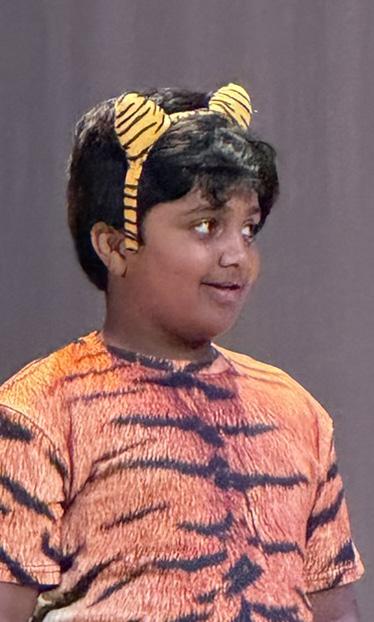
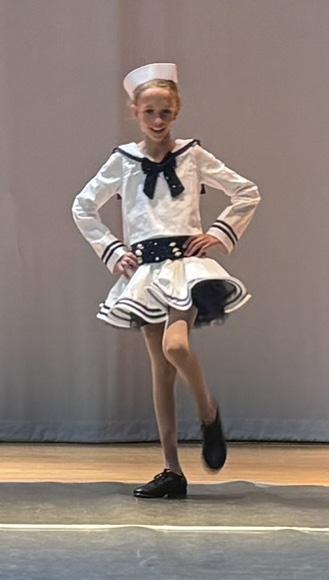

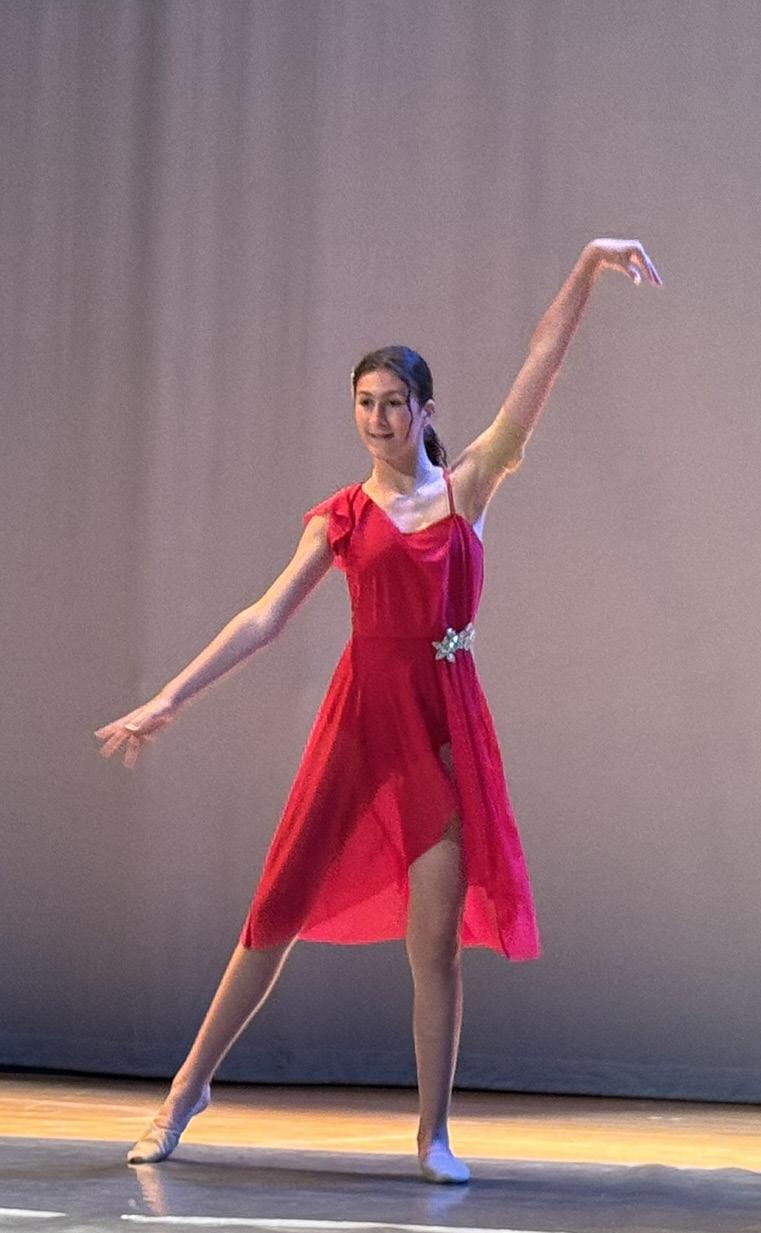
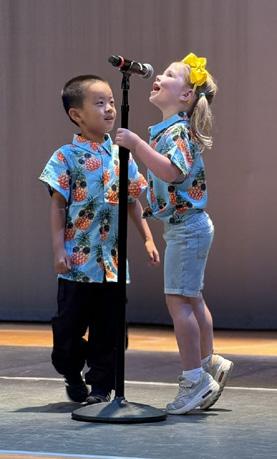
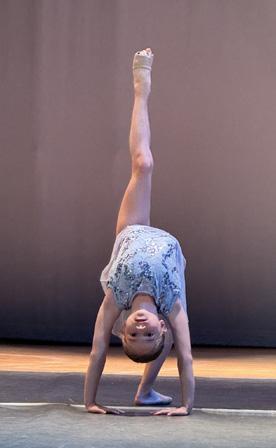






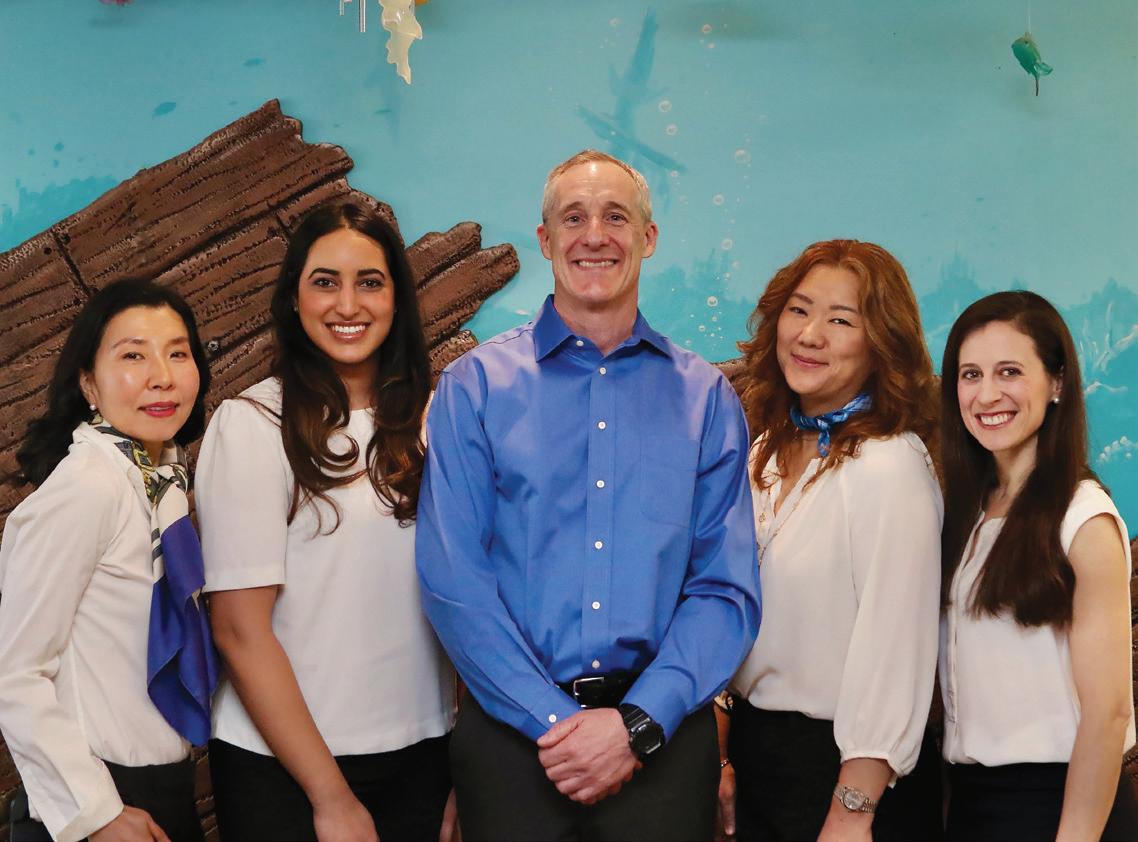
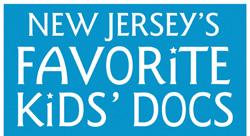


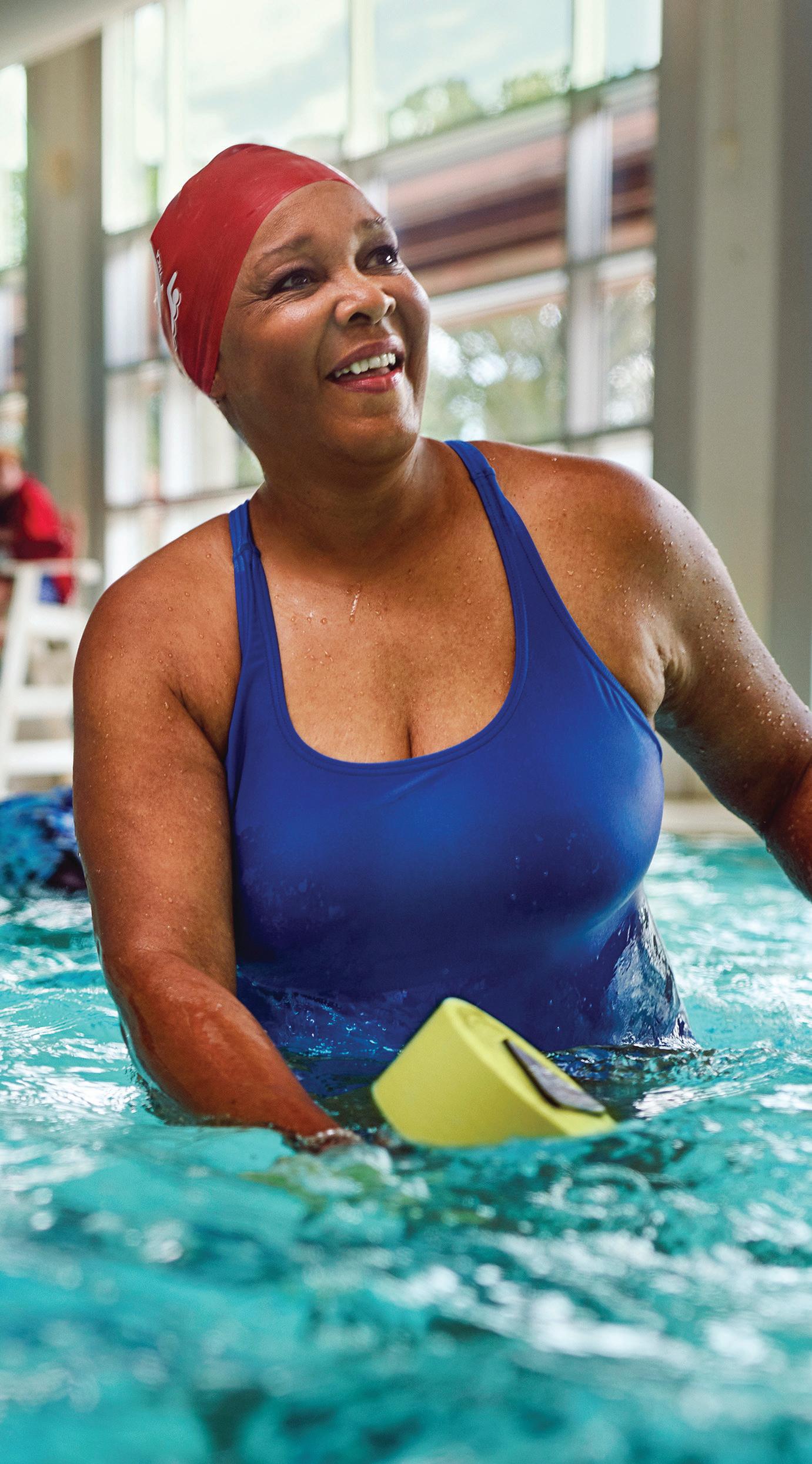

Within a culture of support and collaboration, Morristown Beard School (MBS) students discover and develop their individual pathways to academic success and personal fulfillment while becoming enlightened, morally responsible citizens of the world. A private, independent and coeducational day school for Middle School (grades 6-8) and Upper School (grades 9-12), MBS’s small class sizes and dynamic curriculum allow students to engage in deep learning and unlock their passions.
“Parents and students alike appreciate Morristown Beard’s student-centered approach, where students are seen, heard and known,” says Director of Enrollment Management Rob Mitchell.
MBS offers more than 20 athletic programs and 40 student-led clubs and community service opportunities, from student government, newspaper, Model UN and yearbook to drone club, coding, business finance and investing and architecture and engineering. An independent study program encourages students to explore areas of interest that fall outside the traditional course catalog. But while academic success and intellectual growth are embraced at MBS, it’s never at the exclusion of social and emotional growth. Class schedules are designed so students can balance academics with athletics, the arts and extra- and cocurricular activities.
“MBS is a supportive and collaborative community where students are empowered to have agency over an academic journey that challenges, inspires and fulfills them,” says Head of School Liz Morrison. “We help students maintain a balanced approach to rigorous academics and enriching extracurricular activities.”
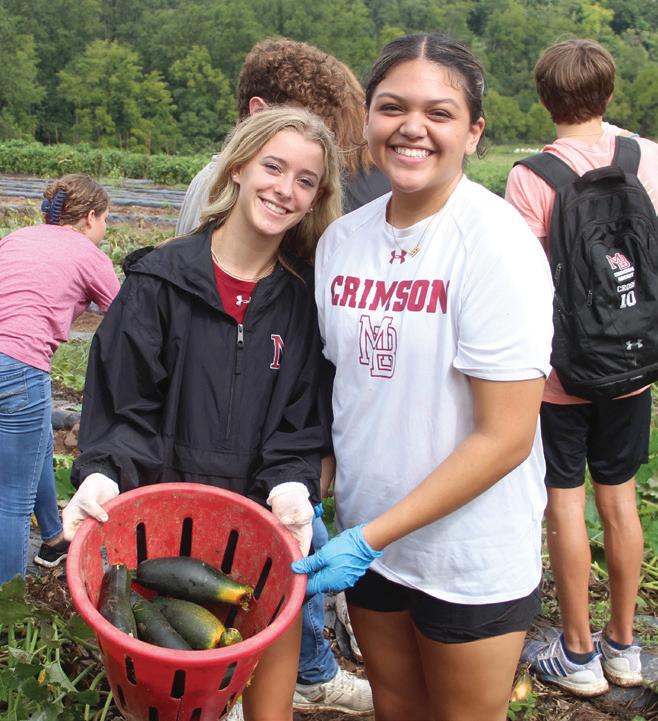
MBS is a place for experiential, handson learning, with signature academic programs that include Learning Outside the Classroom Walls and Social Emotional Competencies in Middle School. In the Interdisciplinary Concentrations Program (ICP) in the Upper School, students apply for one of four concentration pathways at the end of their freshman year: Arts and Innovation; Global Citizenship; Ethics, Leadership, Justice; or Data Analysis and Research Methods.
“Experiential learning is central to the educational experience at MBS, as we aspire to help students make connections between their classes and the world beyond school,” Mitchell says.
Morristown Beard School’s 22-acre campus provides state-of-the-art spaces to facilitate its commitment to innovative teaching and learning, highlighted by the 8,000-square-foot Center for Innovation & Design (CID), 25,000-square-foot Math & Science Center and Science on a Sphere®, a six-foot diameter sphere that uses computers and video projectors to display planetary data.
“The CID is the heart of our innovation
culture, offering cutting-edge technology and dedicated studio spaces where students can immerse themselves in the design process and hone essential skills in critical reasoning, teamwork and problem-solving,” Mitchell says. “From app development to 3D printing, the CID empowers our students to explore emerging fields and make a positive impact in their community.”
MBS believes that a successful rigorous academic program also includes a commitment to academic support for all students. The school’s state-of-theart Centers for Learning provide an unparalleled network of academic support services for students. “Our Centers for Learning also provide students with nextlevel experiences that foster creativity, innovation and collaboration,” he says.
MBS prides itself on fostering a sense of leadership and volunteerism both at school and within the community at large. To assist students on their journey toward becoming responsible and active global citizens, the school requires community service of all students in grades 9-12.
Along with achieving personal satisfaction and growing self-confidence, students enrich their communities and take on leadership roles to transform the lives of those around them. The school supports organizations such as Habitat for Humanity and hosts an annual blood drive, while international service trips include locations such as Peru, Costa Rica and Thailand.
“MBS continues to be a leader in student engagement and empowerment, and community service is embedded in our program,” Mitchell says. “From local to international outlets, MBS students and faculty contribute their time and talent to support the needs of the communities we serve.”

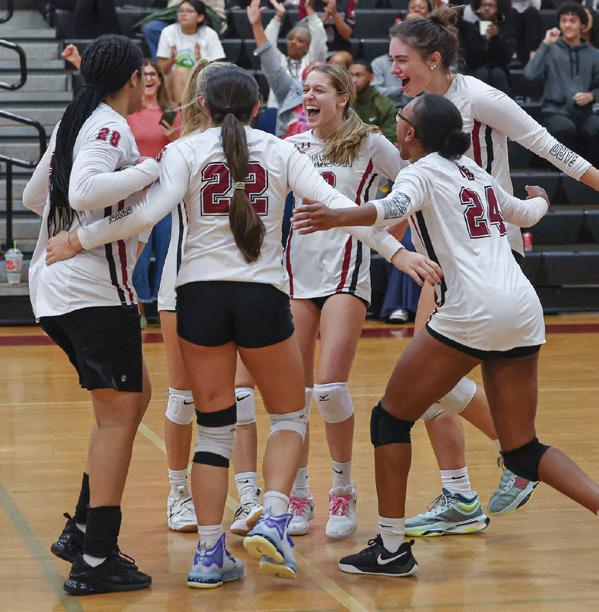

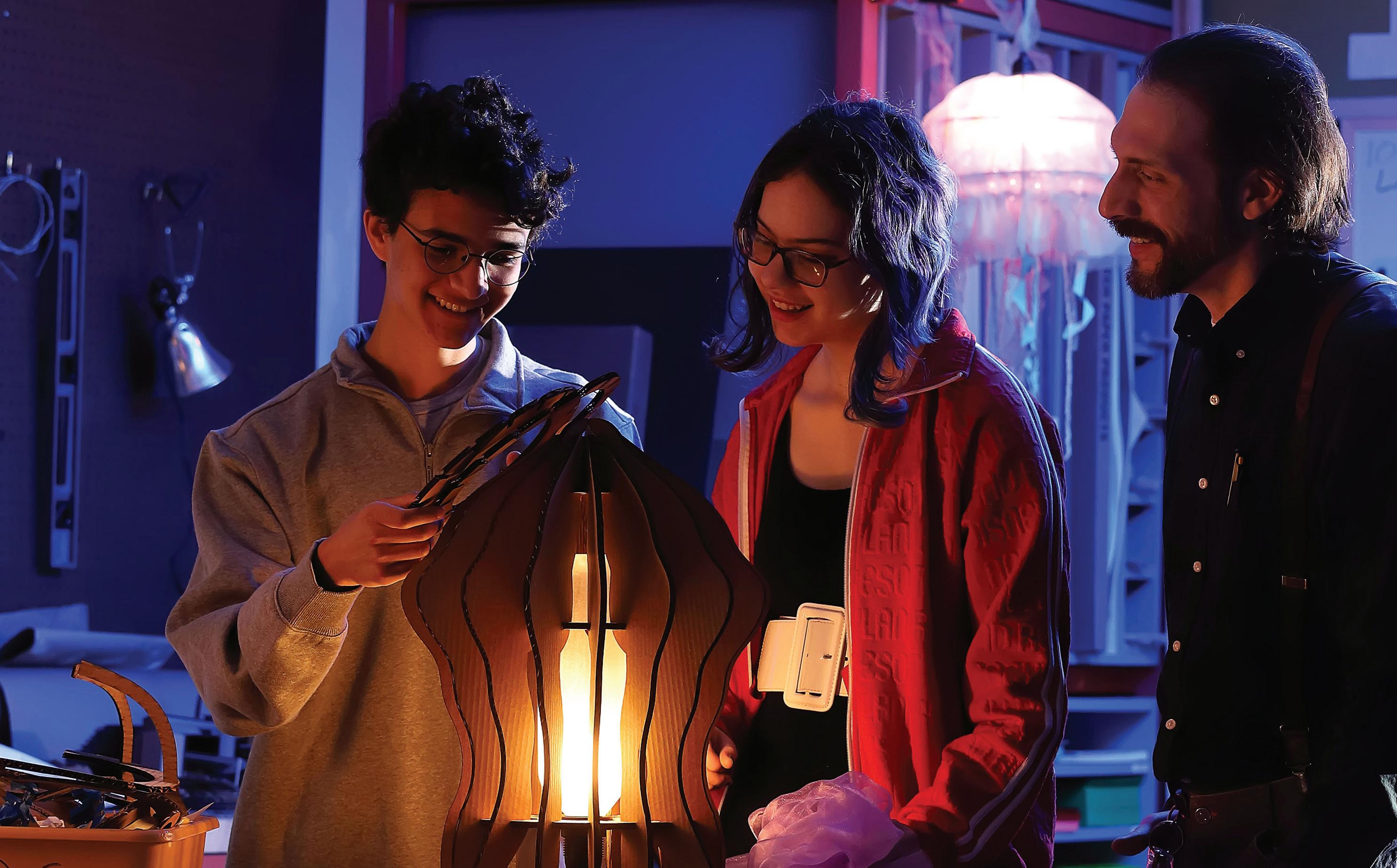


s the oldest all-girls Catholic high school in New Jersey, the Academy of Saint Elizabeth (AOSE) is an independent college preparatory school focused on promoting academic excellence and moral responsibility within young women. Founded by the Sisters of Charity of Saint Elizabeth in 1860 as Saint Elizabeth’s Academy (SEA), the school will be celebrating its 165th anniversary of sustaining a scholarly environment and a nurturing community of faith where all girls are welcome.
The Academy has continued to uphold its mission to develop students’ minds in wisdom, hearts in service and lives in faith. Students embrace prayer every morning, celebrate Mass together several times each month and participate in service-oriented projects throughout the year.
“Our goal is not only to instill great moral character, but we also want our girls to learn how to express gratitude and give back to the community through the development of their faith,” says Dr. Beth Azar, principal.
With students from 72 towns throughout Morris and Essex counties, AOSE boasts a rigorous curriculum and extensive course catalogue, including 17 AP courses and several University Now courses offered through Saint Elizabeth University. Small class sizes ensure students form close relationships with one another, develop their individual interests and receive personalized instruction from teachers.
“Our girls call themselves ‘SEAsters’ because they will forever feel connected to each other through the sisterhood that
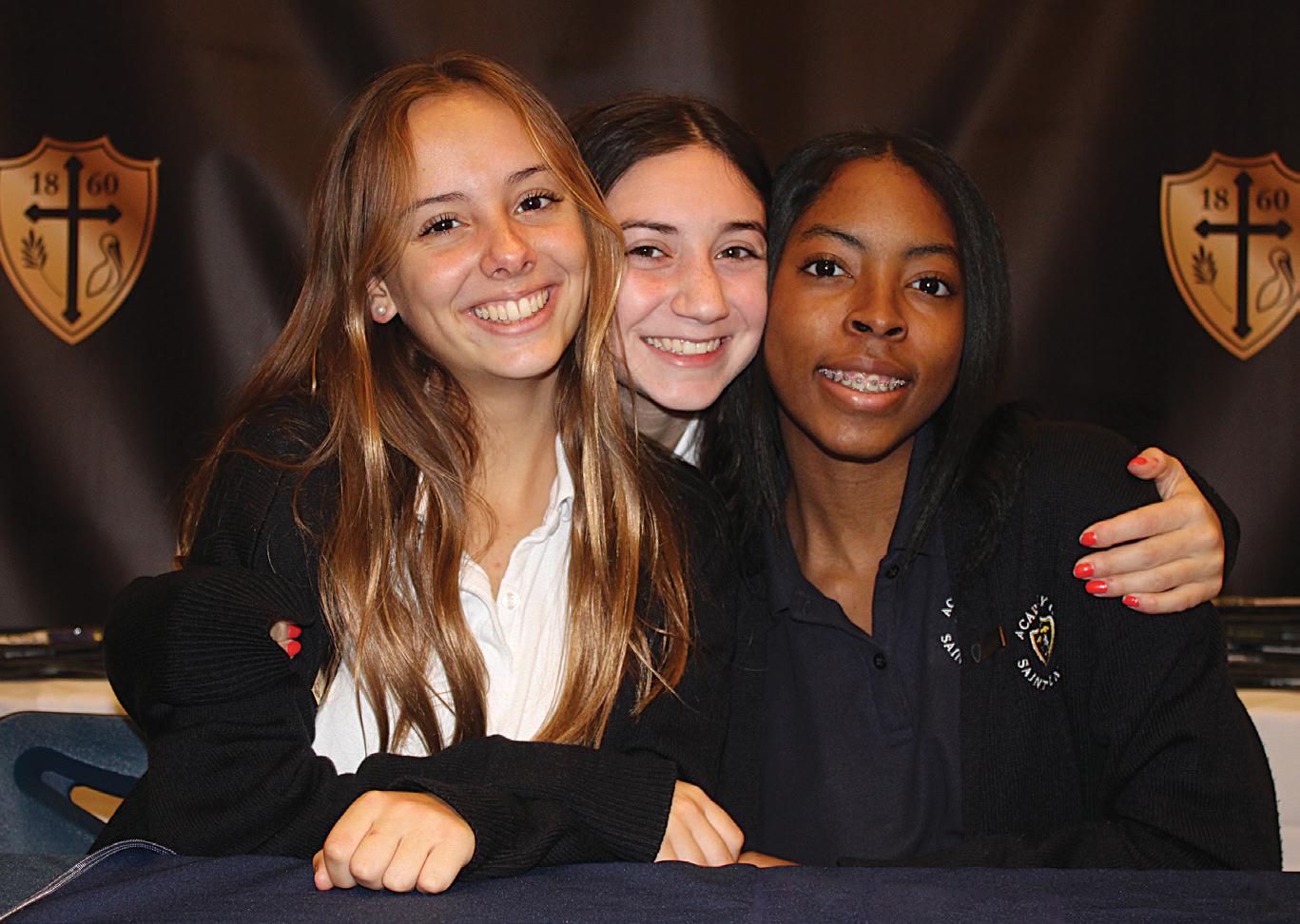

was developed during their time here,” Azar says.
AOSE also offers 12 varsity-level sports, more than 50 student-led clubs, and a robust dance and performing arts program, which includes fall and spring musicals. The school shares athletic fields with the surrounding colleges of Fairleigh Dickinson University and Saint Elizabeth University, providing student-athletes
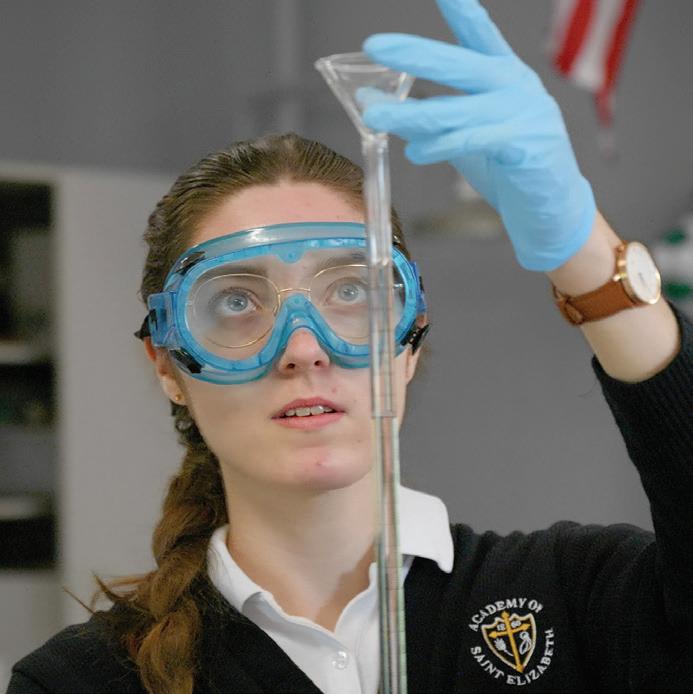
with access to NCAA facilities.
To enhance students’ future success, AOSE has added an on-staff career/college counselor whose focus is to help students prepare for life beyond the academy.
“We seek to support and encourage our girls as they enter the next chapter of their lives, but so many of our former students have told us that AOSE will always feel like home,” she says.
700 SHUNPIKE RD., CHATHAM • 973-410-0400 • CHATHAMDAYSCHOOL.ORG
hatham Day School (CDS)
offers an ambitious program that promotes intellectual achievement and emotional growth in a diverse and nurturing environment, where students learn in small classes and can take advantage of its sprawling 15-acre campus. The school celebrates and values each child as a unique learner with extraordinary potential.
CDS is committed to keeping class sizes small, with a maximum of 14 students per class, to allow teachers to provide differentiated teaching strategies and personalized attention. “We will never sacrifice on the size of our classes,” says Head of School David Buffum. “We feel very strongly about holding to that philosophy of small classes, because that really is the most important part of our mission.”
The school offers an array of extracurricular activities, including theater, basketball, soccer, cross-country, fencing, chess and robotics competition teams.
At CDS, every student is known, valued and celebrated, and the school is dedicated to fostering interests and encouraging meaningful relationships. “Parents appreciate the frequent communication from teachers and the personalized approach from the ‘institution’—we always put that in quotes because we prefer to handle most issues relationally and not institutionally,” Buffum says.
CELEBRATING AND REWARDING BRAVERY
As students push themselves outside of their comfort zones and into the spotlight, from classroom presentations to participation in the spring musical, teachers and fellow students reward this bravery. In turn, students reach higher and further than
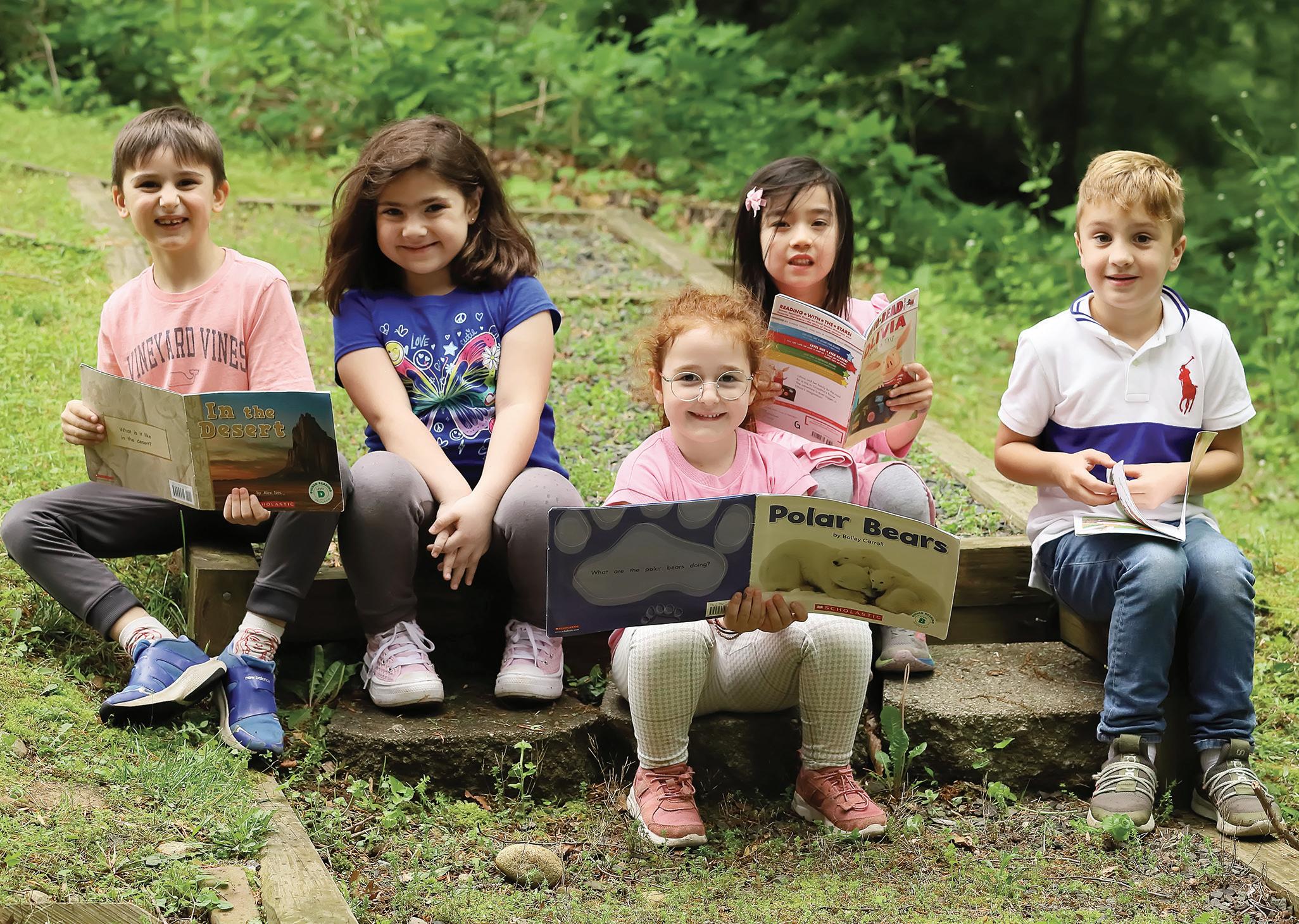
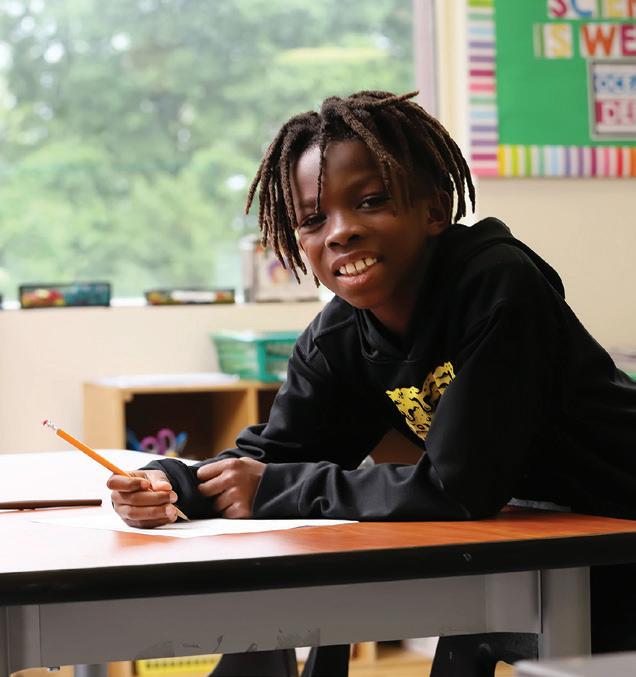
they ever thought possible.
“We are proud of our teachers for being such good communicators, and proud of our students for rewarding bravery in one another,” Buffum says.
At CDS, teachers encourage selfadvocacy and leadership from even the youngest grades, whether it’s an eighth-grader assisting a kindergartner in reading a new book, or a pair of third-
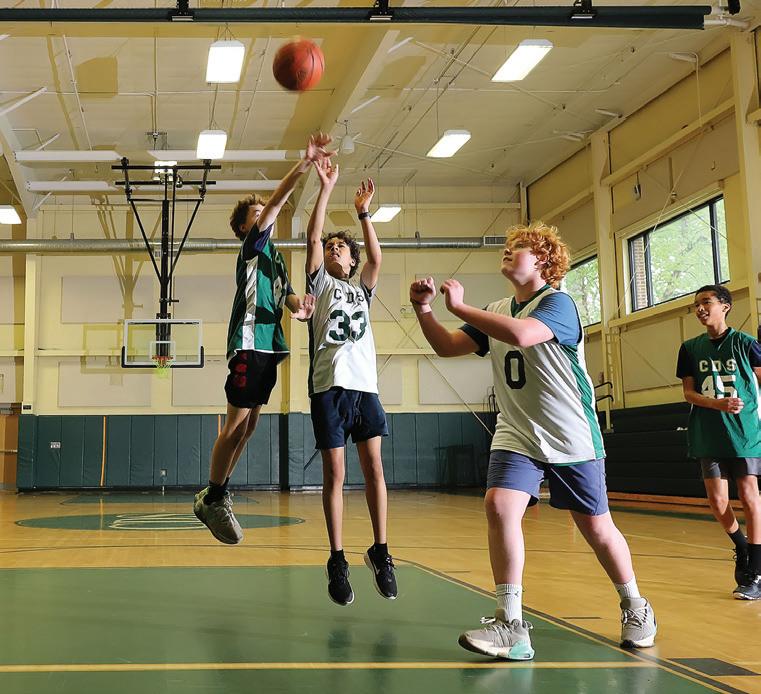
graders assisting younger students with a science experiment.
“Teachers are ubiquitous in all areas, and our administrators know each student and family member by name,” Buffum says. “We have school events like everyone else, but it is in the aggregate of interactions that a community is truly made. When you attend CDS, you become part of our extended family.”
At Christian Brothers Academy (CBA), high school students are taught to be men of high moral character, foster a strong sense of brotherhood among classmates and achieve their highest potential.
“The word most commonly associated with CBA is ‘brotherhood’—and it’s not just a buzzword,” says Director of Enrollment Jennifer Maccarella. “Our upperclassmen see it as their duty to fold our new students into the fabric of CBA.”
A two-time National Blue Ribbon School of Excellence, CBA’s educational model is known for its focused dedication to service and faith. Based on the teachings of St. John Baptist De La Salle, the founder of the Brothers of the Christian Schools, CBA has offered students a complete, holistic experience both in and out of the classroom since 1959.
“Teachers become mentors who help students identify and develop their unique gifts and talents. No child is simply the student who sits in desk three, row four, with a current 85.5 GPA, but rather a child entrusted to the care of the educator— deserving of mentorship and support in mind, body and spirit,” says Director of Mission Integration Matthew Meehan.
CBA students are involved in awardwinning theater and music programs, 18 interscholastic varsity sports and nearly 50 extracurricular activities, ranging from Model UN and math team to ping pong and art club.
“The fact that students at CBA are learning at a high level while at the same time developing as grounded, well-rounded men of character helps to define what makes CBA unique,” Maccarella says. “Our graduates have
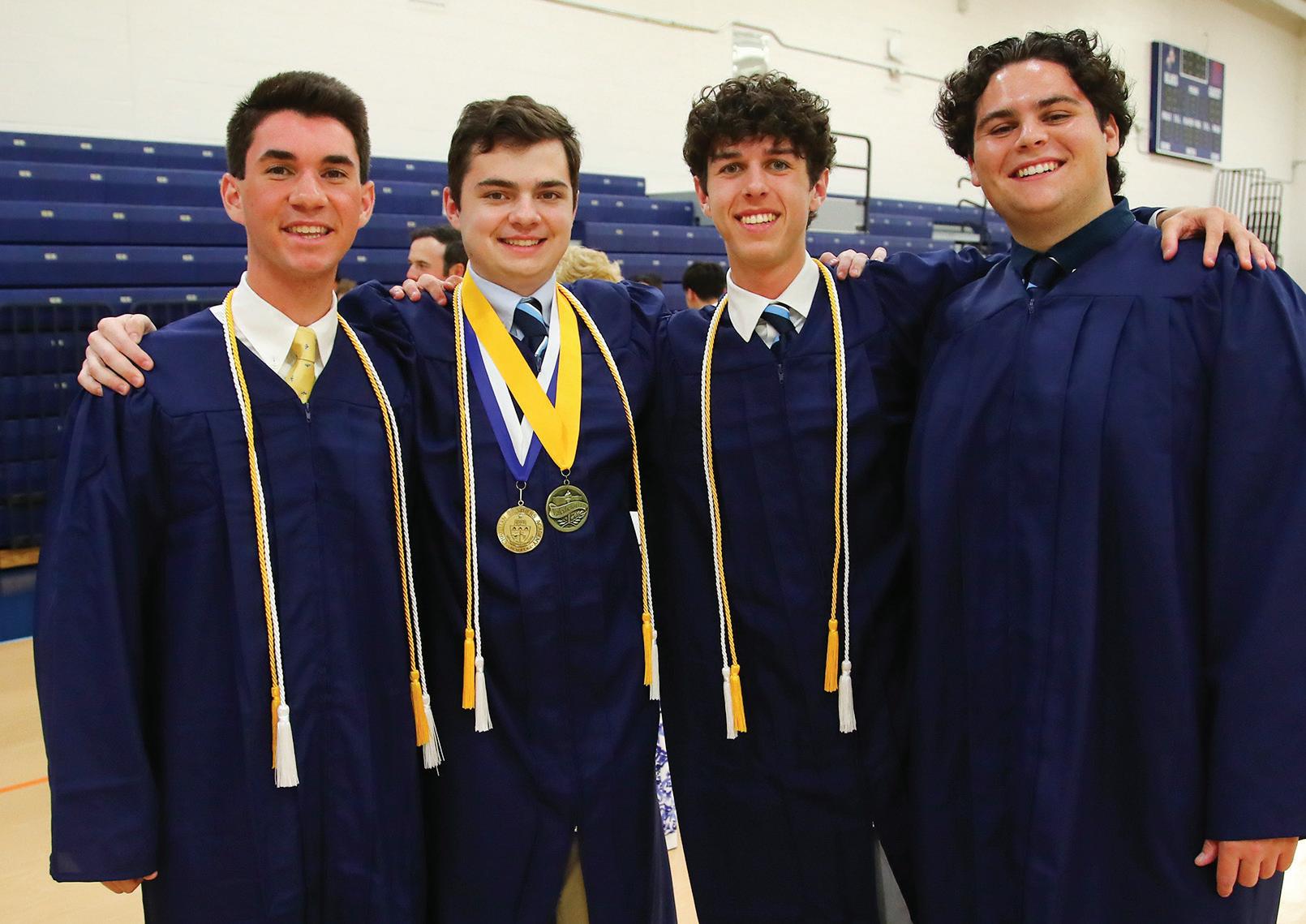

achieved in the classroom, on the fields, on the stage and in their communities— and that translates to excellent college opportunities.”
The school has daily theology classes and school-wide masses, class-level retreats and clubs devoted to community outreach, such as its Lasallian Youth service organization that makes frequent trips to less fortunate areas of New Jersey.
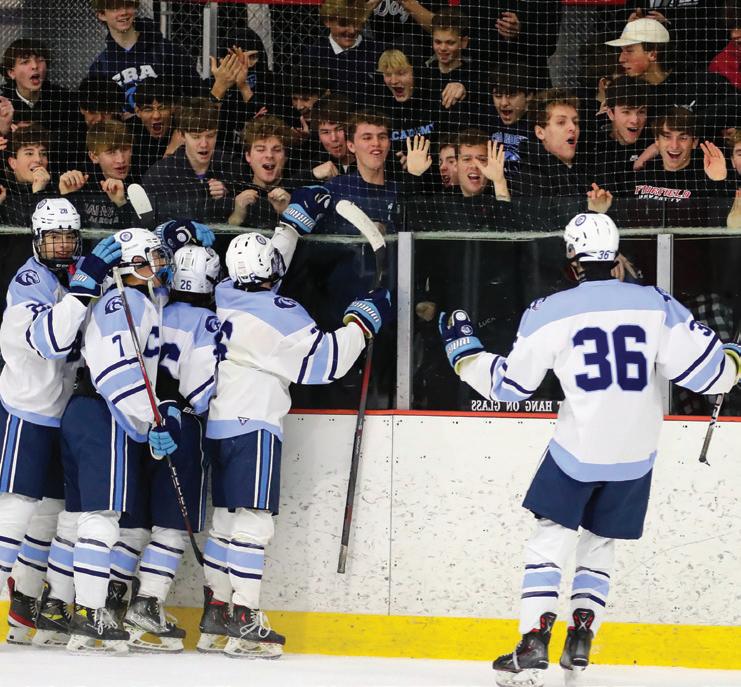
“I’m inspired by our students’ dedication and commitment to impactful community service experiences, both locally and across the country,” says Principal Neil Begley, Class of 1996. “All of these components speak to the holistic approach of CBA’s Lasallian educational model, where our mission is to develop young men of faith, character and action.”
15 TOWER HILL RD., MOUNTAIN LAKES • 24 CHANGEBRIDGE RD., MONTVILLE • 973-334-1234 •
n independent school specializing in working with students with learning disabilities in grades 2-12, The Craig School has small class sizes and uses proven research-based learning strategies, including structured language, multi-sensory instruction and a wholechild approach.
“We allow students to build their academic foundations, increase their ability to be active and independent learners and develop a sense of who they are as individuals and students,” says Susan Schmitt, head of school.
The Craig School focuses on providing individualized education plans (IEPs) for each student. The school provides transition support for students as they progress through each grade level or move on to post-secondary education.
“The magic of The Craig School is that students are known for their strengths since they all face similar challenges,” Schmitt says. “These challenges may have set them apart in their previous schools, but here at Craig, we celebrate achievements and strengths to create confidence in each student.”
The Craig School is known for its specialized instruction tailored to meet the unique needs of students with learning disabilities. The independent school prioritizes individualized attention and creates enriched learning environments that ignite passion and curiosity among students.
The Craig School employs teachers trained in specific learning strategies and techniques, such as Orton Gillingham, that can effectively support students with diverse learning profiles and allow teachers the ability to customize and individualize each
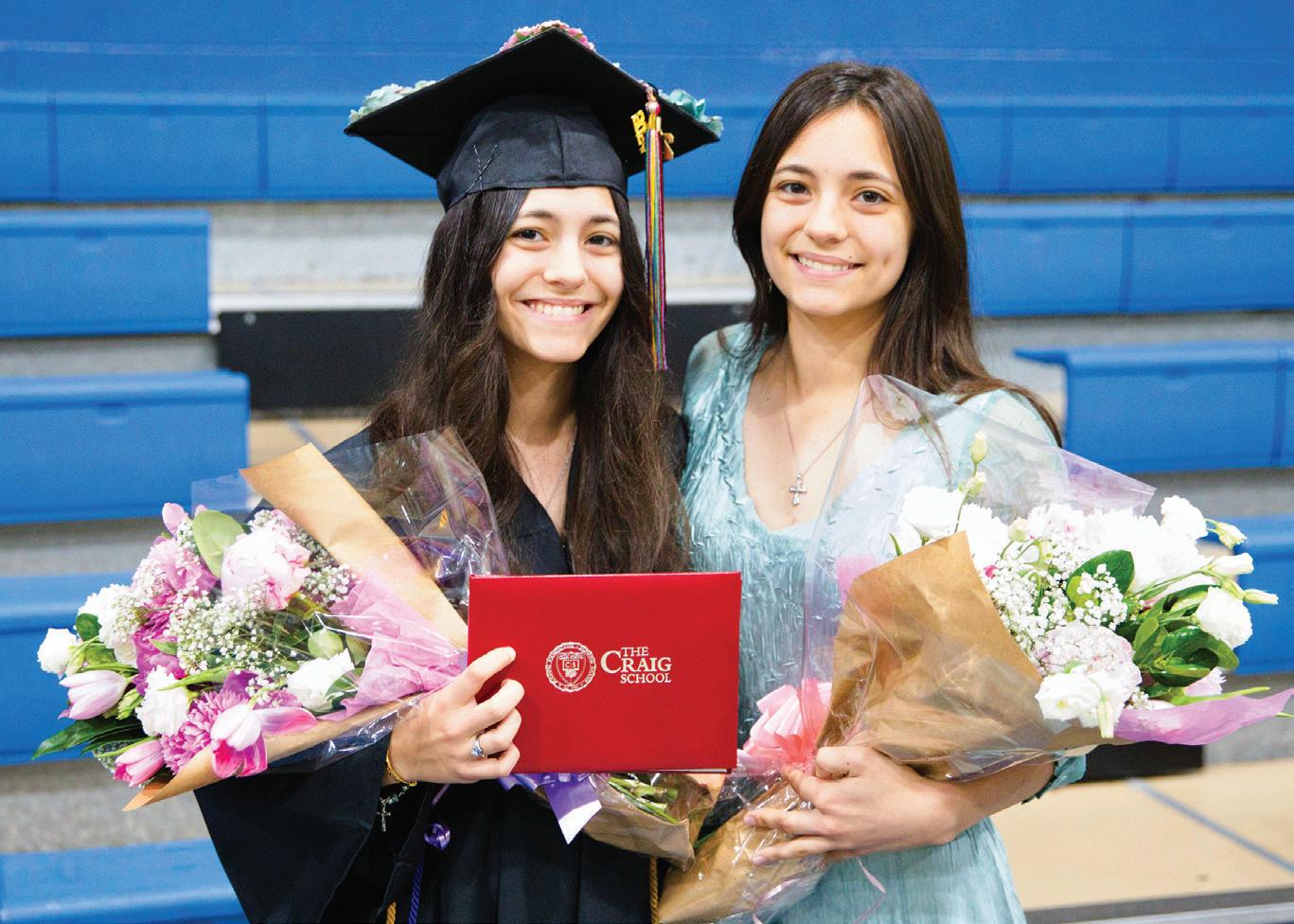
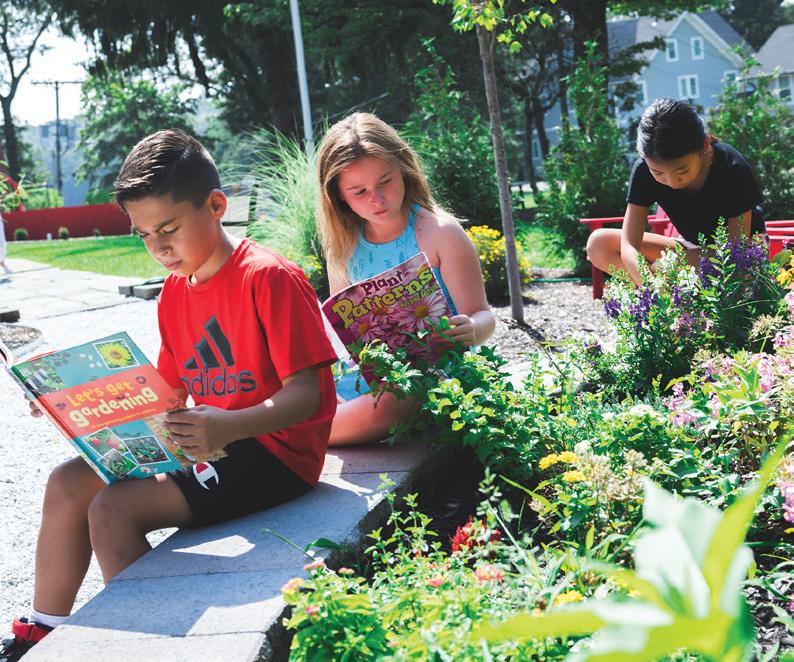
student’s educational program.
The school also provides a multisensory teaching approach to enhance learning and retention and uses technology such as text-to-speech software, speech recognition tools and specialized apps. Support services, including occupational therapy, speech and counseling are also integrated directly into each student’s academic schedule.

“The Craig School strives to create a nurturing and supportive environment for students,” Schmitt says. “The staff is trained to understand the socialemotional aspects of learning disabilities and provides emotional support to help students build self-esteem, develop resilience and foster positive relationships.”
Visit craigschool.org to learn more and schedule your tour.
435 LYDECKER ST., ENGLEWOOD • 201-568-5566 • ELISABETHMORROW.ORG
The Elisabeth Morrow School provides exemplary academics and character development in a diverse and inclusive child-centered community, inspiring students to become curious scholars, ethical leaders and global citizens.
Educators personalize learning based on each child’s readiness, learning profile and interests to cultivate their unique spark and innate creativity.
Elisabeth Morrow’s child-centered and innovative academic programs take place on a beautiful 14-acre campus with immersive learning spaces, including state-of-the-art technology labs, maker spaces, science labs and libraries, nature trails, a brook and pond, outdoor classroom patios, educational gardens, playgrounds, gymnasiums and an athletic field.
“We guide our students through an engaging project-based, inquiry-driven and age-appropriate curriculum that offers children the opportunity to take on real-world challenges and grow as learners and leaders,” says Head of School Marek Beck, Ph.D. “Through initiatives in STEAM, humanities, socialemotional learning and music studies, we channel their curiosity and support them to surpass what they thought possible.”
This will be the school’s third academic year as a globally recognized Apple Distinguished School. This honor not only exemplifies the school’s strength of innovation in teaching and learning but also provides access to a powerful network through which students and faculty partner with the most innovative schools around the world. It is worth noting that EMS remains the only independent school in New Jersey to hold this honor.
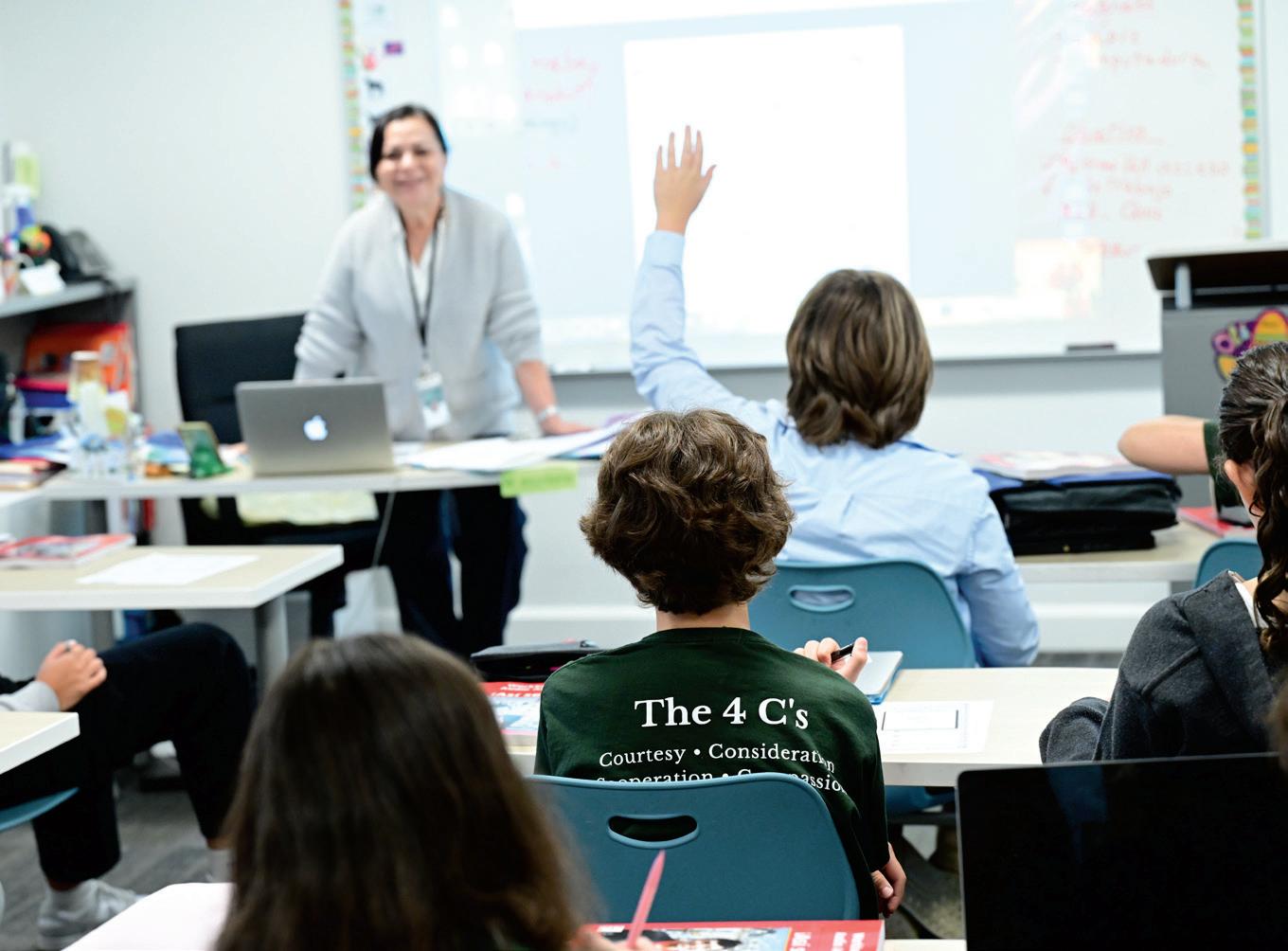

Perhaps most importantly, the school is known for its warm, nurturing and highly diverse community. “Without this, we wouldn’t have the proper foundation for the transformative education our students receive,” Beck says. He noted that the school’s diverse and international population allows it to authentically adopt a global perspective, with students and families enjoying
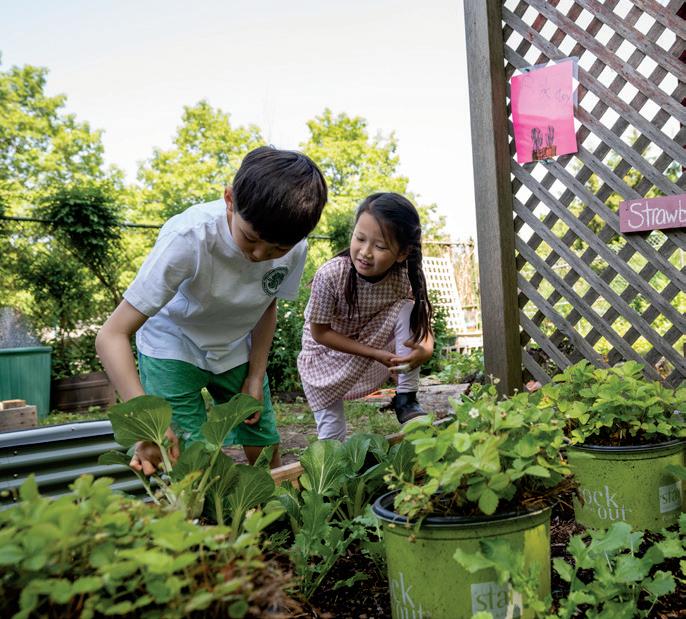
opportunities to share their culture and celebrations and to learn about those of others.
“Our parents count on us to reinforce the values they teach their children at home and trust us to help their children develop holistically—socially, emotionally and cognitively,” he says. “And our students graduate prepared to lead the way with empathy and innovative thinking in a rapidly-changing world.”
52 GREAT HILLS RD., SHORT HILLS • 973-379-3442 • FARBROOK.ORG
stablished in 1948, Far Brook School is known for its progressive educational approach, arts integration, commitment to social justice and child-centered, supportive environment for students from preschool (age 3) through eighth grade.
Far Brook believes in equity and justice, and is committed to maintaining a diverse school community that reflects the world around us. The arts-infused curriculum and experiential, theme-based learning produce an impressive track record among graduates. Nature is woven into daily life as students explore the verdant 9.5-acre campus, engaging in the wetlands habitat and outdoor classrooms.
New this year is a beautiful teaching garden that reflects all four pillars of Far Brook’s mission by engaging children in planning, creating and caring for plants and the garden environment.
Outstanding highly-credentialed teachers value each child’s curiosity, inspiring wonder and academic discussion. Far Brook’s small size encourages connections between faculty and children; students become comfortable seeking out teachers, sharing constructive dialogue and participating in a truly unique learning experience.
Far Brook strives to provide an education that extends beyond the classroom and engages children with the community. An emphasis on leadership, reflection and respect for others is fundamental to developing confidence and character as students prepare to contribute to the world beyond their time at Far Brook. Students move on to top-ranked independent schools, boarding schools, local public high
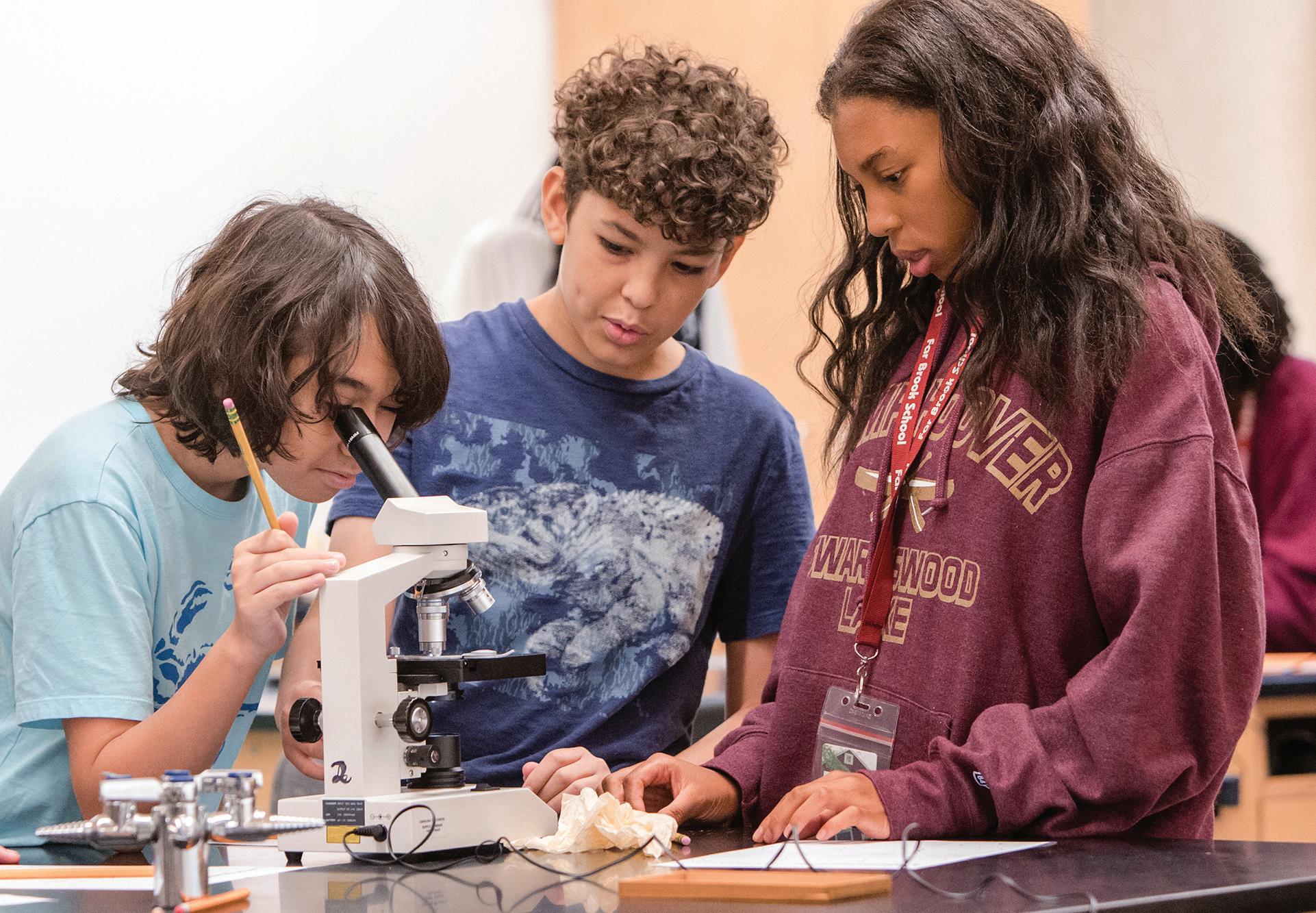
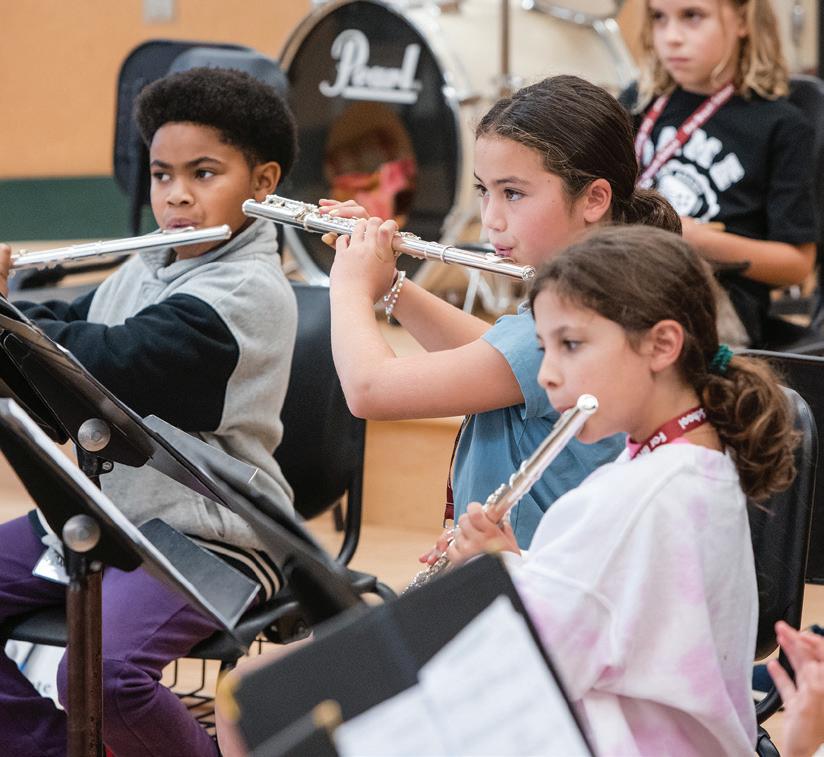
schools and, later, to renowned colleges and universities.
All students participate in world language, drama, music, choir, visual arts, athletics, dance and woodshop.
This full participation allows students to collaborate, discover new strengths and learn to support one another. Discussions, teamwork and cross-grade partnerships
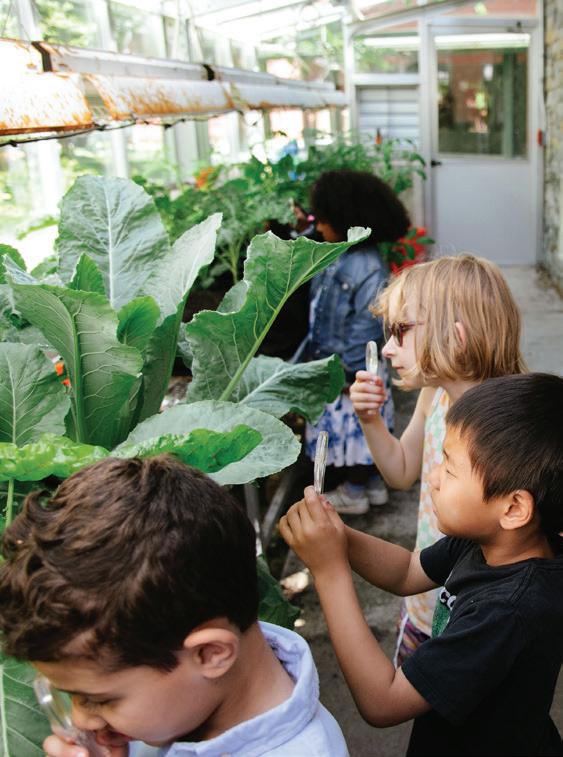
create a respectful atmosphere of listening and caring for others. Older students gain perspective through immersive travel experiences.
“We have a great responsibility to our students as they prepare to make a difference in the world and engage as caring, global citizens,” says Head of School Amy Ziebarth.
697 RTE. 202, FAR HILLS • 908-766-0622 • FHCDS.ORG
Through academic excellence and character development, Far Hills Country Day School provides each child the foundation for success in the modern world. The school celebrates the whole child and focuses on both academic as well as character development in a tight-knit community that forges strong partnerships with families.
“Far Hills Country Day School champions both academic excellence and emotional intelligence, challenging students to think independently and achieve confidently,” says Head of School Georgia S. Zaiser, mom to two alumni sons and former teacher of grades four through eight, division manager and assistant head of school.
The school’s shared growth mindset contributes to its experiential, studentcentered approach to learning, its welcoming community of families and its focus on developing individual strengths. Teachers implement research-based strategies like mind-brain education while embracing emerging technology, embodying characterbuilding skills and participating in professional development opportunities.
Students are known and loved by their teachers, who believe that there are many different paths to success, as is evident in the school’s motto In Virtute MultiAscensus. (There are many degrees of excellence). Teachers are invested in their students, meeting them where they are to develop their unique strengths and challenge them in their areas of growth.
Far Hills boasts an expansive 54-acre campus with a high elements ropes course, pond, mountain bike trail, and a STEAM learning lab. The school offers


athletics, music and performing arts programs and ample opportunities to hone public speaking skills—by the time students graduate they will have had more than 80 opportunities to share their knowledge in a public forum. Recognized as an essential life skill, public speaking starts in preschool at Far Hills.
“As a result, students find power in

their voices and hone their ability to express themselves,” she says. “From preschool through eighth grade, students are given the freedom to explore topics of interest, themselves and the world. Through self-directed learning, emergent curriculum and adventure experiences, their curiosity is nourished and their passions are uncovered.”
80 TOWN SQUARE PL., JERSEY CITY • 201-234-4781 • FRANKLINJC.ORG
When Franklin School opened in 2022, students answered the question, “Are you ready for something extraordinary?” with a resounding “yes”— and quickly embraced everything that entailed. Franklin delivered on that promise and has already made an indelible impression on students, parents, and fellow educators.
“We created a school like no other in the community, but accessible to so many,” says Head of School William Campbell. “With so much to offer students, ranging from a robust, cutting-edge curriculum and Academic Care program not found elsewhere, to our student incubator and state-of-the-art Fab Lab and athletic facilities, their journey will be filled with opportunities to pursue their passions and go wherever their curiosity leads them. In our first two years, we have seen how students eagerly dove in, have grown academically and personally, shown an insatiable quest for knowledge, and surpassed expectations.”
Franklin is dedicated to preparing students to tackle any challenge the future holds—and to succeed in an increasingly complex, ever-changing world. The school’s curriculum, with enhanced rigor, includes pastoral and academic care programs that provide students with mentoring, social and emotional support, and sustained academic skill development regardless of where they are along their education continuum.
In addition to a challenging core curriculum and AP courses, students can take micro-courses and electives designed to cultivate real-world skills essential for graduates to succeed in the most dynamic, competitive employment arenas.
In the Fab Lab, students apply their
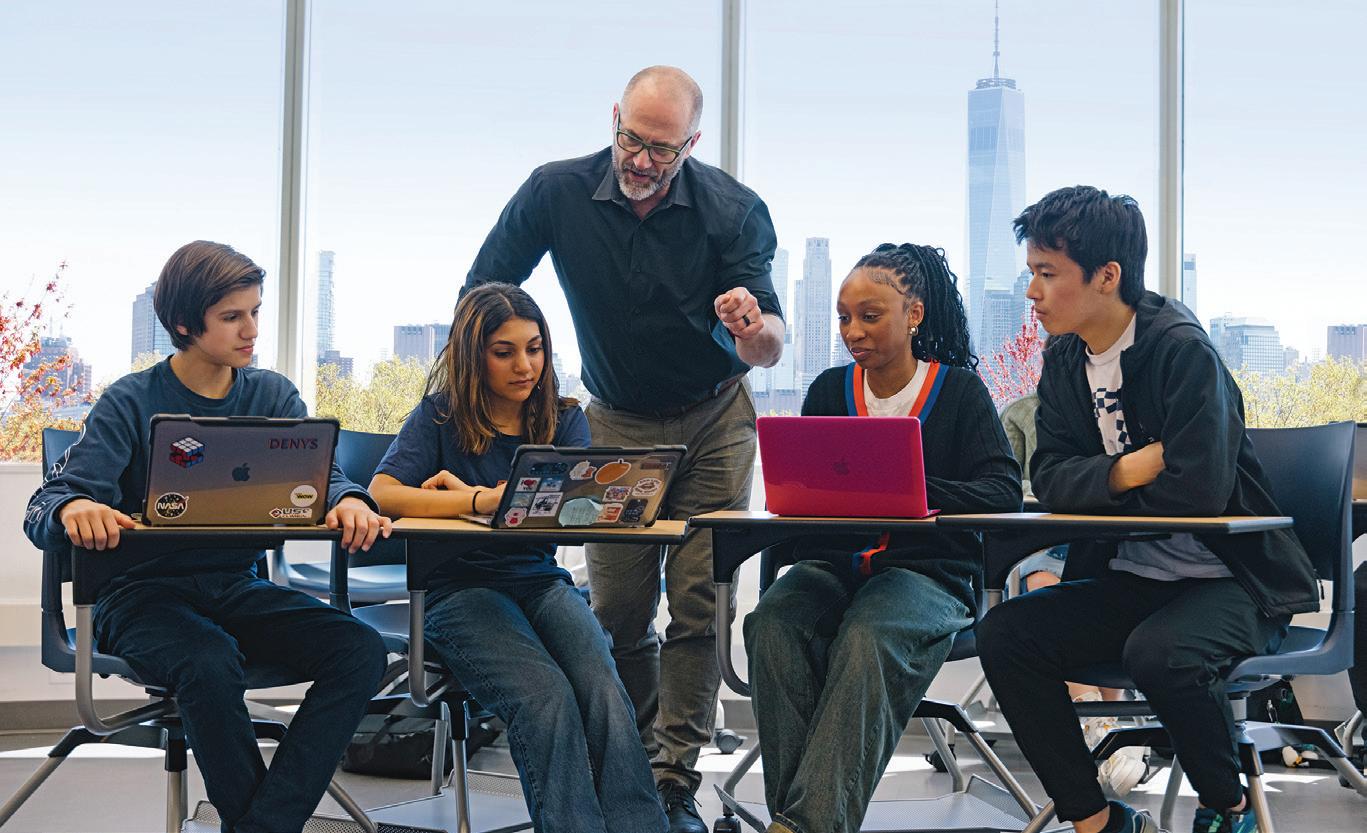

project-based learning, gain skills, and create. It’s also home to an incubator, where they develop the resilience of entrepreneurs and the mindset of innovators, as they shape their own businesses and nonprofits, empowering them to have agency over their future.
No matter the setting, Franklin’s commitment to transdisciplinary learning enables students to make connections to solve real-world problems. “Franklin’s teaching and learning practices are
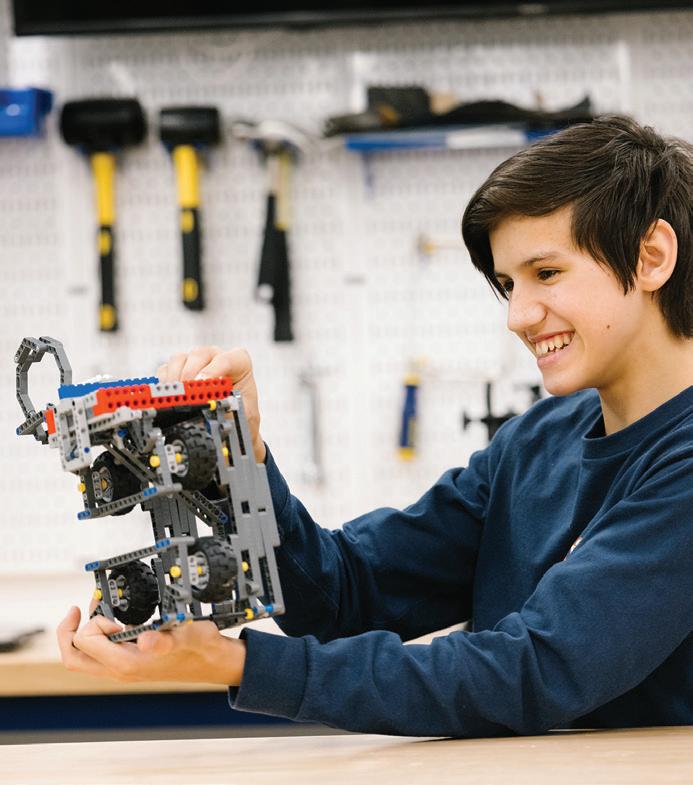
reflective of excellence in education … and Franklin invokes the feeling that the school is committed to practices that will grow the ‘change makers’ of tomorrow,” says Mariesa Grado, Associate Vice President, Middle States Association Commissions on Elementary and Secondary Schools. When they graduate, students will not only have a top-notch education, they’ll also have the attitude and competencies to tackle whatever challenges arise—and thrive.
ST. BERNARD’S RD., GLADSTONE • 908-234-1611 • GSBSCHOOL.ORG
t Gill St. Bernard’s (GSB), preschool through grade 12 students learn to see the world as their classroom through a rigorous program that prepares them academically, socially and ethically for college and beyond. The school provides countless opportunities for students to identify and pursue their passions and engage in experiential learning opportunities both in and outside of the classroom.
GSB has become known for its project-based programs that strengthen students’ skill sets while broadening their worldview. These include the Lower School’s Biome Project, Middle School’s environmental STREAMS program and Upper School’s signature Spring Unit Program, a two-week immersive study experience that involves local, national and international travel.
“Spring Unit provides students with the opportunity to embark on exciting travel experiences as they visit places ranging from the NJ Pine Barrens to South Africa,” says Ann Marie Blackman, GSB’s director of admission. “Giving back is also highly emphasized at GSB, so many of our Spring Units are servicebased.”
An internship program is also available for juniors and seniors. “Students have shadowed veterinarians, lawyers and entrepreneurs, to name a few,” Blackman says. “These connections have helped set them on a trajectory toward what they want to do for the rest of their lives.”
Through a partnership with NJIT, GSB is now the first private school in New Jersey to offer a dual enrollment program, enabling Upper Schoolers to earn college
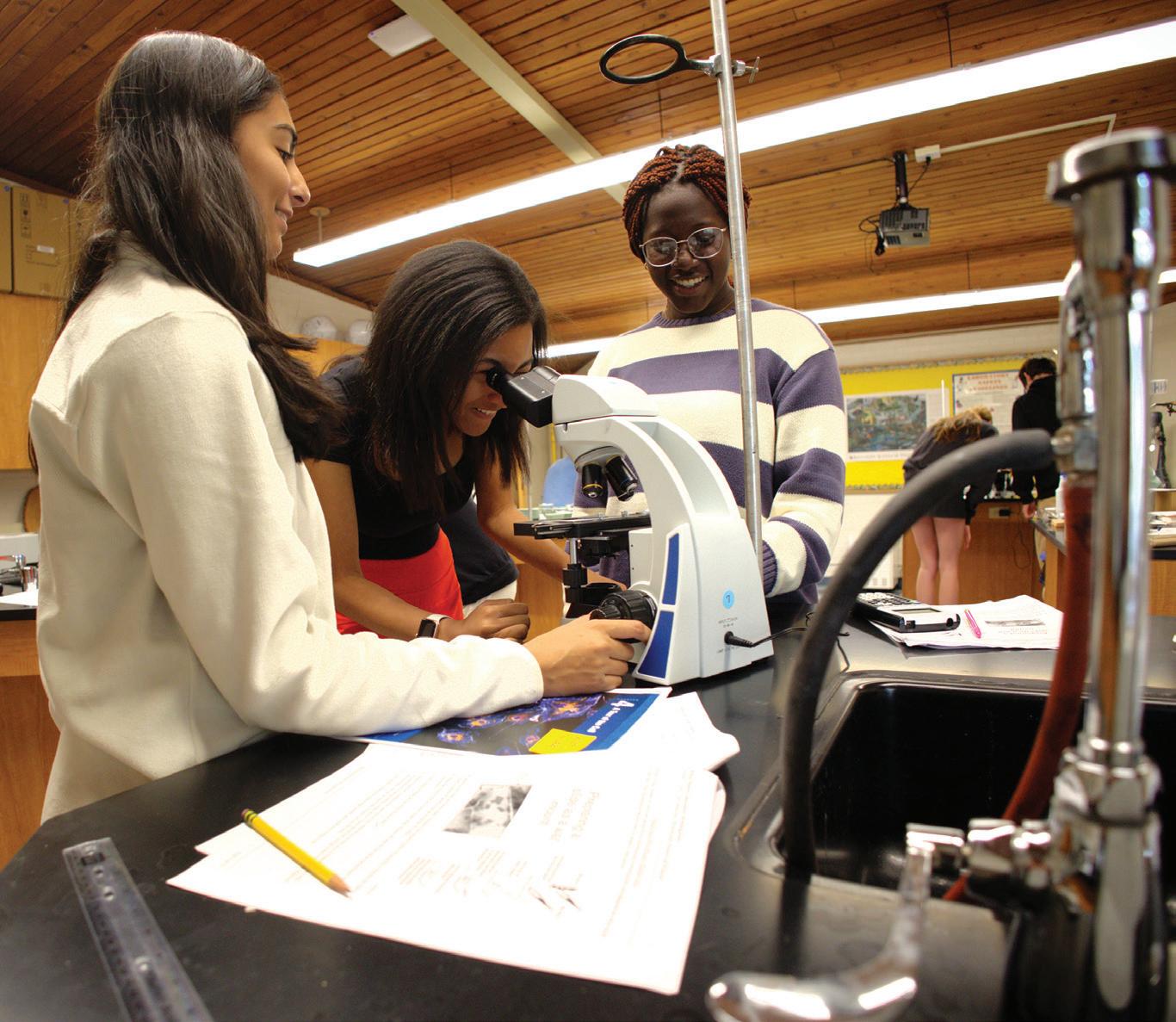

credits in higher-level math courses.
Whether it’s athletics, performing arts or giving back to their communities, students at GSB are encouraged to step outside of their comfort zones and explore their passions. GSB’s 208-acre campus features a performing arts center, a teaching kitchen and a working farm,
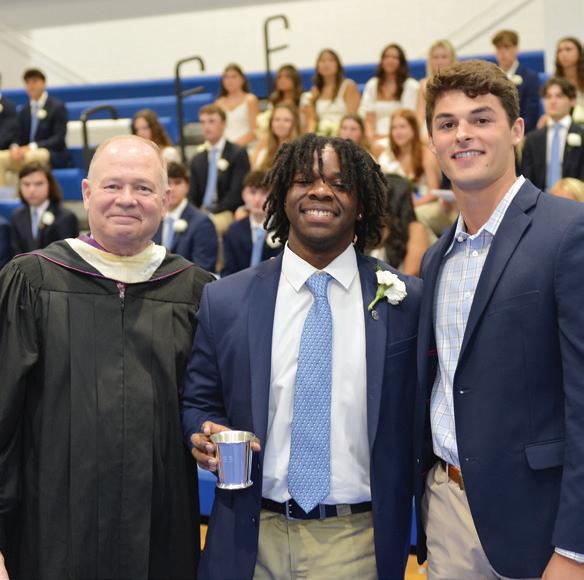
in addition to state-of-the-art athletic facilities for 40 teams across 15 sports.
“From Home Winds Farm right here on campus to countries all over the world, we offer a rich, robust academic experience that takes place in different settings,” Blackman says. “It’s what makes a GSB education so unique.”
Lacordaire Academy’s three-acre campus in Upper Montclair blends a wholesome, small-school education with academic rigor that prepares graduates to enter the world. The college prep school offers a co-ed education from pre-K through eighth grade, and an all-girls Upper School.
“Lacordaire is an age-appropriate joyful bubble where parents know their children are safe and loved,” says Director of Admissions Saydi Callahan Keefe. “But we also prepare our graduates for the outside world by practicing critical thinking skills, good character, and creative problem solving.”
Lacordaire was founded in 1920 by the Sisters of St. Dominic as a FrenchEnglish school for girls. It has since evolved into Lower, Middle, and Upper Schools led by a leadership team that works to uphold Dominican values of scholarship, moral character, and care for the common good.
Currently experiencing its highest enrollment ever, Lacordaire brings a robust schedule of events, celebrations, and galas, domestic and international travel, and opportunities for parent and community involvement. Every Lacordaire graduate, both in eighth and twelfth grade, is getting into at least one of their top three high school/college choices.
Lacordaire students are involved in activities such as forensics and debate, Mathematics Honor Society and visual and performing arts programs, along with an array of other clubs, organizations, and sports teams. The school boasts three new, state-of-the-art science labs. Lacordaire students also matriculate through the school’s rigorous
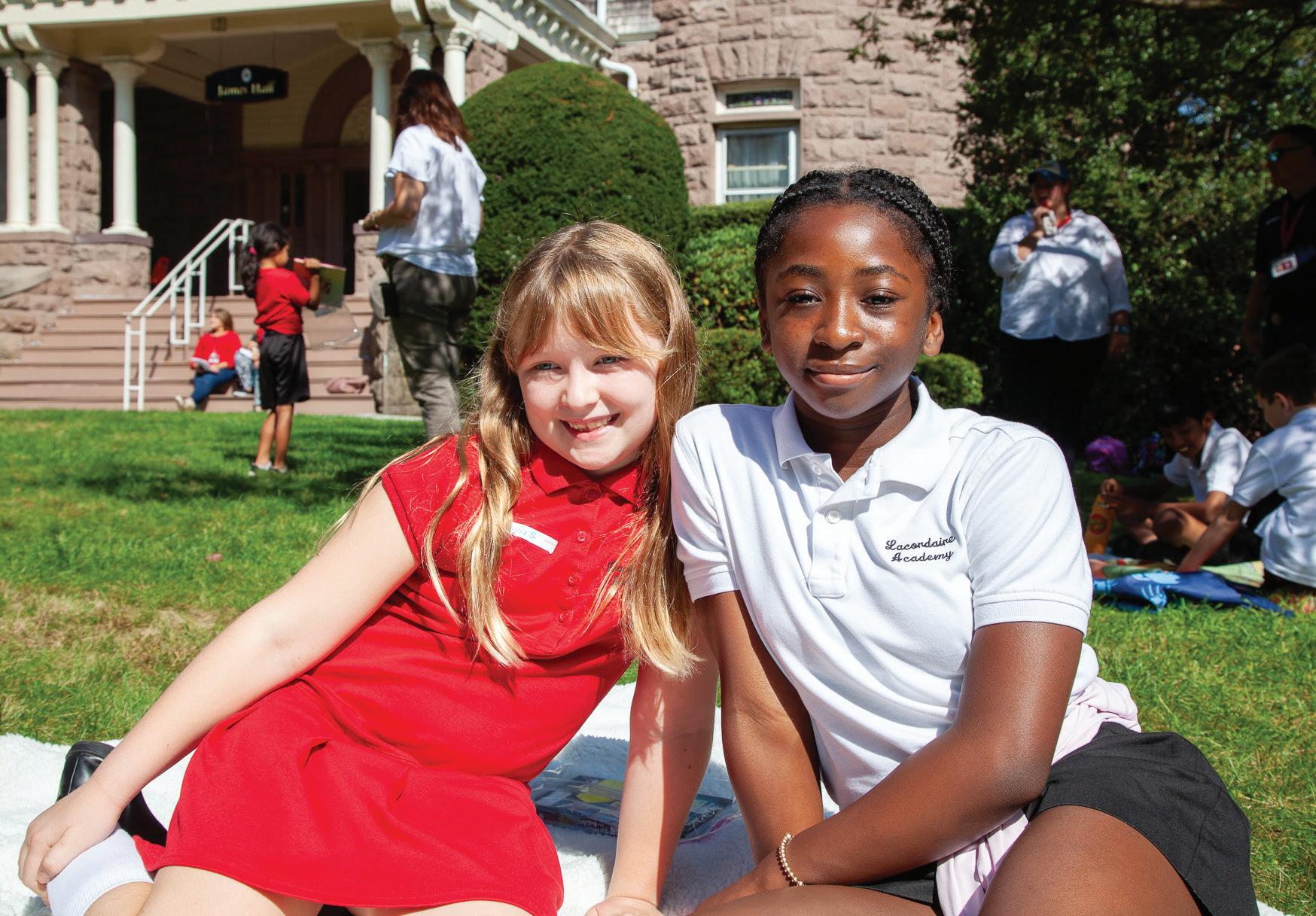
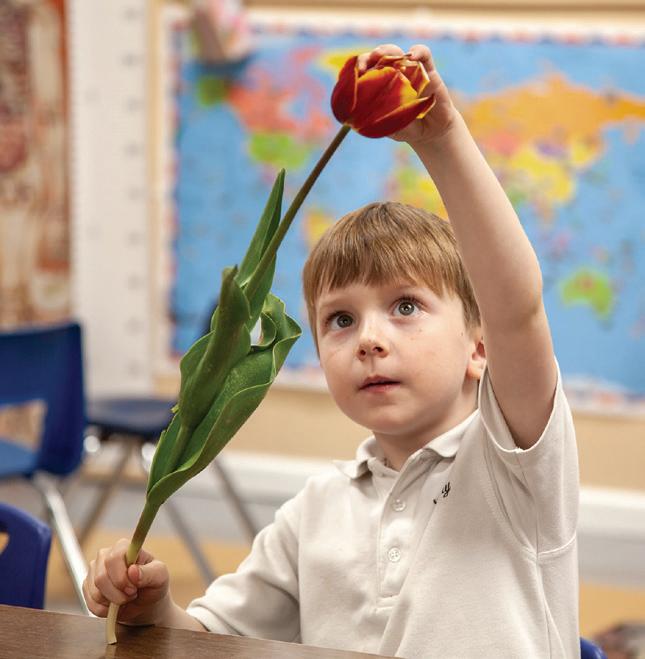
public speaking program.
Every Lacordaire student will participate in community service. “This past year, students volunteered at the Texas/Mexico border to serve at a respite center for migrants. Several months later, students traveled to the De La Salle Blackfeet reservation in Montana to serve as teachers’ aides at a school for Blackfeet
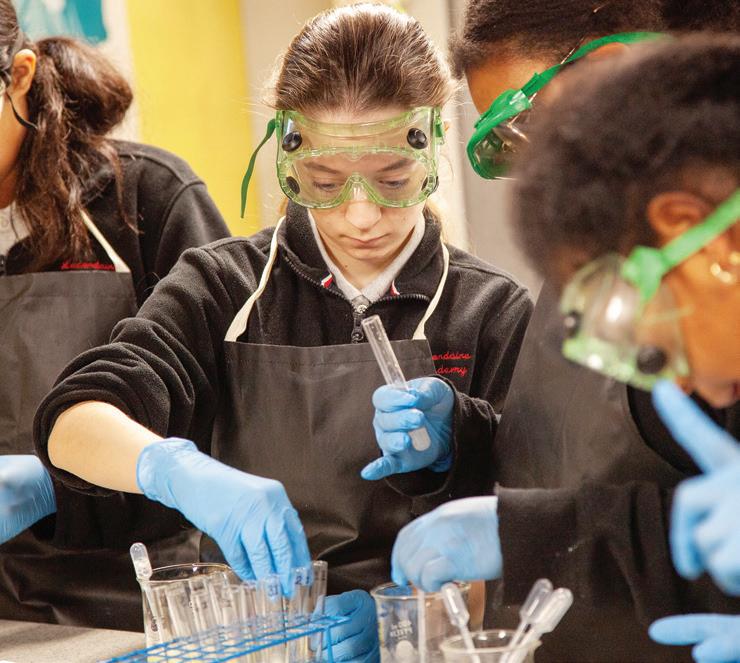
children.” They also volunteer at soup kitchens, senior centers, and schools for children with disabilities.
“We cultivate Dominican values of loving your neighbor, and that shows in the interactions among our faculty as well as children in all three divisions— the older student see themselves as big brothers and sisters to the younger kids and they want to set a good example,” Keefe says.
The Laurel Education Group, which includes Newgrange School and Laurel School of Princeton, recognizes brilliance by empowering students who learn differently. The schools’ evidencebased approach helps students discover their unique educational and social/ emotional path by acknowledging their strengths, talents and brilliance.
Instruction in both schools is delivered with a multisensory and inquiry-based approach by expert teachers who have years of experience teaching children with learning differences and are certified to instruct using Orton Gillingham and Wilson Language programs.
LAUREL SCHOOL: EMPOWERING REMARKABLE MINDS
Founded in 2012, the Laurel School of Princeton is a coeducational independent day school serving students in grades 1-8 with language-based learning differences such as dyslexia, dyscalculia, ADHD and executive function deficits.
The Laurel School fosters the exploration of students’ gifts and talents both in and out of the classroom and integrates opportunities for them to shine, such as through visual and performing arts or engineering challenges and creative expression in the school’s Innovation Lab.
“We’re the only school in the state to offer the NoticeAbility program, a tailored enrichment curriculum that helps students with dyslexia recognize, appreciate and capitalize on their strengths,” says Director of Admissions Amy Deutsch. “By providing experiences that validate their individuality, students build confidence and self-esteem.”
NEWGRANGE SCHOOL: AN EXTRAORDINARY PLACE TO LEARN
The Newgrange School is a learning

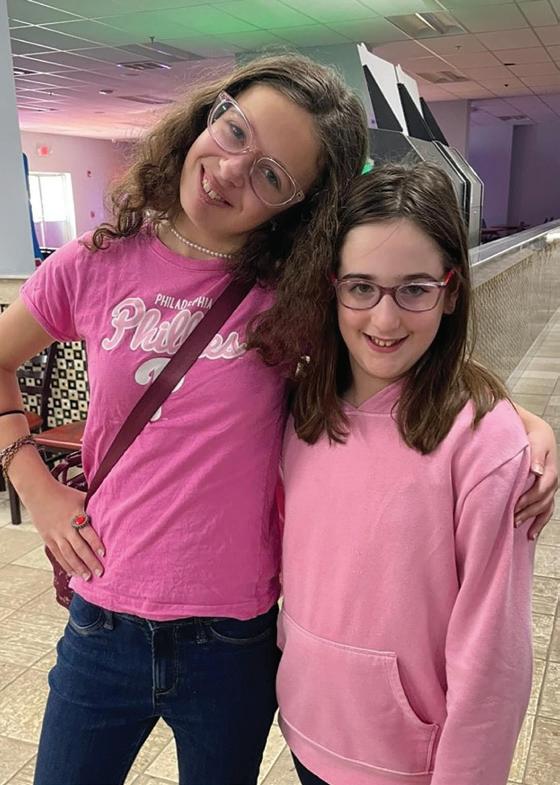
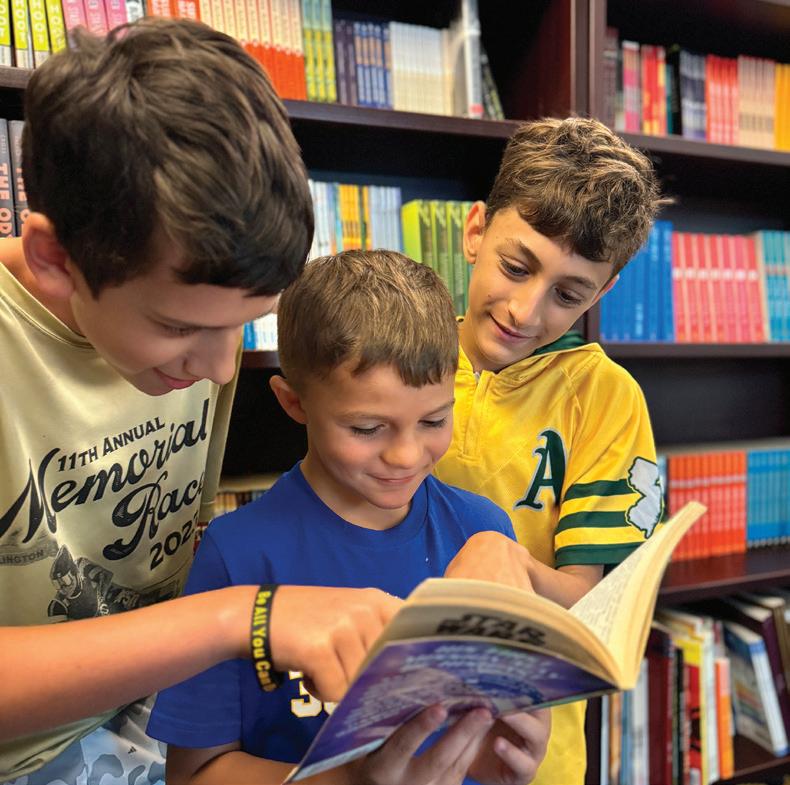
environment dedicated to improving educational outcomes for students with ASD and learning disabilities. Twice-Exceptional (2E) learners build character and community in a multisensory environment that’s academically rigorous and develops the whole child. The school offers a Transition Intensive Program (TIP) for 16-21-year-old students to further their vocational and life skills, social
interactions and community-based experiences.
“Kids often come to us with their confidence broken by their school districts and they feel as though they can’t learn. But their spark quickly returns as they discover that they can grow and thrive here,” Deutsch says. “We regularly receive feedback from parents that their child feels as though they’ve finally found a place where they fit in.”
t Mary Help of Christians (MHC) Academy, prayer and education go hand-inhand as students realize their potential and watch their passions come alive in a community committed to faith, Salesian tradition and excellence.
Founded in 1942, the school continues to be taught in the tradition of the Salesian Sisters of St. John Bosco. During their time at MHC Academy, students become catalysts for positive change inspired by their belief in God and the Salesian spirituality with a commitment to service.
MHC Academy is an accredited, collegepreparatory high school sitting on over 16 acres in North Haledon. It’s not uncommon to find students reading outdoors beneath trees on the sprawling campus, or working collaboratively in the library on their iPads as they prepare for the rigors of college life upon graduation. Recent additions to the academy include a state-of-the-art STEM lab and a new Athletic Center with cardio and strength-building equipment - not to mention a beautiful new chapel.
“The MHC graduate is a confident, innovative thinker and lifelong learner who feels the responsibility to contribute to society,” says Sr. Kelly Schuster, Head of School. “Our graduates have developed a strong character in faith and are ready to go out into the world and promote what is morally just and right.”
DISCOVERING GOD-GIVEN GIFTS
MHC Academy is more than just academics—it’s also athletics and nearly 50 extra-curricular activities. Parents appreciate the all-girl, culturally-rich and diverse environment where students are focused on discovering their God-given
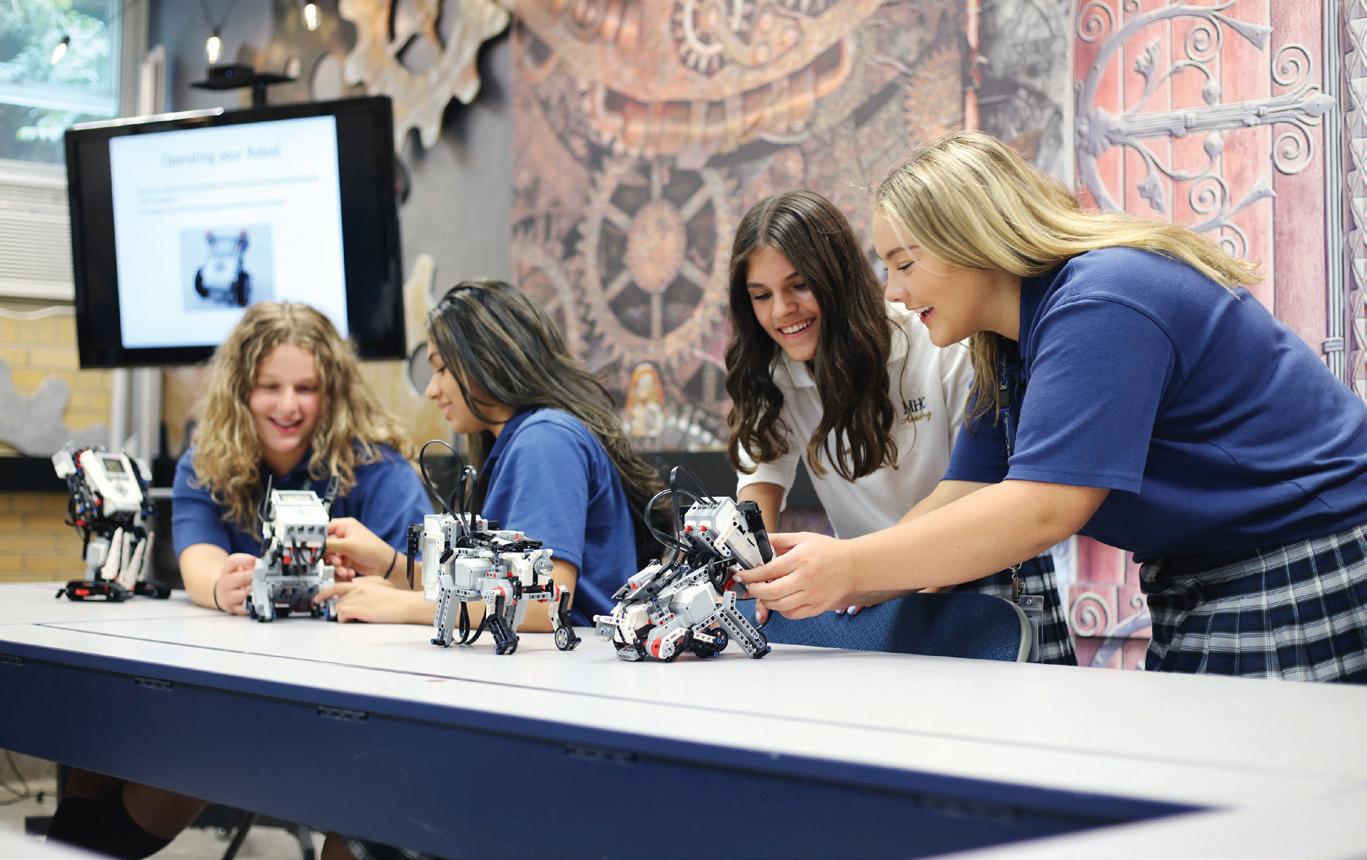
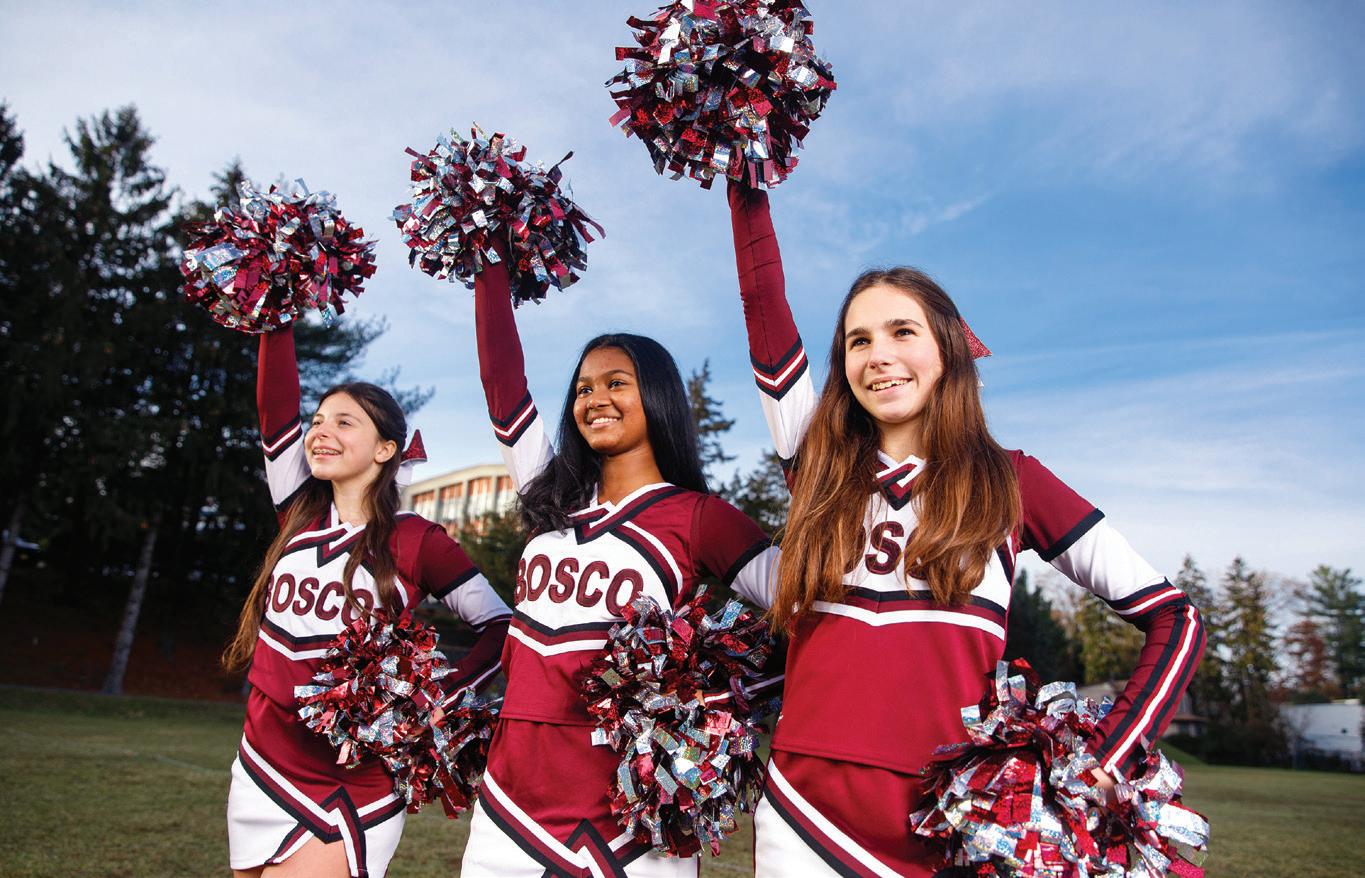
gifts and where the faculty and staff are focused on helping each student find their career and calling. The student-teacher ratio is 8:1 and 80 percent of teachers hold advanced degrees in their subject areas. The school has a robust Advanced Placement program and dual enrollment agreements with Fairleigh Dickinson and Seton Hall universities, so students can earn college
credit without ever leaving campus—in fact, one student was able to skip her entire freshman year because she took so many dual enrollment courses. “Our faith-filled education teaches girls the responsibility to be good citizens, and we create an environment of support and sisterhood that sees each student get accepted into their college of choice each year,” Schuster says.
224 ORANGE RD., 201 VALLEY RD., 6 LLOYD RD., MONTCLAIR • 973-746-9800 • MKA.ORG
Montclair Kimberley Academy’s (MKA) challenging, engaging and innovative academic program provides students with a vibrant and transformative education. The faculty’s deep and genuine understanding of students as individuals and learners fosters their ethical development, intellectual growth and personal success.
MKA families appreciate the school’s friendly and inclusive community and strong commitment to diversity, the quality and reputation of an MKA education and the supportive faculty and staff who serve as role models for students. Across their three campuses, there are over 20 a nity groups and clubs for community members to explore their identities and shared experiences. “These groups offer the opportunity to connect, build community and construct positive relationships,” says Head of School Nigel D. Furlonge.
In addition to a nity groups and clubs, the school’s athletics program has won more than 125 team championships in the last 10 years while its fine and performing arts program continues to thrive at all levels, delivering more than 30 performances each year.
MKA teachers emphasize individual and collaborative processes in the journey of each student. At the same time, the school’s active and engaged alumni community embodies the school’s core tenets of knowledge, vision and integrity.
In partnership with the community engagement coordinator on each campus, the Parents’ Association of MKA (PAMKA) helps run community-
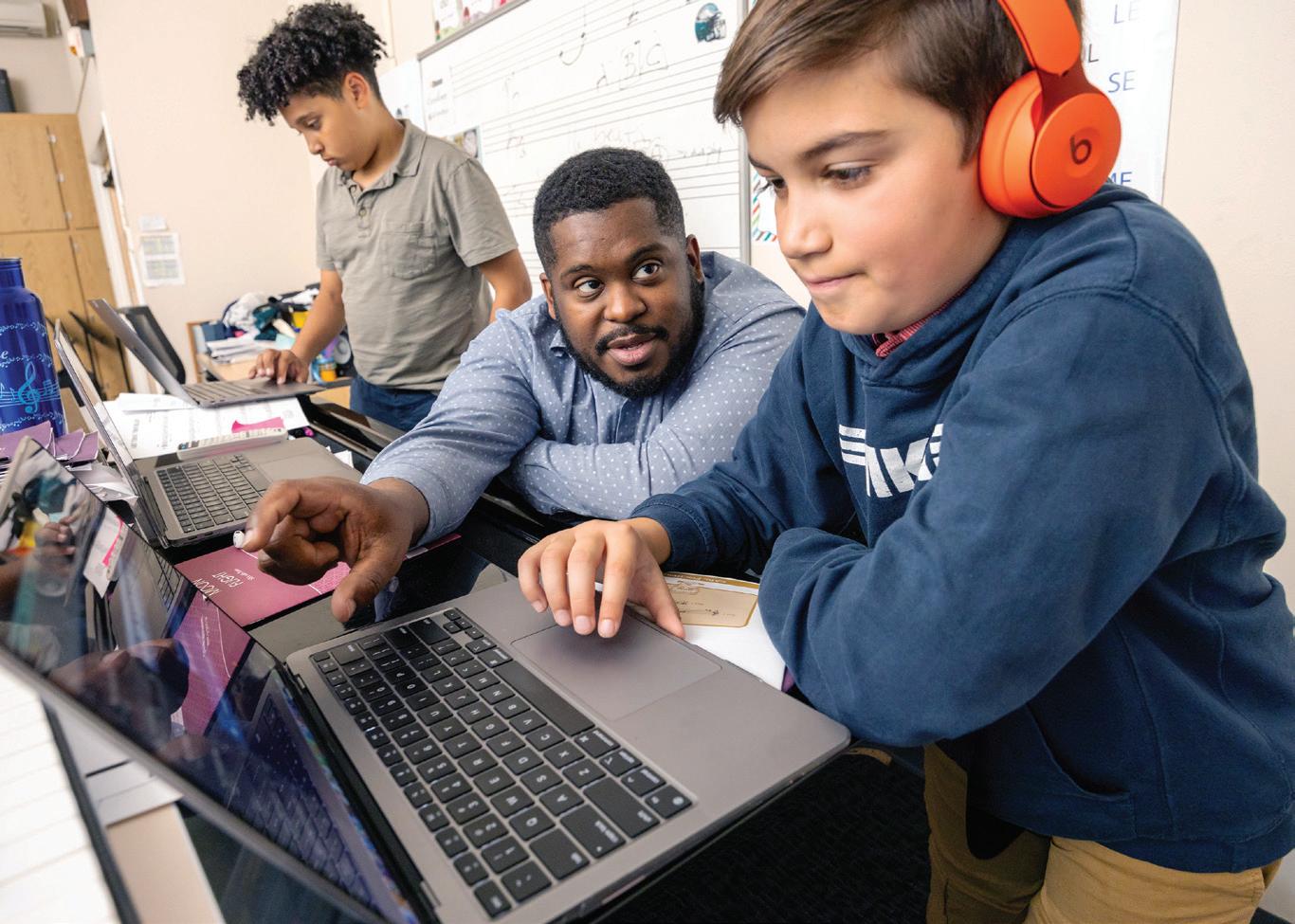
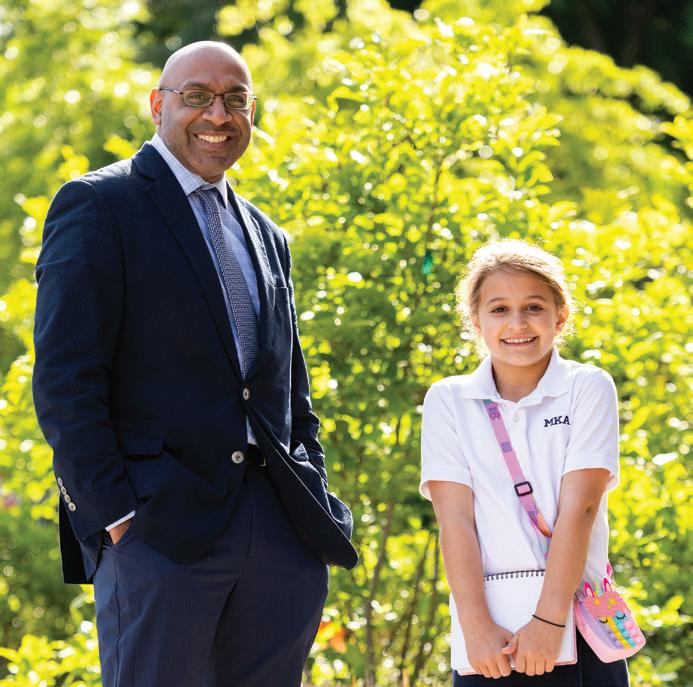
wide engagement drives to support local nonprofits such as Toni’s Kitchen and The Human Needs Food Pantry.
Throughout the school year, students also have the opportunity to support their local communities through activities such as performing at homes for senior citizens, creating welcome bags for newly adopted pets at the local shelter and planning the annual Fleming 5K.
“An integral part of an MKA education

at every level, ethical leadership turns our students into change agents by equipping them with the critical skill of asking meaningful questions,” Furlonge says.
“Understanding integrity and ethical practices in both learning and leadership is not merely a fundamental principle at MKA—it’s a strategic advantage that prepares our ontclair students for thoughtful, responsible engagement with the world around them.”
Celebrating its 61st anniversary this year, the Montclair Cooperative School continues to be a leader in progressive education. The Co-op is led by student interest, expertly guided by teachers and actively supported by parents. All three groups work together toward maximizing the personal growth and excellence of each student—and the school as a whole.
From preschool (which begins at age four) through eighth grade, small class sizes deepen the connection between the students and their teachers, allowing students ownership of their work and instilling a lifelong love of learning.
NURTURING SKILLS THROUGH PERSONAL CONNECTION
Montclair Cooperative School’s mission is to create a nurturing and diverse environment where children grow and flourish intellectually, emotionally and socially. Using progressive models for learning, emphasis is always placed on children’s work and the way they think about the world.
“The development of social-emotional skills is an integral part of the Co-op, so we focus on helping children learn how to negotiate, reach consensus, resolve conflicts and advocate for themselves and others,” says Director of Enrollment Management Emily Kohan.
Co-op teachers create a deep and personal connection with each and every student. They examine every child’s thinking individually and in small groups, and plan a curriculum that will challenge them in academics, the arts and social skills.
“Keeping children engaged in their own learning encourages them to be creative with their education—no matter the format,” Kohan says.
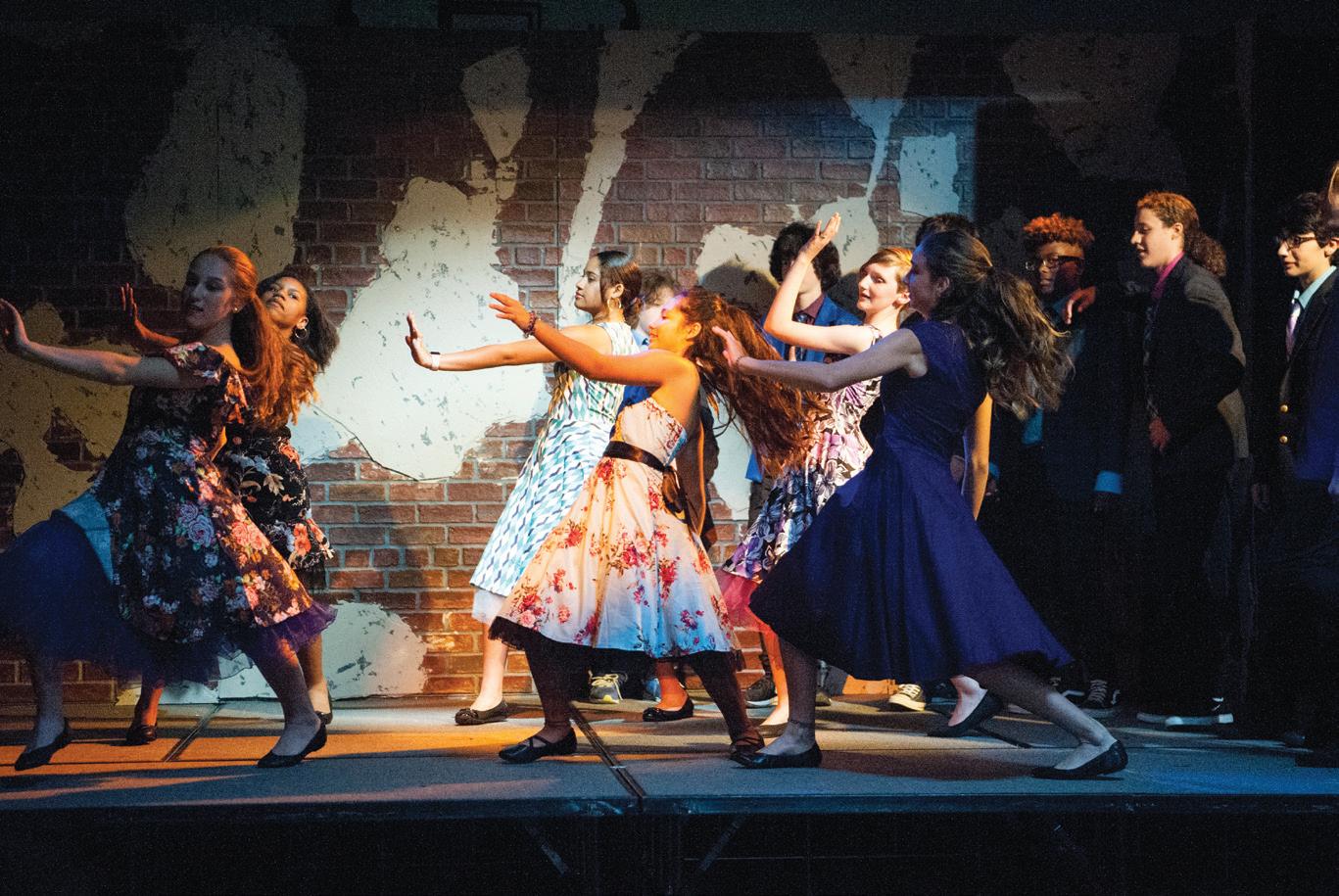
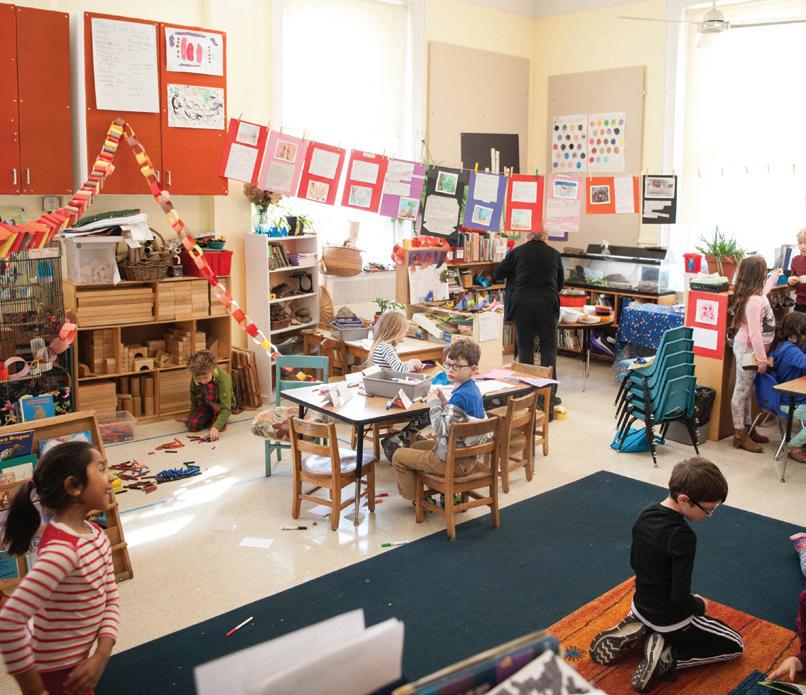
At the heart of Montclair Cooperative School’s success is community. The school believes parents are partners in their children’s education, and they are invited to participate in many aspects of Co-op life. Parents support the school by assisting in their child’s classroom, lending their time and talent through a family job, fundraising or serving on a committee.
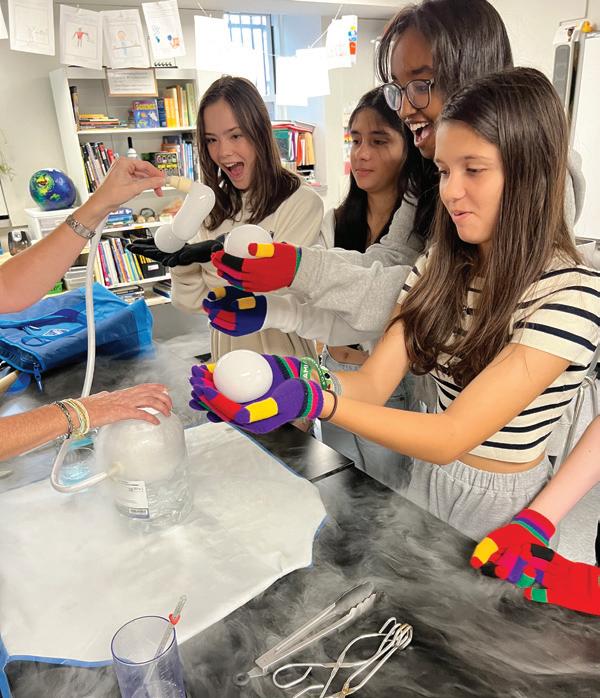
“Alumni and alumni families remain connected to the Co-op and are inspired to give back to the community in which they thrived,” Kohan says. “Our school respects and nurtures its community, and in return the community nurtures the school. Together, we hold true to the belief that a child who is socially and emotionally in a positive, balanced environment has a strong foundation for continued study, growth and academic success.”
3 RYERSON AVE., CALDWELL • 973-226-0660 • MSDACADEMY.ORG
Nestled in the picturesque town of Caldwell, Mount St. Dominic Academy stands as a beacon of academic excellence and spiritual growth.
With a 130-year legacy of educating and empowering young women from diverse ethnic, religious and economic backgrounds, the independent Catholic college preparatory school is dedicated to shaping socially responsible leaders who are encouraged to learn, to lead and— most importantly—to be themselves.
At the core of the Mount’s ethos are four Dominican pillars: prayer, study, community and mission. These guiding principles inspire students, faculty and staff to foster a profound spiritual connection, nurture intellectual curiosity and embrace a mission-driven approach to service—all while ensuring each student is prepared to make a meaningful impact globally.
The curriculum includes signature programs like the L.E.O. Entrepreneurship Program, a capstone in directed research, social justice concentration, health sciences and STEAM programs. Students can participate in extracurricular activities, clubs and service opportunities, as well as championship-winning competitive athletics and an awardwinning performing arts program.
The Mount prides itself on its innovative approach to education that’s tailored specifically to how girls learn best. The small class sizes and personalized instruction are hallmarks of the school’s success; the individualized attention students receive has contributed to a college acceptance rate of 100 percent.
Dr. Karen D’Avino, principal, states,

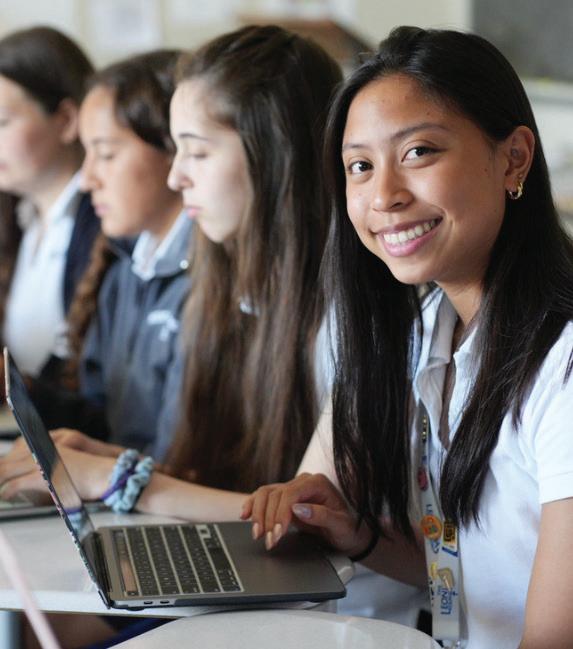
“A Mount education guides students toward their aspirations, whether that’s attending prestigious colleges, pursuing legal careers, excelling in medicine, leading in the corporate world, or succeeding in the arts. Our graduates leave ready for adulthood, higher education, and their professional paths, inspired to become catalysts for positive change in society.”
MSDA is more than a school; it’s a
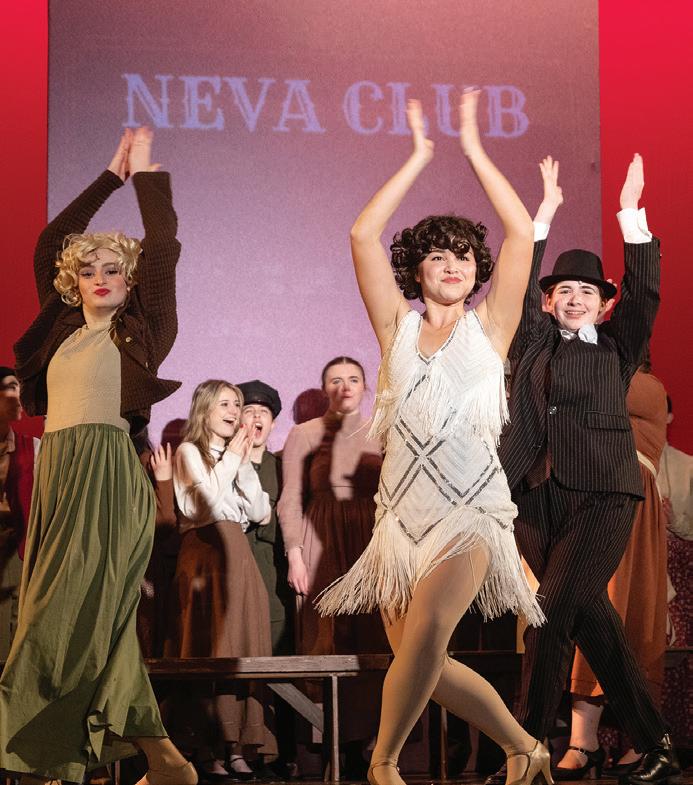
transformative community and family where young women are empowered to become leaders, changemakers and compassionate individuals. Through a blend of rigorous academics, spiritual growth, sisterhood and real-world learning experiences, the Mount continues to elevate and inspire its students, preparing them to make a lasting impact in an everchanging world.
Ranney School, an age 3 through Grade 12 college preparatory school in Tinton Falls, fosters curious learners who are creative and critical thinkers.
Ranney students love learning, welcome new challenges and explore passions authentically and meaningfully. The school offers a robust and rigorous course of study across disciplines with expert and nurturing faculty that inspire, challenge and support students.
Ranney School’s collegiate-style 65-acre campus provides endless opportunities, including a new greenhouse and science labs that will be dedicated for the 2024-25 school year. Last year, the school invested in a Finance Lab featuring 12 Bloomberg terminals.
The Lower School opened the Bharara Lower School Library and Learning Commons last year, and the astronomy program also expanded with access to the Ranney observatory.
“Research shows that physical spaces play a very important role in student learning and engagement and it is wonderful to see our students and teachers benefitting from projects we identified in our recent master site plan,” says Head of School Dr. John Gri th. “The opportunity to learn about science at the pond or in the community garden—or take classes outside using the outdoor classroom—are a benefit to students in all divisions.”
THAT NURTURE A WELL-ROUNDED EDUCATION
Students are encouraged to take advantage of all that Ranney has to offer while they explore emerging talents and interests. There are myriad opportunities for students to take on leadership roles to develop that skill.
Ranney offers numerous activities and
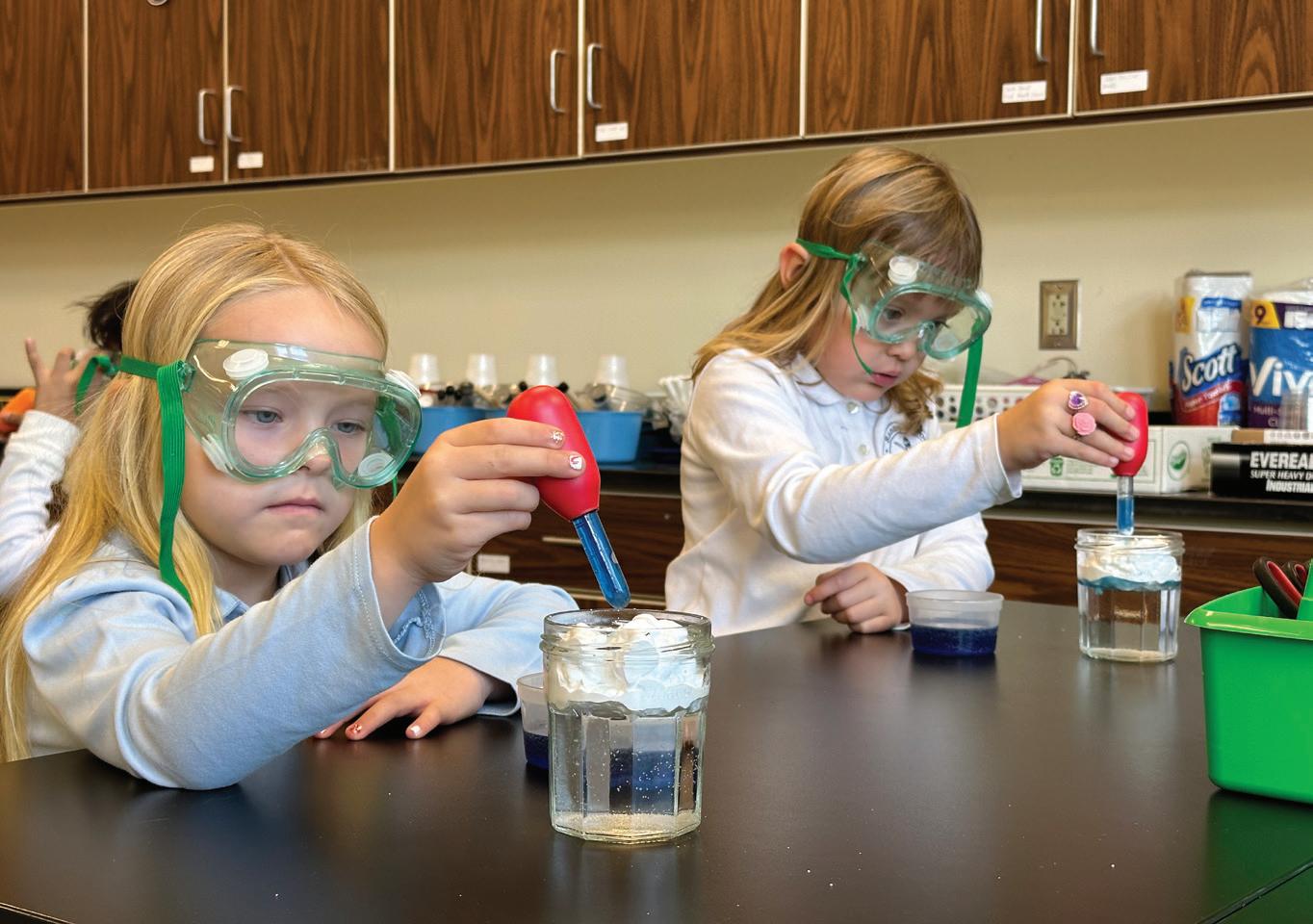

opportunities for students to pursue their passions at a high level. The performing arts department won seven Basie Awards for the productions of She Kills Monsters and Mean Girls this year, while the boys’ golf team won the state title in the spring. All three Middle School ensembles (band, chorus and orchestra) earned superior ratings at the High Note Festival, and many visual arts students and creative writing

authors received Scholastic awards this year.
“Through co-curricular activities, students not only develop their skills and talents but also learn collaboration, resilience, organization, creativity, hard work and other life skills,” Gri th says.
“We are fortunate that in a small school kids don’t need to choose just one area to explore.”
101 CORREGIDOR RD., TINTON FALLS • 732-291-1297 •
n independent, all-girls school that educates and empowers young women in the Catholic tradition, Trinity Hall provides an innovative college preparatory program grounded in four core values: leadership, respect, perseverance and faith. The school prepares its students to achieve their full potential as they embrace their place in the world.
“Trinity Hall is a place designed specifically for girls and how they learn best,” says Head of School Theresa Kiernan. “Students are immersed in an environment of academic, athletic and artistic excellence while being supported in a nurturing, caring community that puts students at the center of everything we do. Girls can do anything when they know how much they matter.”
Independently governed and taught with an all-honors curriculum in the Catholic tradition, the school’s Circle of Support ensures students have the appropriate resources to help them reach their full potential while fostering a sense of community. A student advisory program, Big Sister/Little Sister program, health and wellness program, and a daily student support period offer that support along with faculty, staff, coaches and counselors.
The school’s comprehensive college counseling program assists students in reaching their goals, while robust arts and athletics programs allow young women the opportunity to learn, create and compete at the highest levels. Trinity Hall is home to more than 40 clubs and student organizations and 16 sports
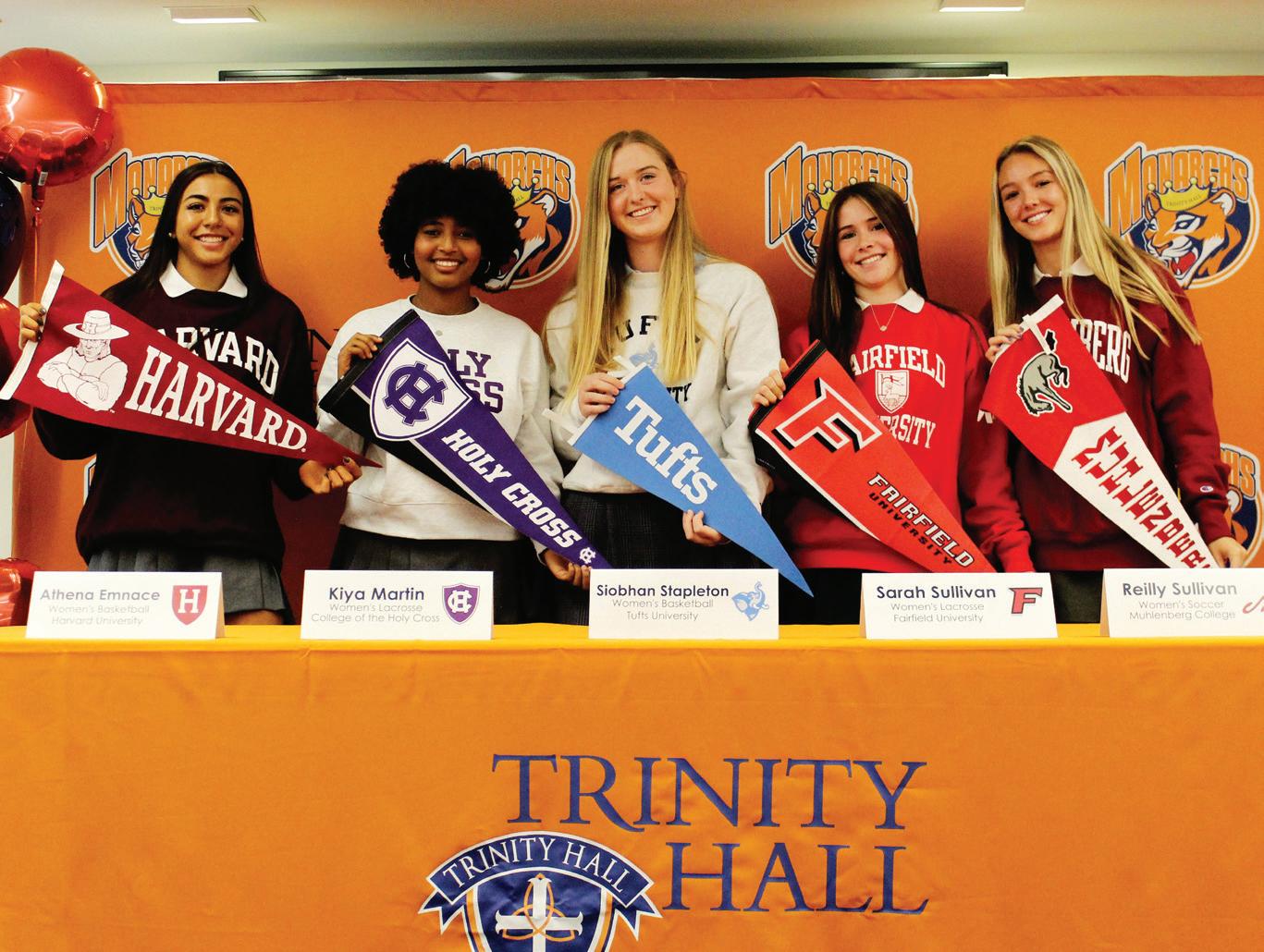
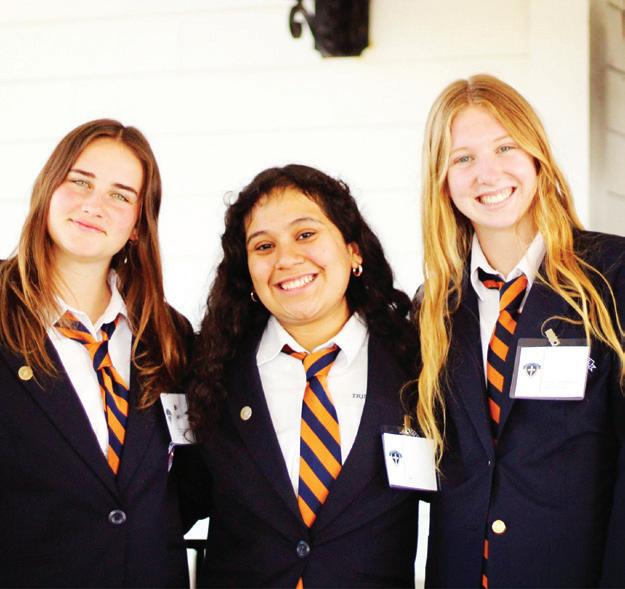
teams.
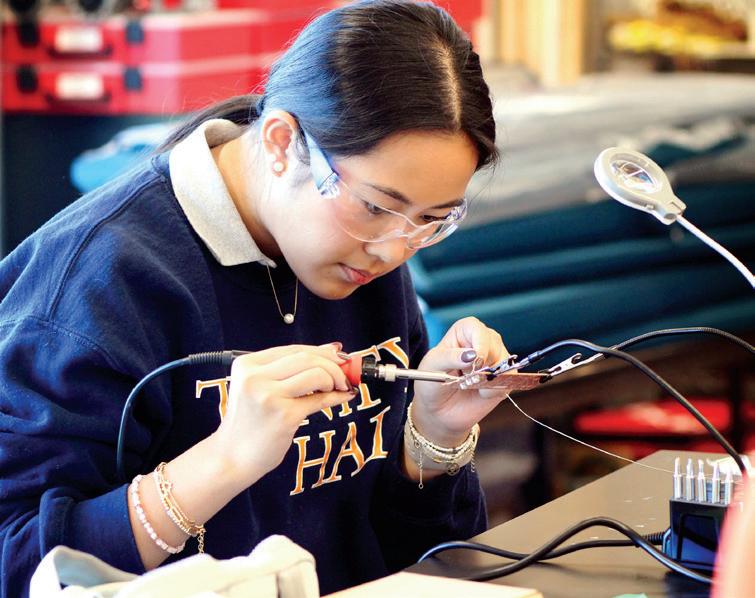
“Our students are committed to their academic experience while understanding the importance of the greater school community,” Kiernan says. Trinity Hall’s annual Service Day is an opportunity for the entire school community to work with local organizations on service projects, exposing students to charitable groups they can connect with on a regular basis.
“With award-winning academics, arts and athletics programs, we provide an environment where students can stretch themselves, grow by taking risks and persevere in the face of failure,” Kiernan says. “Our girls are supported by a worldclass faculty that’s dedicated to providing the necessary support to help them thrive. Our school community lives in faith and shows up for each other—not just on special occasions, but every day.”
75 KNICKERBOCKER RD., ENGLEWOOD • 201-871-8808 • ABILITYSCHOOLNJ.ORG
Ability School is a private, independent school that treats children as unique individuals. With small classes and a proficiency-based curriculum, students work on individual programs tailored to their abilities and interests. “All students work at their own pace, so if they’re strong in a particular area they will move on to new challenges, whereas if they need a little more help mastering something they will get the support they need,” says Headmistress Joan Marrazzo.
Founded in the Tri-State Area in the late 1970s, Ability School is now approaching 40 years in Englewood. The school offers families an alternative to traditional teaching for children in pre-K through eighth grade. Many Ability School students begin reading at age four thanks to its robust reading, vocabulary and comprehension curriculum.
The curriculum grows with students throughout the program in all subjects,
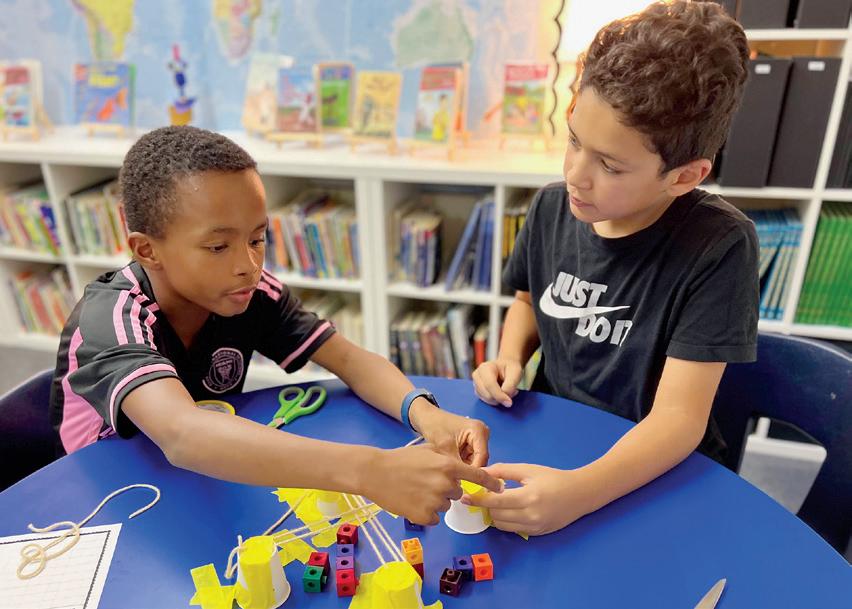
and focuses on both competency and study skills. “Our goal is for students to master their material—not memorize it—so that they can articulate what they’ve learned and apply that understanding to real-life situations,” Marrazzo says. “Our approach creates self-determined and independent students with a love of learning.”
Giving back to the community is vital at the school, from organizing food
The largest network of Montessori schools in New Jersey, Apple Montessori is opening two new locations in Princeton and Westfield to bring the total number to 20 schools. Their modern Montessori approach to early childhood education includes programs for children 6 weeks to 12 years.
“Academics are very important to us, and we want each child to become independent and confident in their abilities,” says Regional Director Kellie Capatasto. “We also strive to help children be kind, respectful and curious, with lots of opportunities to explore.”
At Apple, children are encouraged to move and grow at their own pace. Teachers introduce hands-on materials and guide children through individual and group lessons. The calm, organized classrooms are set up to encourage exploration and discovery.
Many locations also feature certified Outdoor Classrooms, which serve as a way to take lessons outdoors and organically
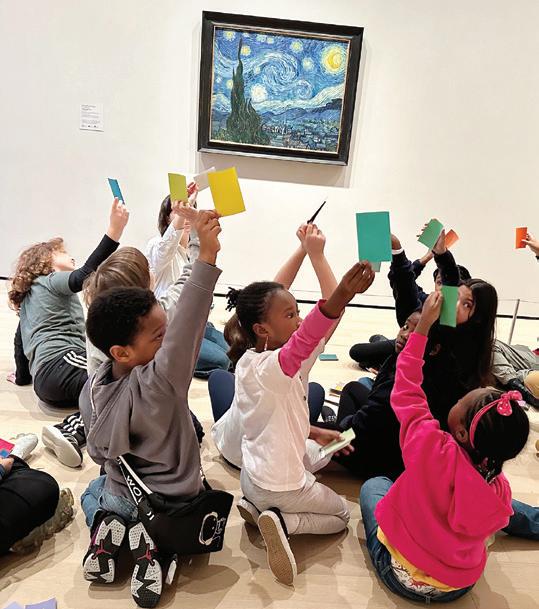
drives to hosting park cleanups. Ability School also partners with local non-profit organizations to help benefit community members in need.
“We have a strong sense of community here, and that extends beyond the walls of our school,” Marrazzo says. “But the relationship forged between the parent, student and school is of the utmost importance to us.”
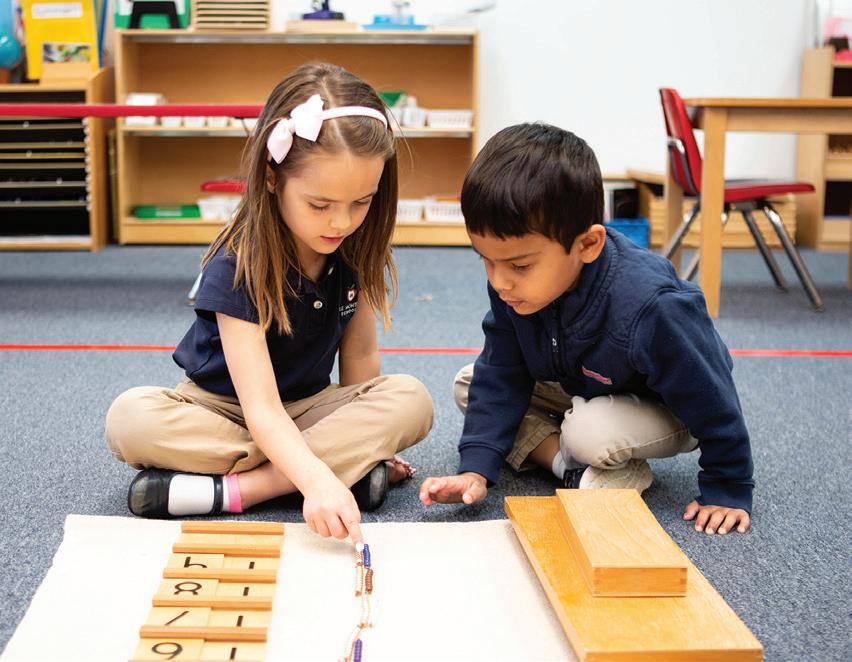
connect children with nature. “Every child is different, so within a typical program some of the children can get lost while some get bored being taught the same lesson as everyone else.
“Our program is special because we have opportunities to challenge and pique any child’s interest through self-discovery, from science, geography and math to yoga, art and cooking,” she says.
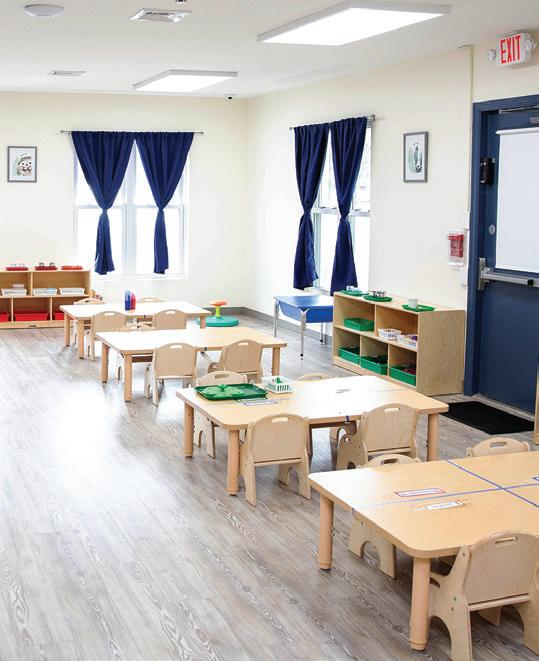
The preschool program also incorporates computers and coding, STEAM, critical thinking and public speaking skills, as well as an exceptionally strong reading program that has many students reading by the age of four. “We develop respectful, kind children who are happy to be here but are more than ready for the next step when they leave us,” Capatasto says.
2177 OAK TREE RD., STE. 100, EDISON • 908-224-3718 • BBMACADEMY.COM
Big Blue Marble Academy’s (BBMA) mission is to nurture little minds and grow big hearts. The school is a home away from home with a robust preschool curriculum to ensure children are developmentally, socially and emotionally prepared for kindergarten and beyond while also providing a foundation for global awareness and service learning.
“The most frequent compliment we receive from families is that they feel at home here,” says Center Director Mariyah DortchRobinson. “Parents know their children are safe and cared for and appreciate that our staff and teachers know everybody by name.”
Students enjoy state-of-the-art facilities, such as an indoor gym and can participate in activities from gymnastics and soccer to music and cooking. The school also offers before- and after-care for school-age students as well as summer camp.
BBMA is known for its global curriculum to enhance children’s perspective and understanding of the world outside
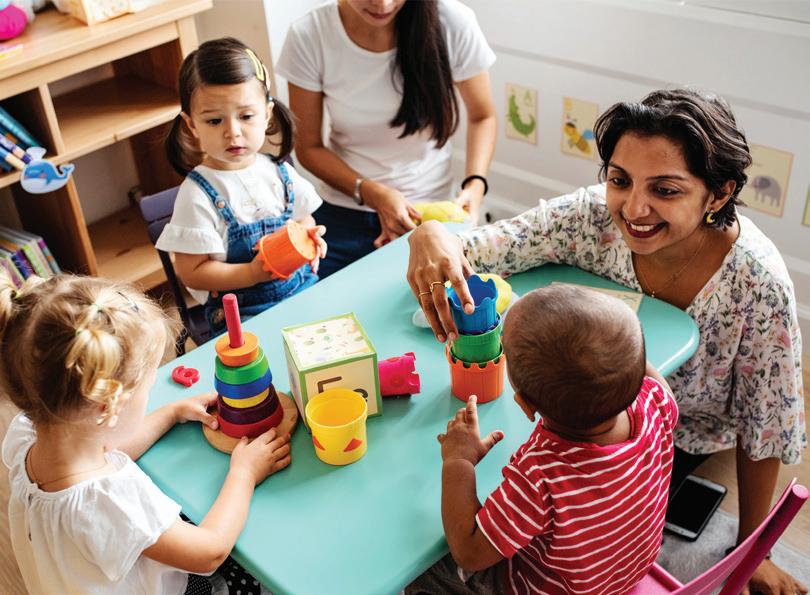
their community. The Edison location offers a language immersion program in Mandarin, French and Spanish.
Another hallmark of the BBMA curriculum is community service performed through service learning projects. Heart Projects teach children the importance of giving back and helping others through hands-on activities such as lemonade stands to benefit childhood
The Center School has served students with learning disabilities for more than 50 years. Most of the school’s 100 students in grades 3-12 are on the autism spectrum, and there’s a transition program for high school graduates up to age 21 who may not be ready to pursue college, a vocational school or enter the workforce.
“This year the school is improving upon a robust life skills curriculum to help students develop their skills in tasks ranging from money management to grocery shopping. These skills are essential no matter what our students decide to do in life,” says Executive Director Dr. Ronald Rinaldi. “We help students work through their challenges and prepare them not only to go back to their original school district, but to succeed as adults in the real world.”
From physical and occupational therapy, counseling and behaviorists, and reading and speech/language therapists, The Center School has everything
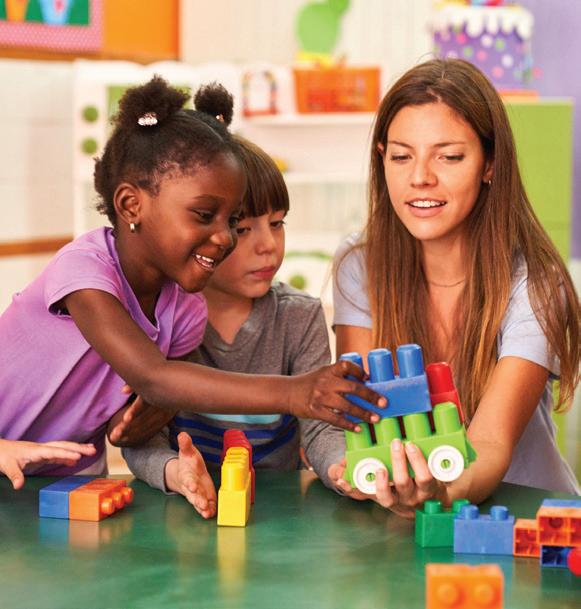
cancer research through Alex’s Lemonade Stand Foundation or holiday-timed projects during the BBMA Season of Giving.
“It’s our way of helping students develop empathy, community service and good citizenship,” Dortch-Robinson says.
“Raising money for cancer research or giving to less fortunate families during the holidays makes a really big impact on them.”

that a student with special needs requires to be successful. Along with an academic curriculum that mirrors that of mainstream schools, students have access to electives like music, art, and woodshop as well as after-school clubs and athletics like soccer and basketball. There are also trips, concerts, plays and more, as well as an e-sports gaming program where students can compete
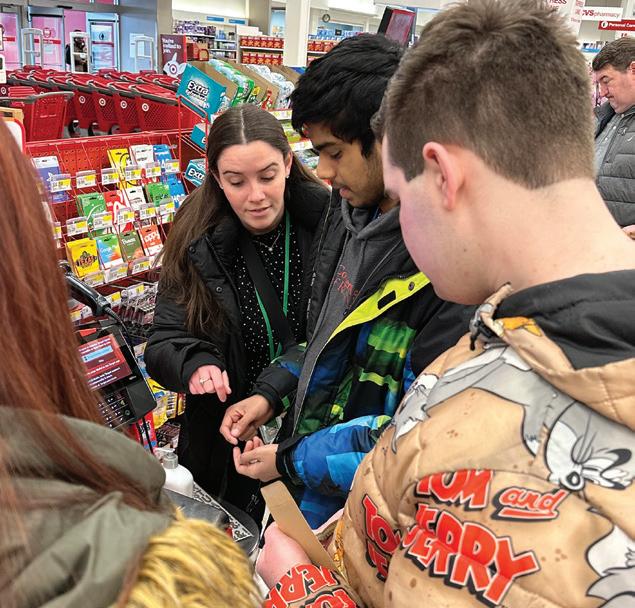
against other schools.
“Many parents don’t realize schools like ours exist—their child may be taking advantage of interventions or special education programs at their district school, but still not have the support they need to thrive,” Rinaldi says. “We implement additional services for these students and support parents as they advocate for what their child needs to be successful.”
500 VAN EMBURGH AVE., TWP. OF WASHINGTON • 201-445-6800 • IHANJ.COM
An all-female, college preparatory high school in the Archdiocese of Newark, Immaculate Heart Academy (IHA) focuses on the complete education of young women by cultivating traditional Christian values while upholding exceptional academic standards.
IHA develops every aspect of the individual by educating the mind, nurturing the spirit, and promoting a healthy lifestyle. Students develop a level of independence and accountability that becomes a tremendous advantage in their college years.
“The positive and demanding single-sex environment instills a sense of confidence in our students, and cultivates the notion that they can achieve their goals and focus on developing their unique gifts,” says Kerry Carroll, principal of IHA.
IHA launched its inaugural Scholae@ theheart Program to provide increased opportunities for specialization and recognition in areas that capitalize on students’ strengths and interests. The school

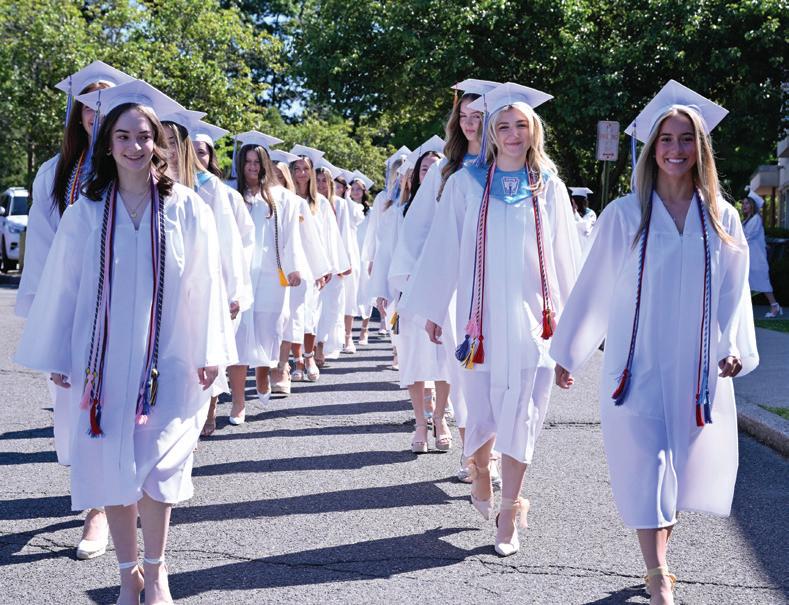
recognizes student achievements through ten national honor societies and offers more than 60 clubs and activities and 16 athletic programs.
Students regularly put their faith into action by serving their community and ministering to those in need through an array of service opportunities. “Service at IHA isn’t just something that’s required; it’s a central part of who we are,” she says.
Landmark College opened in 1985 and has been revolutionizing education for students with learning differences such as dyslexia, ADHD, autism and executive function challenges ever since. Here are ten ways Landmark’s support programs are unlike any others:
Multiple Academic Paths. Students choose from on-campus and online options at every stage of learning, from bachelor’s and associate degrees to high school dual enrollment and summer programs for college and high school students.
Diagnosis-Specific Supports. Comprehensive supports (including advising, executive function coaching and social pragmatics) help students identify strategies for their learning profiles.
Therapy Dogs. We don’t just bring dogs to campus for final exams. They’re here each week to provide support, companionship and comfort.
Centers for Diversity & Inclusion Every student is part of a campus culture

that’s welcoming and supportive.
The sense of community within the building is unmatched, and lasts long after students graduate. “By setting their hearts on IHA, our students say to the world that they’re ready to become compassionate and empowered young women in control of their own futures,” Carroll says. “The sisterhood cultivated at IHA is enduring, and the bonds formed here last a lifetime.”
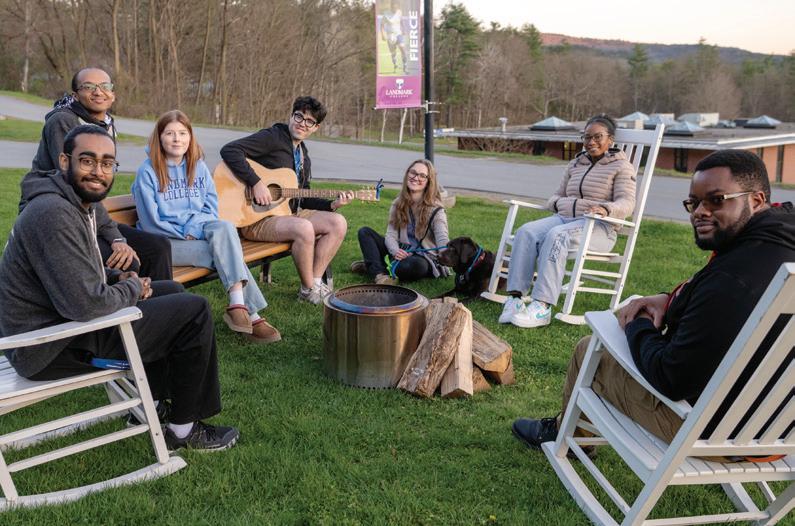
Tax Savings. Our educational focus means many families qualify for significant federal medical tax deductions.
Perspectives in Learning. LC’s unique first-year course encourages students to research and understand their diagnosis – then present their findings and begin self-advocating.
Universal Design. Classes are taught in a variety of ways, including visually, auditorily and kinesthetically.
Careers & Internships. LC works with employers worldwide to support neurodivergent students in becoming career-ready and building connections.
Study Away. Travel with a twist on LC’s 3-week, faculty-led trips centered around a theme, journeying to destinations around the world.
Landmark College Institute for Research & Training (LCIRT). Students can intern and gain experience in many areas of research and advocacy.
Newmark K-8 School and Newmark High School are state-approved, private, not-for-profit schools that meet the needs of children with autism spectrum disorders, mood and anxiety disorders, attention issues and other developmental disabilities. Newmark Education provides a nurturing, highly structured educational environment to help students become independent, productive adults. “We’re committed to the academic and personal success of students living with behavioral disorders and disabilities,” says Cynthia Allman, co-executive director and cofounder along with Dr. Regina M. Peter. “The foundation of every student’s achievement is an individually-tailored curriculum that infuses coursework with technology and social skills.”
Newmark provides academic and mental health services that set students on the path to succeed both academically and socially. Academics are enhanced by developing pro-social student behaviors and teaching
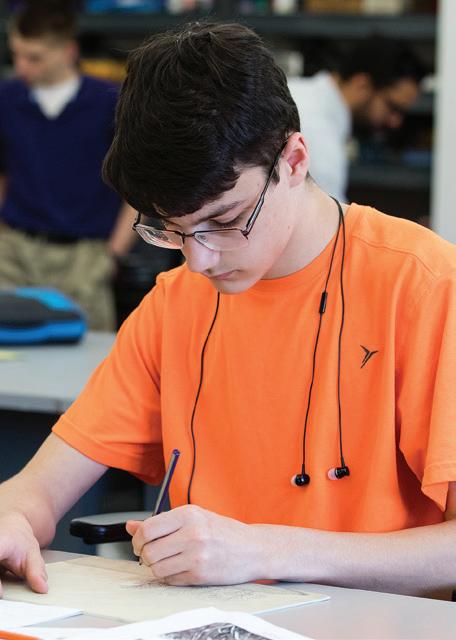

responsible decision-making in a sensitive, compassionate and nurturing environment. “The Newmark family comes together to educate and encourage the best parts of who our students are as human beings,” Dr. Peter says. The school builds community with events like family fun days and school spirit week, community service opportunities and quarterly student socials. The high school
147 CHESTNUT RIDGE RD.,
Ask Saddle River Day School Director of Admissions Geoffrey Bowman how he sees his students and these words are top of mind: Innovators. Thinkers. Leaders. The school “empowers students with the tools, space and encouragement to find their passions and thrive,” Bowman says. “The result? Graduates who own their future.”
SRDS was founded in 1957 and offers a Lower School (Pre-K3 to grade 4), a Middle School (grades 5-8) and an Upper School (grades 9-12). Bowman says the school differentiates itself by balancing the familiarity of a small school with the programmatic slate of a big one. “Families love SRDS because of our rigorous academic program and because of our warm and caring community,” he adds. “We live our core values of Everyone Counts, Love of Learning and Intellectual Risk-Taking.” In recent years, the school has launched a number of new programs and initiatives such as the Upper School honors research
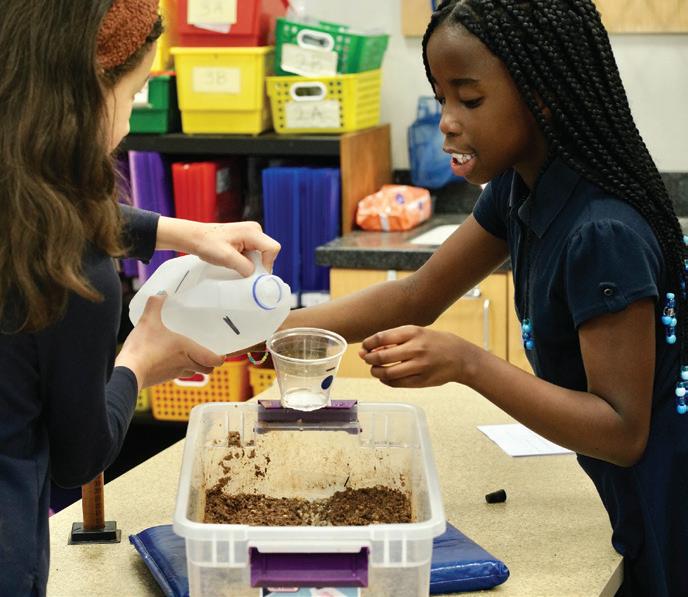
athletic program includes soccer, winter and spring track, bowling and cross country, and students at both schools can participate in extracurricular clubs ranging from computer science and coding to BBQ Cooking and LEGO Challenge. “Many parents express how grateful they are for our school and tell us that Newmark has truly changed their child’s life,” Allman says.

program (Gateway Diplomas) allowing seniors the opportunity to differentiate themselves in the college application process, a year-long Capstone Research Project for middle schoolers and an entrepreneurship program for Lower School students.
Education here focuses on “cultivating an entrepreneurial mindset” with the school’s Center for Innovation and Entrepreneurship
offering programs in business, graphic arts, videography, engineering and computer science. In addition, 30+ AP and honors courses are taught in grades 8-12 for qualified students in addition to 30 no-cut sports teams, clubs and musical/theater groups as well as many extracurricular activities for all ages. “Learning doesn’t end at 3 pm,” Bowman says. “Not for innovative thinkers and leaders it doesn’t.”
The hallmarks of The Wardlaw+Hartridge School are academic rigor, athletics and visual and performing arts—and above all, how the school educates the whole child.
The school was founded in 1976 as a merger of two schools with roots tracing back to the late 1800s, and has evolved into a co-educational, college preparatory day school serving students in Pre-K through high school in three divisions.
The school’s small class sizes allow educators to make personal connections with each student.
“We say that our teachers are ‘not the sage on the stage but the guide on the side,’ and we take immense pride that no student gets lost here,” says Director of Admission Gerard Gonnella. “Our students aren’t here to memorize facts— they’re here to engage in active learning.”
The Wardlaw+Hartridge School is proud of its 100 percent matriculation to
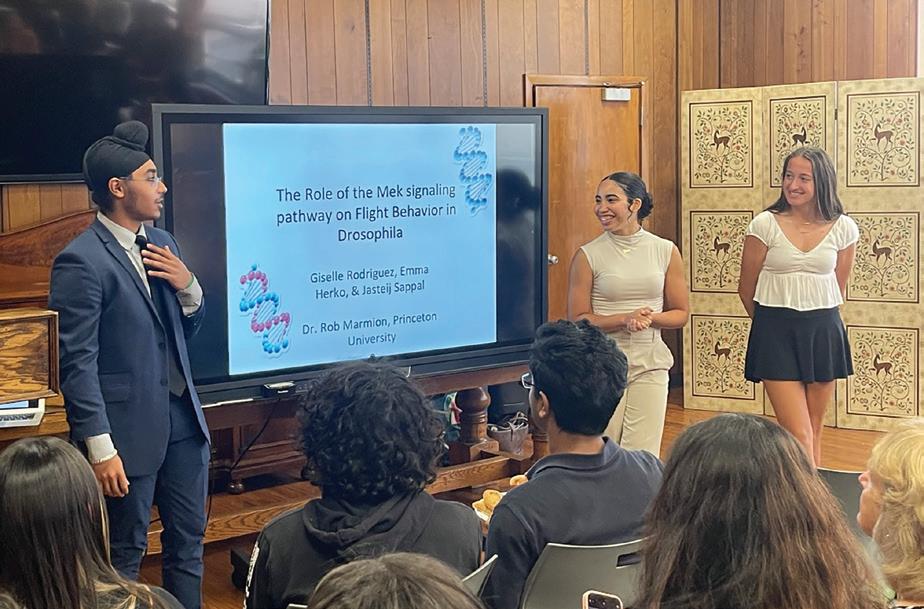
top-tier colleges and universities.
“Our students know that when they sit down at the lunch table that they might be dining with kids from China, India or Singapore—and they appreciate working collaboratively with students who have different traditions and backgrounds,” he says. “We equip students with important skills like critical thinking and problem solving, as well as the ability to debate or
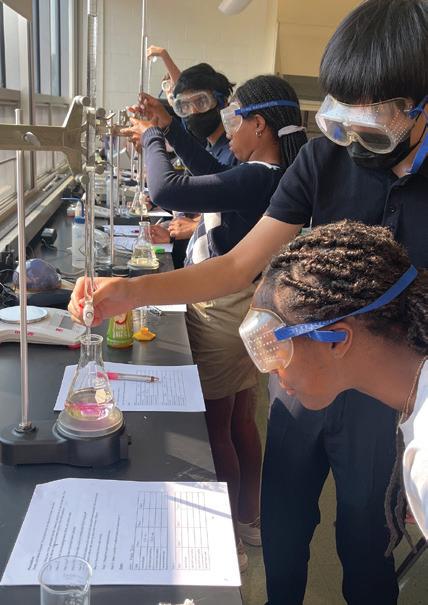
Taccept criticism.”
The school’s state-of-the-art facilities include an indoor pool, fitness center, two artificial turf fields and performing arts center. Nearly all students regularly perform community service.
“We’re committed to teaching students to have the courage and character to shape the future of our world,” Gonnella says.
1150 POTTERSVILLE RD., GLADSTONE • 908-470-9500 • WILLOWSCHOOL.ORG
he Willow School empowers students to better understand the world and make a difference. At Willow, students learn joyfully, care for the natural world and practice Aristotelian virtues, which inform every part of the school’s curriculum and community.
What sets Willow apart is the interweaving of ethics into all aspects of student life for its preschool through eighth graders, as well as the school’s focus on sustainability. The school’s offerings for its youngest learners continue to grow; last year Willow added a third preschool class, and this year a second kindergarten class to meet demand.
“Parents value our commitment to outdoor education and focus on learning within and about the natural world, as well as our student-centered experiential learning and our virtues program,” says Head of School Francisco Ayala. “Willow virtues—like respect, responsibility and honesty—form a shared language and ethos that help us collectively raise deeply
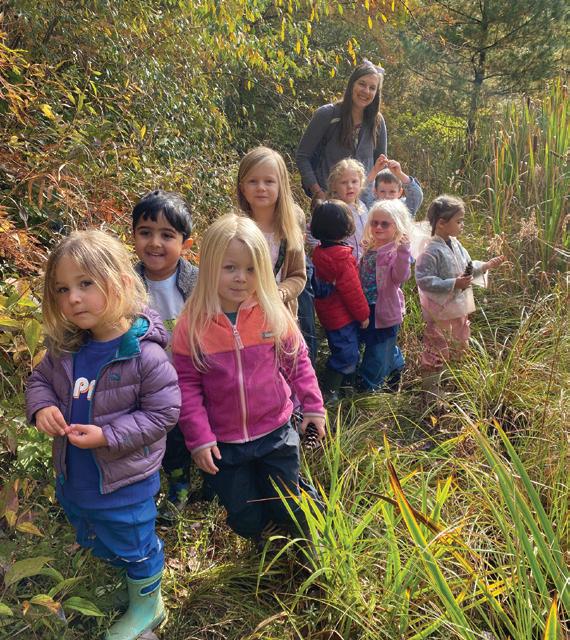
good and ethical children.”
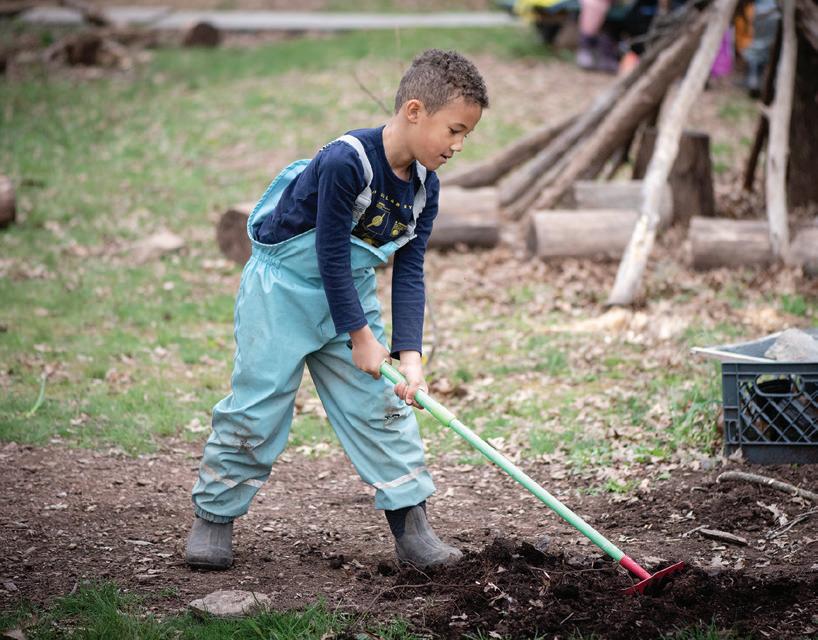
Students, parents and faculty work together to fulfill the school’s mission as a close-knit community. Twice weekly, Morning Gatherings bring the entire school together to reflect on the virtue of the month.
In middle school, students benefit from mixed-age social, educational and
leadership opportunities. The program was recently enhanced with new thematic units and experiential learning opportunities in topics such as STEM and ethics.
“Our mission is to graduate students who believe in themselves as positive change-makers based on a foundation of stewardship, creativity, integrity, curiosity and responsibility,” Ayala says.
Struggling to find a supportive environment that meets your child’s learning needs? Winston Preparatory School New Jersey, located in Morris County, offers an individualized learning environment for students ages 8-21 with learning differences, such as dyslexia, ADHD and nonverbal learning disorder (NVLD).
We believe what matters most is developing a deep understanding of how your child learns and creating the right environment to help them reach their full potential. Before they spend their first day at Winston Prep, our faculty has spent weeks designing an academic program for your child’s specific needs. Unlike any other school, Winston Prep groups students based on their learning di culty, skill level and educational and social-emotional needs.
Our students experience extraordinary transformations in their lives and learning. Winston Prep’s high school graduation rate is 99.7 percent.
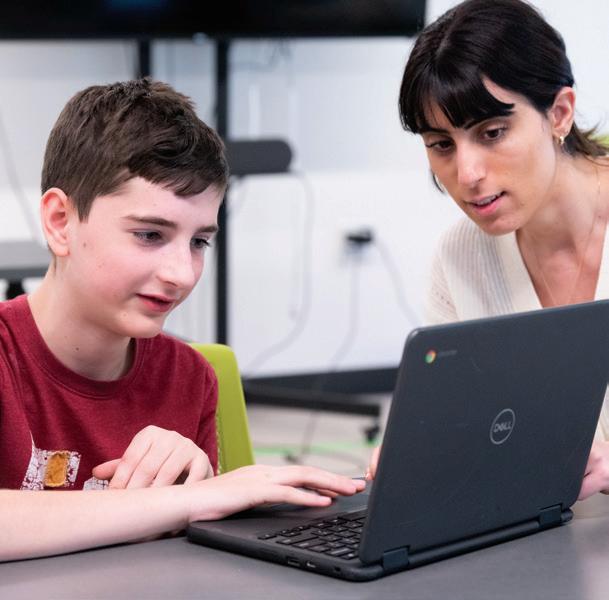
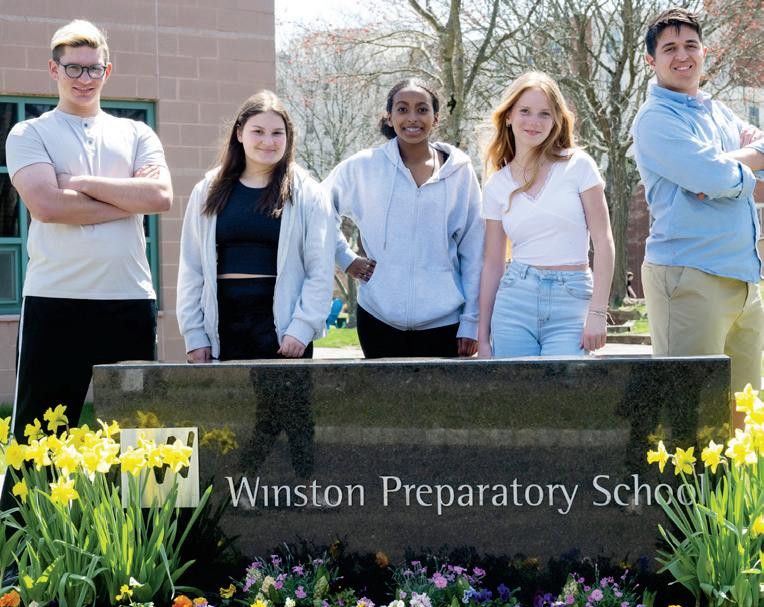
Approximately 80 percent of Winston Prep graduates attend college, while 20 percent move on to transitional, vocational or post-secondary programs.
Winston Prep’s innovative Focus Program is a key part of our researchbased teaching method. Our expert teachers work one-to-one with students every day to address areas of greatest need, to help them develop their own



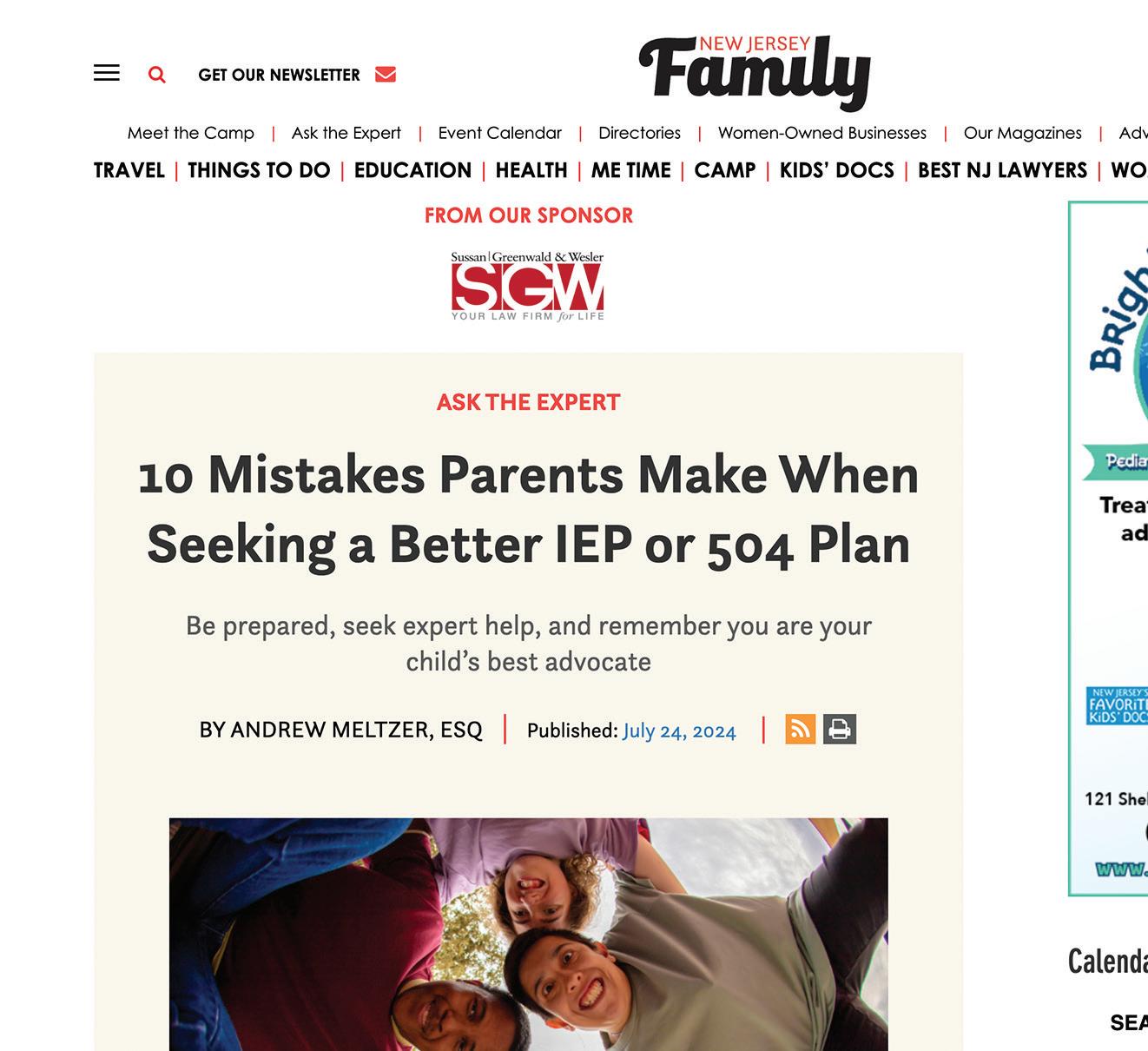
understanding of how they learn and to nurture their unique strengths and help students fully take advantage of them.
Winston Prep NJ accepts students on a rolling basis throughout the school year. Register for an Open House today at winstonprep.edu/open-houses, or contact Meredith Fisher, Director of Admissions, at mfisher@winstonprep.edu for more information.


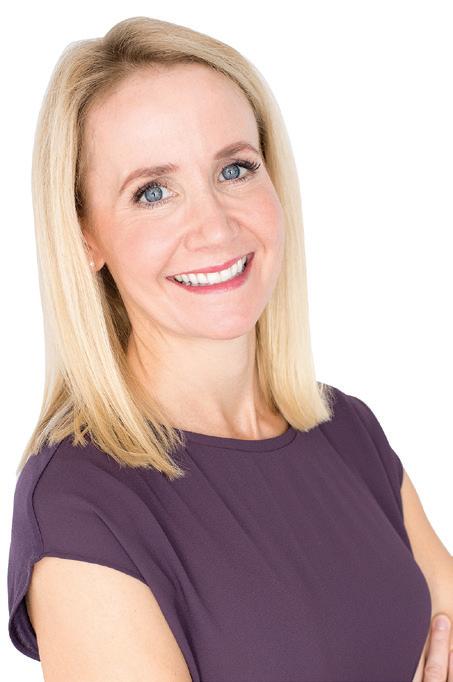
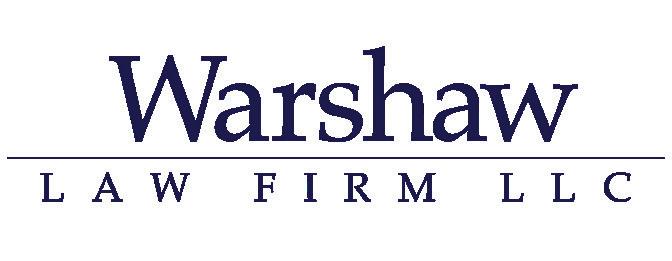



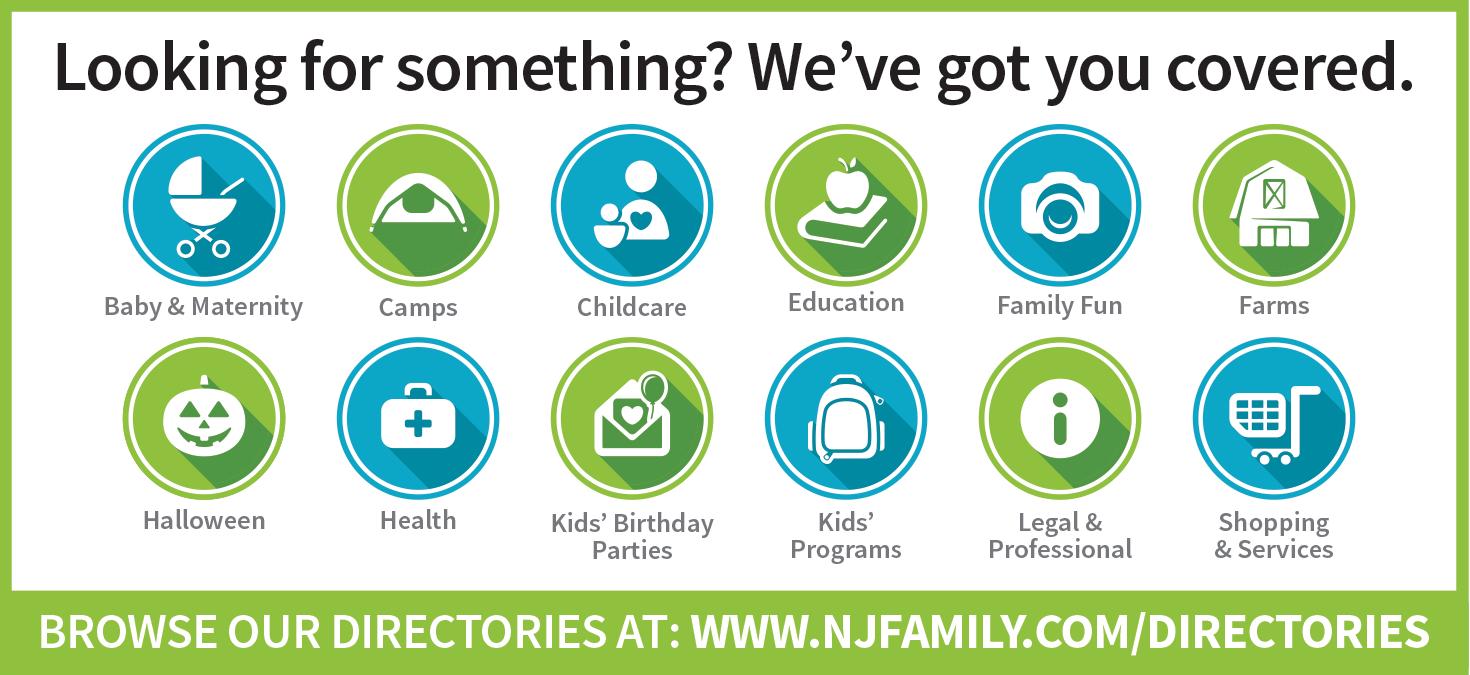
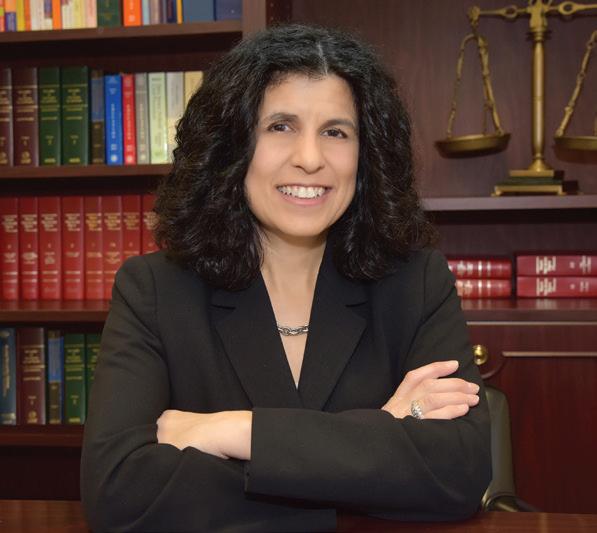






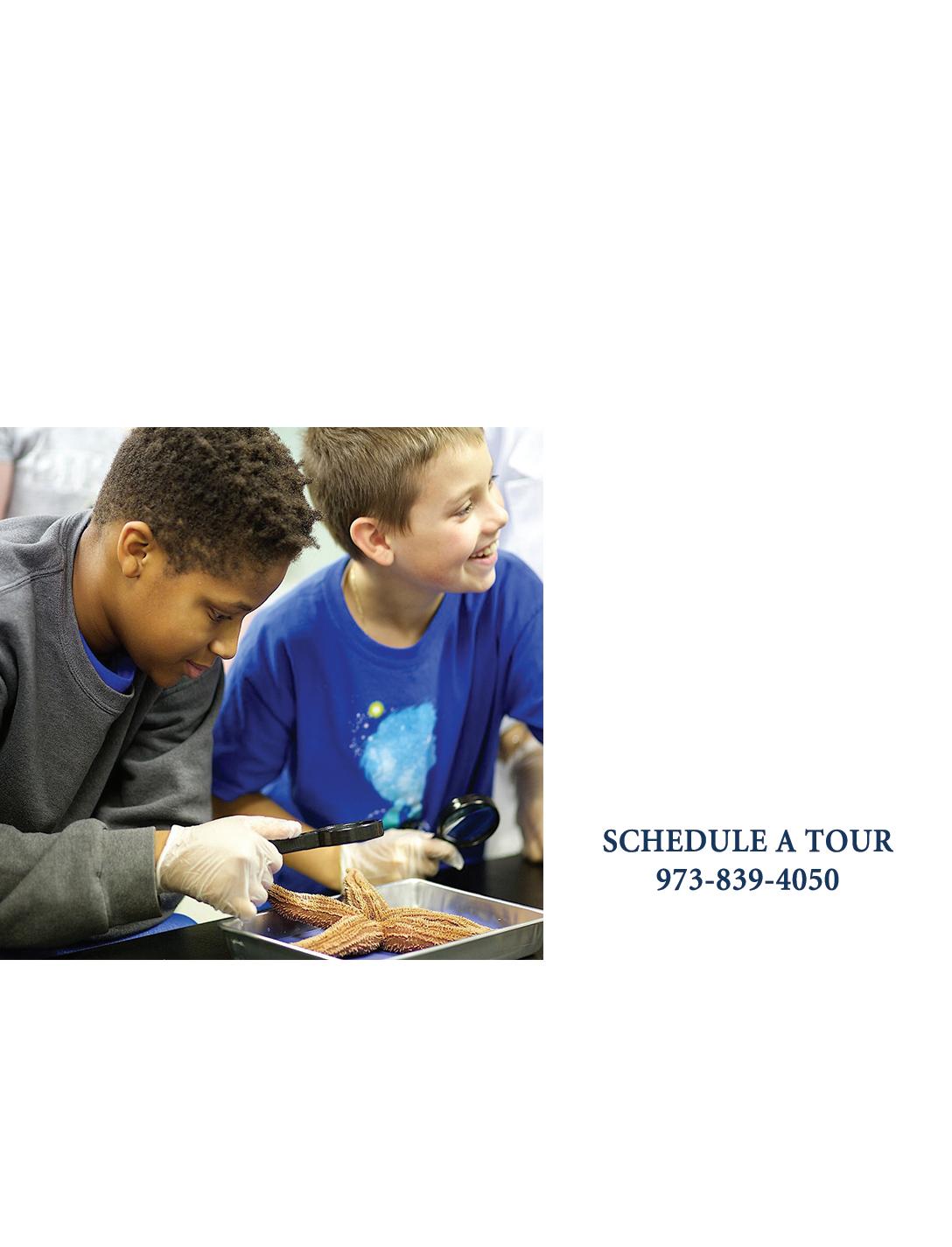


Thinking of sending your kid to private school? Read on.
TBy JENNIFER KANTOR
he reasons parents consider private school are many: smaller class sizes and individualized academics, first-rate facilities and well-funded extra-curriculars, family tradition and a preference for a faith-based education, plus any number of things that are uniquely personal to each family. If you’re thinking about making the leap from public to private, here’s what admissions professionals would like you to know:
Private schools welcome all perspectives and backgrounds— racial, religious and economic. “No matter your background there is a best-fit independent school with incredible programs, faculty, and support systems that can’t wait to meet your family,” says Sarah Ellerton, director of Admission and Financial Aid at Morristown Beard School. “There isn’t a certain ‘type’ of student or family that we’re looking for.”
“If you want a nurturing Montessori school and your spouse wants a traditional, religious education, someone—usually the child—will end up unhappy,” says Ellerton. “Having every member of your family on the same page from the start will save you time, money and energy through your search.”
Emi Ithen, the director of Enrollment Management at Far Brook School in Short Hills, advises parents to think about what they believe school should be, whether that means creative, self-directed inquiry, or a heavy focus on athletics. “The right environment can make a big difference in a child’s school experience,” she says. How to know? Ithen suggests parents directly ask a prospective school what learning looks like there. “This will give you a sense of whether the style focuses on rote learning, a hands-on approach, or perhaps a combination or something entirely different,” she says.
Independent schools absolutely want you to come check them out. Attend all the open houses, and tour as many schools as possible to get a sense of each school’s approach and philosophy. “There are
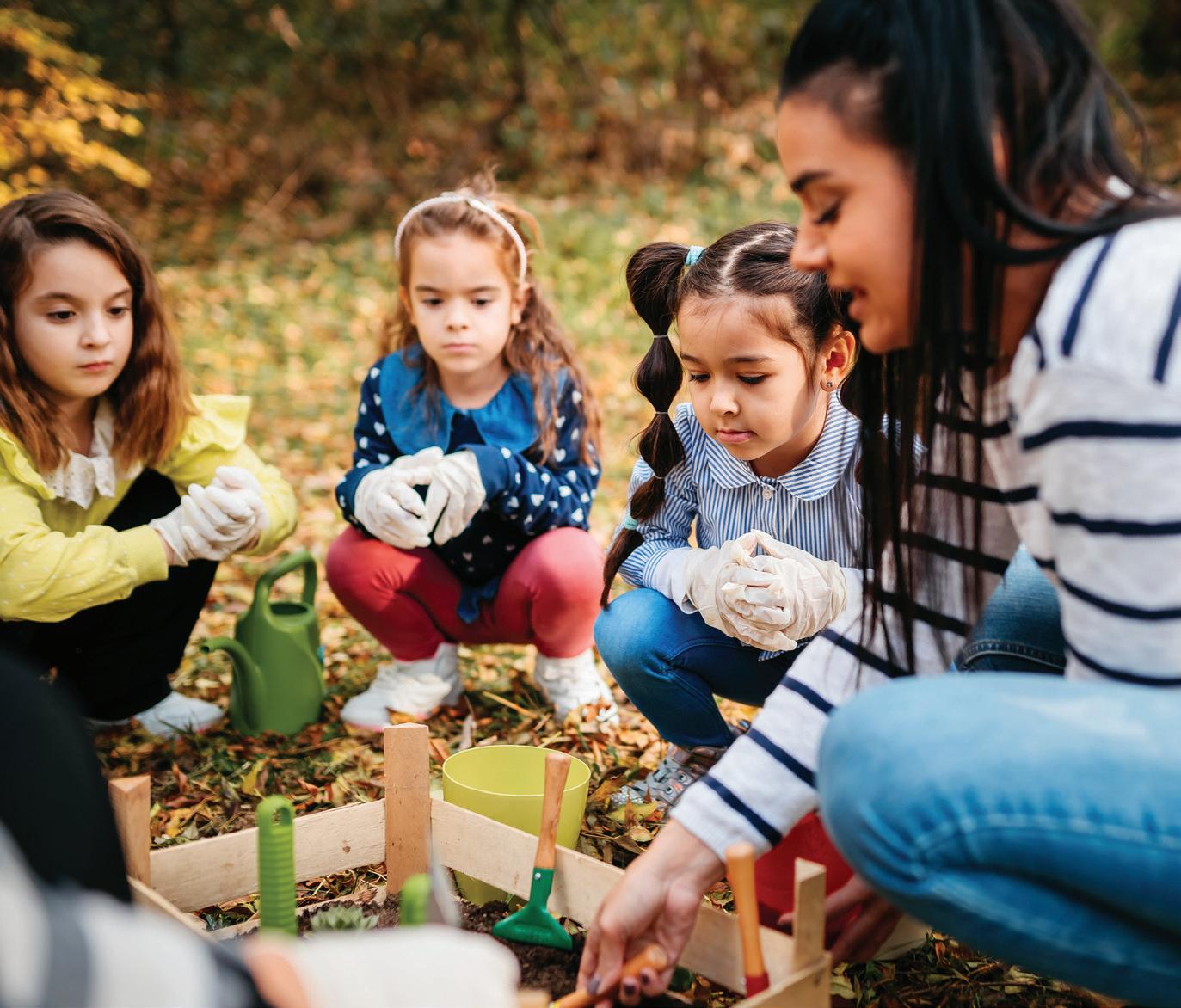
things that you can observe on your tours to get a sense of a school’s style and approach,” says Ithen. “Do the kids look focused and engaged? Happy and social? Is touted diversity actually reflected in the classroom? If the arts are emphasized, look at the walls— you’ll see a variety of projects displayed with care. Learn to read the clues: for example, a traditional school will likely feature desks in a row, while a progressive one might have a more collaborative arrangement. Look for glimpses of values that are important to you as a family,” she adds.
“We understand how daunting this process can feel, and appreciate the time, energy and thought that families put into the school search and application process,” says Alexis Sommers, director of Admission and Financial Aid at Newark Academy in Livingston. Schools consider a number of factors regarding who gets in or not, and it’s not necessarily personal. They’re looking for fit, sure, but also balance. “We don’t view our role as gatekeepers but rather as community builders, so we’re looking to get to know each student and family on an individual level and approach our admission decisions from a place of class building vs. fitting certain criteria,” she says. So, if your child doesn’t get accepted, know that it’s not because of something your family did or didn’t do.
Philip J. Solondz Preschool at TEMPL E BET H SHALO M
ALL PROGRAMS ENROLLING NOW Contact us at 973-992-6546 or preschool@tbsnj.org
Philip J. Solondz Preschool at TEMPL E BET H SHALO M
ALL PROGRAMS ENROLLING NOW
Infant Care Program
Ages 3-12 months
THE E. ZOLLER & FAMILY NURSERY CENTER
OPENING SEPTEMBER 2024
Brand new, state-of-the art facility Low student-to-teacher ratio Loving & skilled teachers Warm & secure environment Encouraging socialization & exploration
Preschool 18 months - 4 years
Creative & Dynamic Curriculum, Play Based Learning, Fine & Gross Motor Skills, Interactive In-school Specials, Kindergarten Readiness, Indoor Play Structures, and After School Enrichment Programs
Camp Addye
18 months - 3 years
Sports, Yoga, Science, Gardening, Art, Water Play, and much more!

Toddler Time 18 - 24 months with caretaker Sports, Yoga, Science, Gardening, Art, Water Play, and much more!
tbsnj.org | State Licensed Before & After Care Offered for All Programs Temple Beth Shalom 193 E. Mt. Pleasant Ave., Livingston, NJ




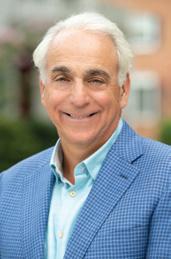
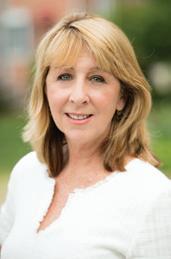
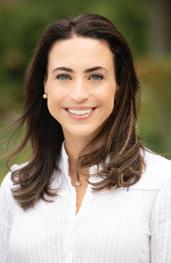
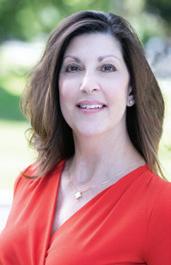
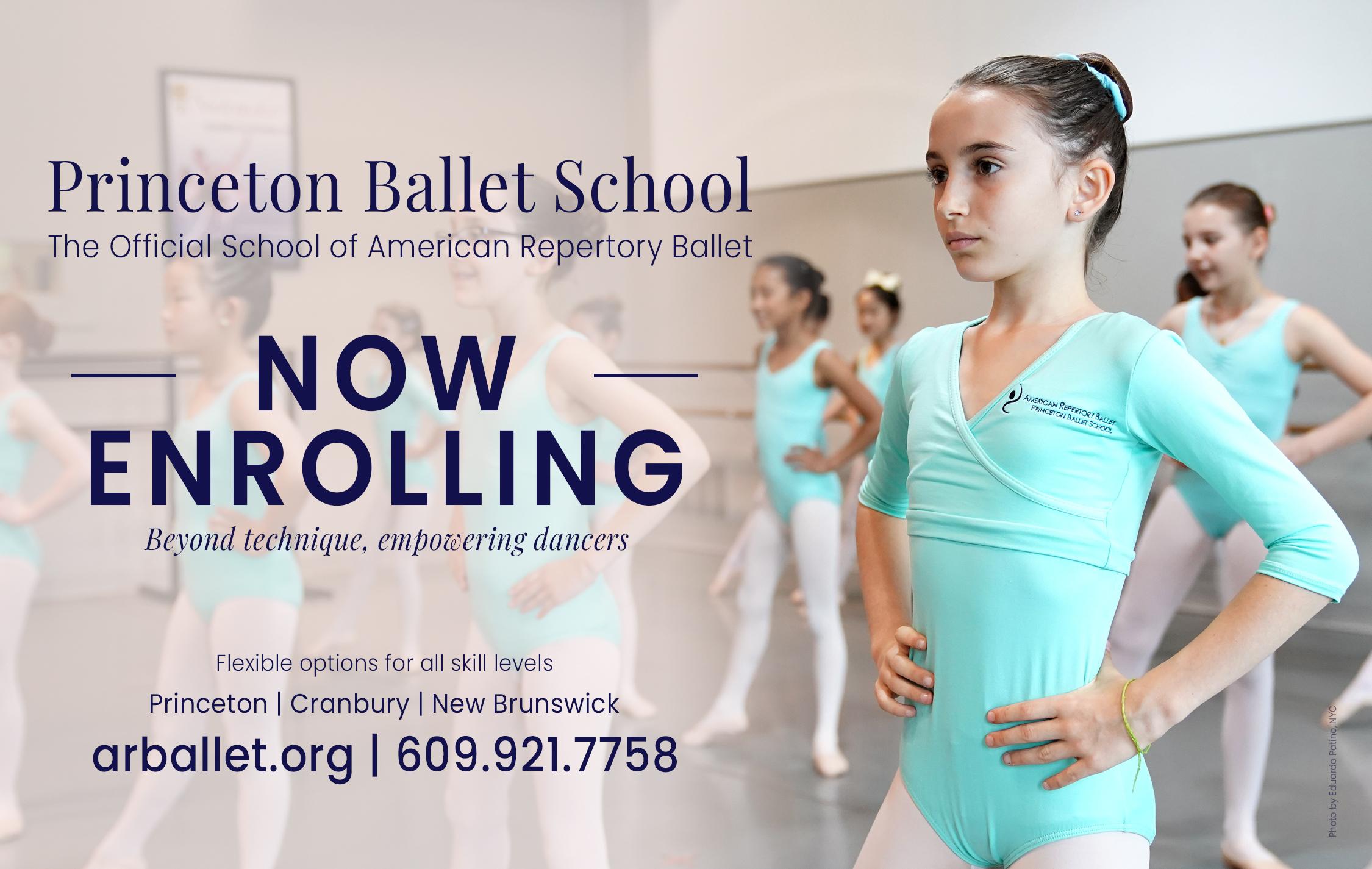

Single sex, co-ed, boarding or religious? Be open-minded in your search. In particular, faith-based schools in NJ aren’t just for students of one faith and typically offer a traditional, values-based education that parents from various backgrounds appreciate. “For many of us, diversity is our strength and we welcome students from all religious backgrounds into our school communities,” says Jane Bowman, director of Admissions at Union Catholic High School in Scotch Plains.
Like independents in general, religious schools have the flexibility to truly customize curriculum, something that goes beyond the classroom, and “students are able to truly take charge of their learning experiences and delve into areas of interest unique to them,” she says.
The best part? Faith-based schools tend to be budget-friendly and scholarships can be generous. For many families, learning about theology (even in a different faith) is an added bonus to an excellent and affordable education.
“Many independent schools offer a lot of the same things (personal attention, small class sizes, excellent college list). However, there are many unique differentiators that parents should look for when researching schools. One differentiator is community— how the members of the school interact with one another—and you, as applicants,” says Alyson Waldman, director of Enrollment Management, Admissions, and Financial Aid at Montclair Kimberley Academy.
These will be your people for years to come. Do you feel warmly welcomed? Do you feel this way each time you visit? If every person you spoke to recommended the same thing, talk to current parents. Not sure how to connect? Schools facilitate all sorts of conversationfriendly events, and some (like Far Brook) have integrated a web chat
feature called PeerPal that enables unmonitored, parent-to-parent discussions with just a click. Or reach out to admissions personnel. “We are always happy to connect prospective families with current families at any point during the process,” says Ithen.
Private schools tend to engender love, loyalty and lifetime support from alumni. “Private school communities go well beyond one’s years as a student,” says Bowman. “The alumni networks that individuals enter upon graduation are often quite robust and active in a way that is unique from public schools, continually offering opportunity, connection and a common ground.” The parent network is pretty great, too.
There’s a stubborn belief that only students from wealthy or lowincome families can opt for an independent education. “This is a big misconception and one that we’re actively trying to dispel,” says Sommers. Historically this may have been the case, but more and more, schools recognize that having enough isn’t necessarily enough to pay for private school, and true diversity includes economic diversity. For example, at Newark Academy, need-based financial aid also supports Newark Academy students who come from relatively higher-income ranges. “Families are often surprised to hear that roughly 57 percent of our awards for the 2024-2025 school year are going to families earning $150K and above,” she says. So while lower income families may get a full ride, even middle class families may get enough aid to enable paying for a private school. The takeaway: That dream school may be a reality for your child.
—Jennifer Kantor is an education, parenting and lifestyle writer and a Maplewood mom of two.
/ ABLEIMAGES
60 YEARS OF EXCELLENCE IN


“where great smiles begin”
It is our mission to provide the highest quality orthodontic treatment in a warm, nurturing environment. We strive to create beautiful smiles through individualized treatment, in which our patient’s comfort is our highest priority. It is orthodontics with a mom’s touch!
• Consultations are Always Complimentary
• Most Insurances Accepted
• No Down Payment and Interest Free Financing


Melissa Roberto, DMD
Orthodontics for Children & Adults
141 US Hwy 46 West #101 Rockaway, NJ 973-298-5900 www.rockawayortho.com

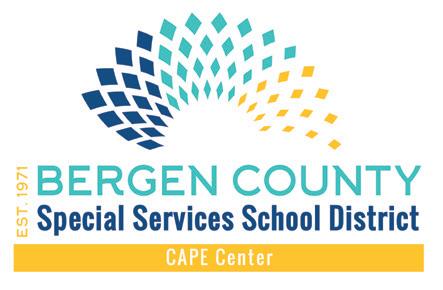
Bergen County’s Premier Resource Center
Providing Information and Referrals for Individuals, Families, and Professionals
We can help you access information regarding:
• Developmental Disabilities Resources
• Transition Planning Information
• Recreational Programs/Summer Camps
• Mental Health Services
We offer workshops for professionals and parents on a variety of topics related to disabilities, as well as sponsor monthly Parent Support Groups
For a complete list of current workshop offerings, visit http://bcss.bergen.org
Nicole Fried, Psy D , Supervisor 540 Farview Avenue, Paramus, N.J. 07652 201-343-6000 Ext. 4067 / nicfrie@bergen org
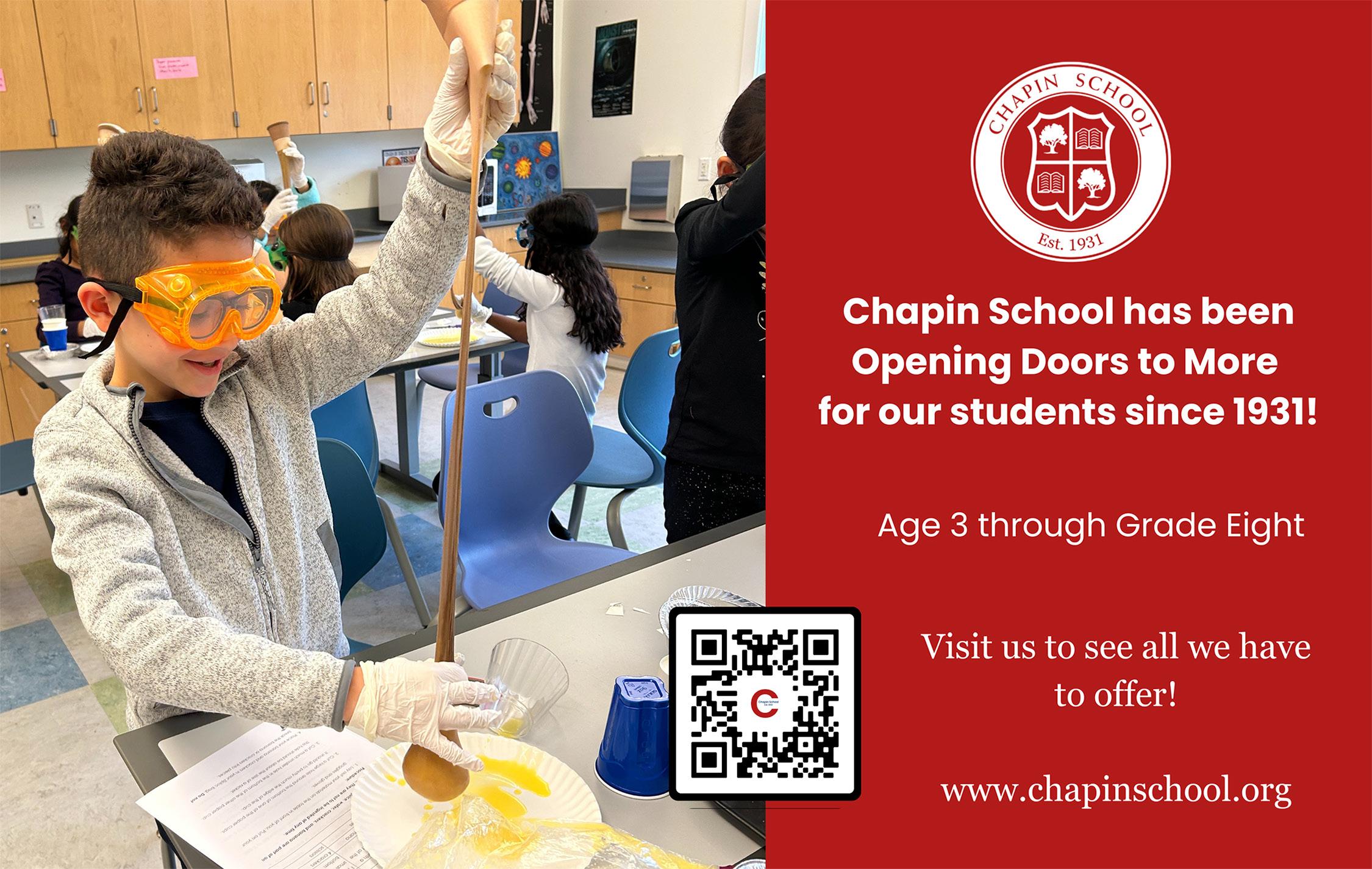

9 ways to help kids with ADHD get organized (and stay that way) this school year
By KERRIE MCLOUGHLIN
f you have a child with ADHD, you’re no stranger to the struggles that come with it. School can pose more challenges when a child juggles personal organization, getting homework done and keeping track of paperwork.
If your child is stressed trying to keep up with everything school demands, try these tips for a much-needed reset. Let them take ownership. Your child won’t keep up with any system they didn’t help to create themselves. One mom of three shared, “… your kid needs to do what works for them.”
Make a fresh start … every month. Begin with a massive cleaning session to clear out clutter. Empty the backpack, closet and bookshelves. Put monthly cleaning sessions on the calendar.
Limit choices and decision fatigue. Consider that less is usually more. One pocketed folder might work better for a class than a binder with too many tabs and pockets.
Buy color-coded supplies. Choose colored binders with clear front and side areas for easy labeling. Staples has colored 2-inch binders with a large, attached pocket. More supplies to consider: Post-It Notes and tape flags in various sizes and colors.
Tame paper explosions. Have your kid keep a small notebook for jotting notes and transfer the little jots over to that one spot in a
timely manner. This goes for notes created on phone apps as well. If reminders aren’t put in the right place, they are lost forever.
Work that planner! Have your child commit 15 minutes each night preparing for the next day, and that includes reviewing and thinking about what could have gone differently. Rebelling against the planner is normal; create rewards for sticking with it.
Handle homework. A spot designated just for doing homework is key. No phones or other distractions are allowed. Start with the most di cult subjects first and take frequent activity breaks.
Do things in small chunks. Try setting a timer for 15-20 minutes and then allow them to get up, move around and come back to it.
Have a place for everything. Once homework is done, get them into the habit of putting their binder or textbook back into their backpack. Keep the backpack in the same spot all the time. File papers using a system that makes sense for you.
You can help make school more exciting for your ADHD kid by teaching them organization skills and how to work with teachers for long-term success. The biggest added bonus? You’ll be helping them build skills and good habits they can use for life.
—Kerrie McLoughlin (TheKerrieShow.com) is a mom with ADHD, and color-coding her five kids has been the solution to many challenges.
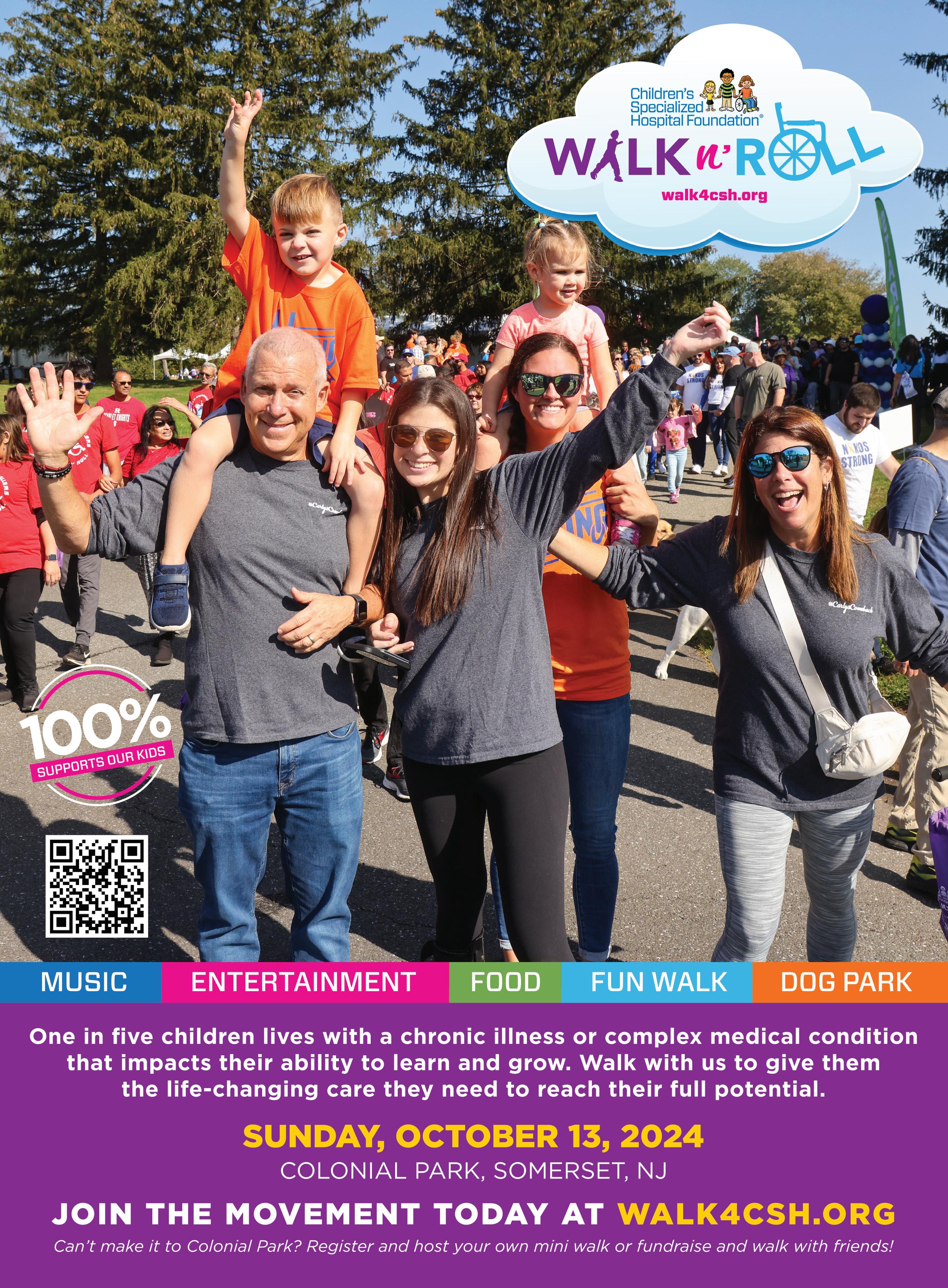
From tutoring to extracurriculars, these spots will keep the kids learning year-round!
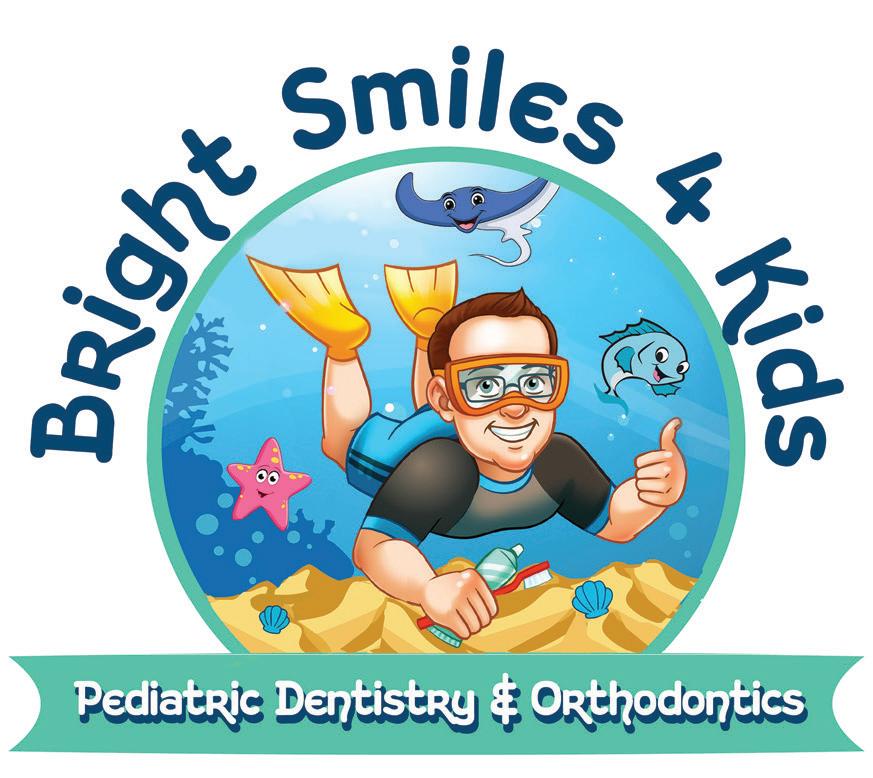
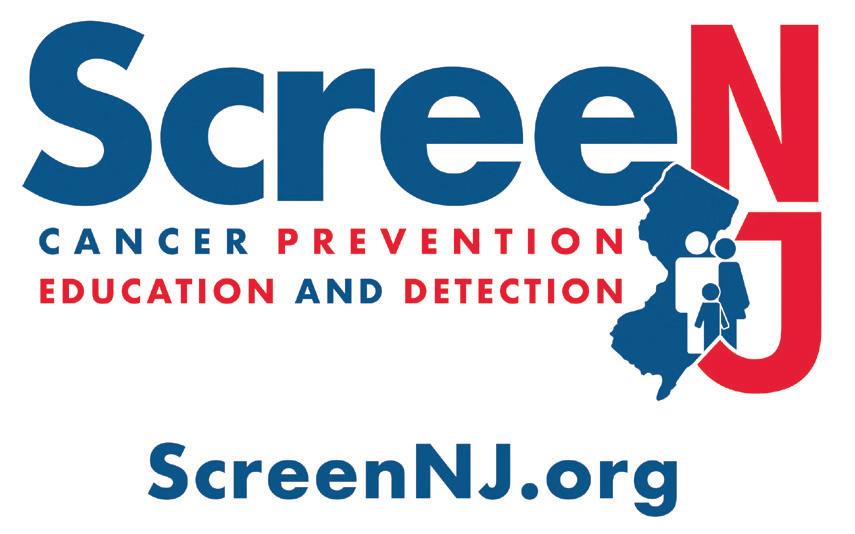
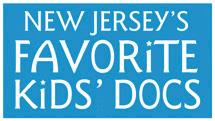











Choosing enrichment and extracurricular activities can be overwhelming given all the choices for our kids. But when selected with care, these programs can spark interest and creativity and expand upon the lessons they’re learning in school. From core subjects to the arts and beyond, we’ve rounded up a range of enrichment options for just about every interest.
ENGLISH & MATH
AlphaMinds Academy
Hoboken, Jersey City, Union City, Weehawken and online alphamindsacademy.com
With classes in logic, mathematics, reading, essay writing, chess, robotics and coding, experienced instructors help pre-K kids to 11th graders
excel academically and cultivate new skills and interests. Russian instruction and STEAM programs are also offered.
CAMathories
Summit camathories.com
There are a series of books and teaching plans that blend logic (math) and folktales (literacy) along with culture to expose your kids to a host of new ideas.
Chatham Learning Center
Chatham cpfamilynetwork.org
Afterschool offerings include tutoring in math, reading, foreign language, writing and AP courses along with homework help and summer enrichment. There’s also SAT and ACT test prep, evaluations for students who are struggling academically, and Orton Gillingham
tutoring for those having di culty with reading.
City Kidz World Cranbury, Kendall Park citykidzworld.com
Classes teach reading comprehension, writing, grammar, punctuation and vocabulary for children ages 6-18. There are options as well for fiction writing, book reviews and journalism. An Honors program is also offered.
Eye Level Learning
Multiple locations myeyelevel.com
This group’s goal is to help foster independence, initiative and achievement through weekly math and English classes, daily homework and a mix of o ine and online learning.
Huntington Learning Center
Multiple locations huntingtonhelps.com
Kids from kindergarten through high school get one-on-one tutoring in math, reading, phonics, vocabulary, writing, science, study skills and test prep.
Multiple locations jeilearning.com
JEI’s individualized, workbook, self-learning-based model (sessions plus homework) includes classes in problem-solving, math, English, reading, writing, and critical and creative thinking.
KUMON
Multiple locations kumon.com
Kumon offers worksheetbased educational services for kids as young as 3 through high school. Strengthen their math

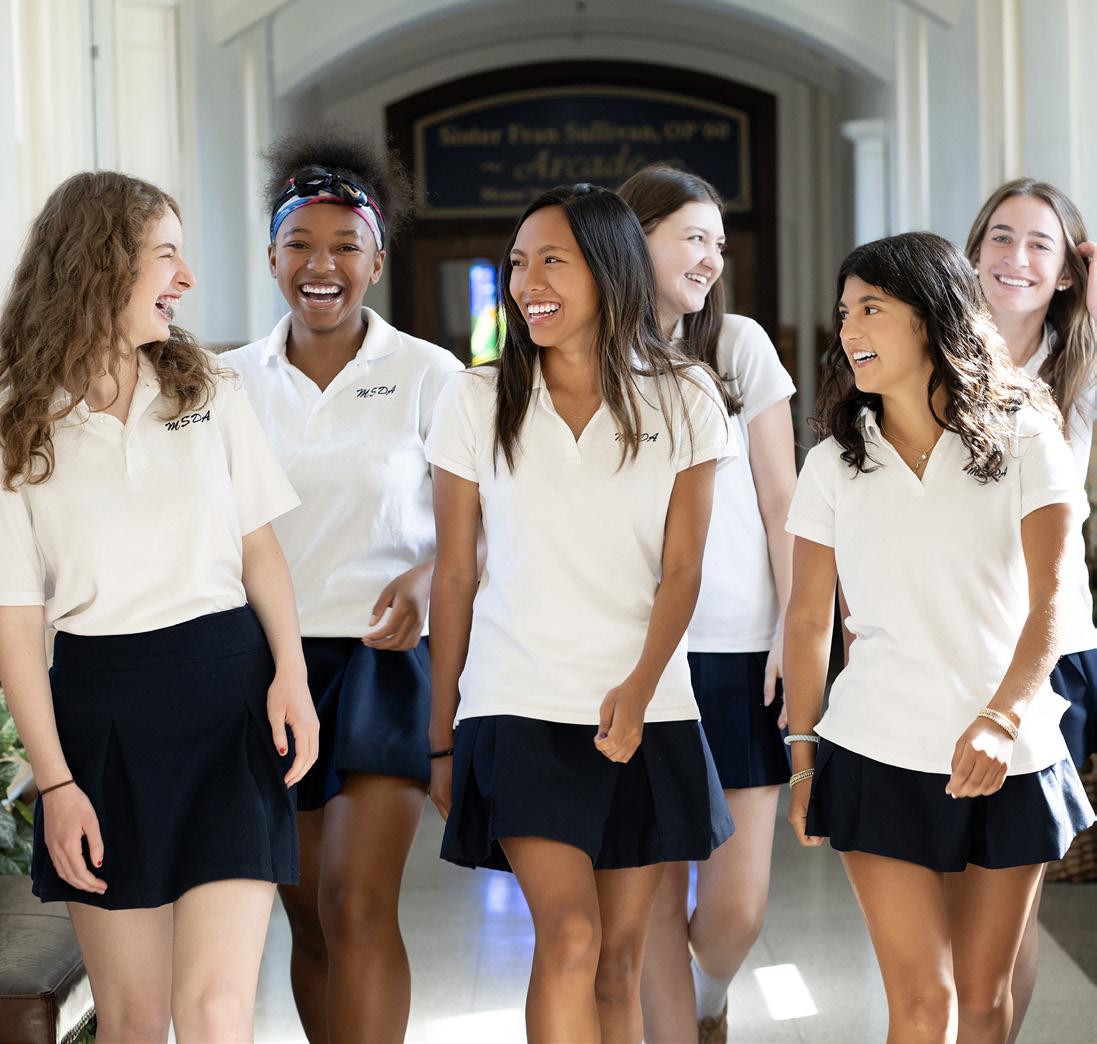

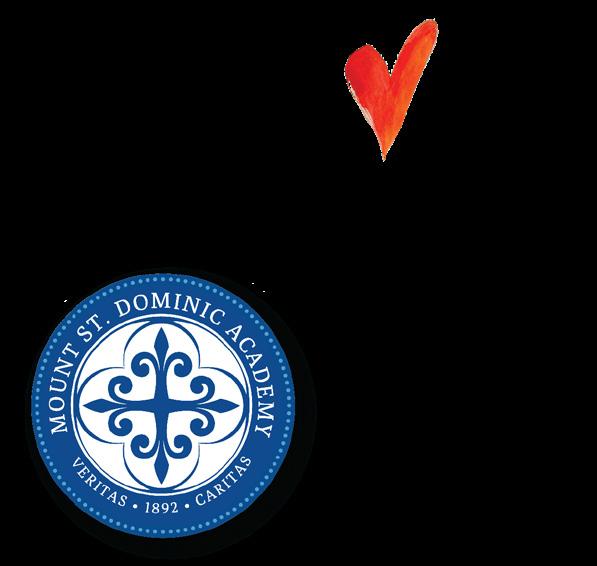
and English skills with two weekly classes featuring timed/evaluated worksheets, plus 20-30 minutes of daily homework.
Mathnasium
Multiple locations
mathnasium.com
Boost your K-12th grader’s knack for numbers with a methodical yet personalized curriculum designed to help those struggling improve and those who excel soar through a combination of mental, verbal, visual, tactile and written exercises.
Mr. B’s Beyond the Classroom
East Hanover
mrbsbeyondtheclassroom.com
Students from pre-K to grade 12 can get help, either individually, through tutoring pods or by calling the Homework Hotline. The goal is to spark the interests and needs of each student.
Write Now
Red Bank projectwritenow.org
Lit-loving kids, tweens and teens can workshop ideas, hone their craft and get constructive feedback amidst a supportive group. Older students can benefit from an internship program or help with writing college essays. Project Write Now also offers community outreach programs aimed at helping underserved groups develop writing and communication skills.
Sylvan Learning Center
Multiple locations
sylvanlearning.com
Sylvan offers custom tutoring in math, reading, writing and more, plus homework help and coaching to sharpen students’ study skills. Older kids can get AP class support, help with college essays
and SAT/ACT prep, along with tutoring geared toward higher-level skills.
Team Makers
Tenafly teammakersnorthjersey.com
Team Makers programs are designed to teach children to think outside the box, solve problems and gain new perspectives while playing games with other children.
The Writers Circle
Multiple locations writerscircleworkshops.com
From folktales to poems, weekly workshops aim to ignite a creative spark in storytellers in grades 3-12. Workshops are taught by authorinstructors to encourage students at every stage of their writing.
duCret School of Art
Plainfield ducretarts.org
The school’s mission is to provide a diverse, accessible and affordable visual arts education that promotes creativity and exploration so artists can find a voice in fine arts, illustration or
graphic design.
One River School of Art + Design
Multiple locations oneriverschool.com
Students have access to a unique method for learning art and digital design. There is a designated space for an exhibition program, where artwork is presented in school galleries to support the mission of teaching about contemporary art within the community.
Sharron Art Center
South Brunswick, Piscataway sharronartcenter.com
Students are given their own specialized curriculum to ensure they learn all the skills they need at their own pace. Instructors have pursued studies in fine arts programs. There are weekday and weekend classes offered yearround.
Urban Arts at Monroe
Hoboken urbanartsnj.com
Fine art classes here allow students to use visual arts as a vehicle for self-expression. In addition to art classes,
Urban Arts curates student art shows throughout the year.
Visual Arts Center of New Jersey
Summit artcenternj.org
Through exhibition, Studio School and community programs, the Art Center engenders connection, curiosity and creative risk-taking among its students.
Yard School of Art
Montclair Art Museum, Montclair montclairartmuseum.org
Classes include topics like drawing and painting, fiber arts, whittling, self portraits, meditative art, sequential monoprinting and Raku.
York Fine Arts
Princeton yorkfinearts.net
This art school provides students with a basis in classical technique and offers personal monitoring. Kids will learn the fundamentals of drawing and painting. Studio classes for pre-teens and teens give time to complete projects. Older teens can create their portfolio and prep for college.
Cultural Center for Language Studies
Newark cclsnj.edu
Using multimedia technology, CCLS encourages students to think and speak only in English. Both formal and everyday American speech are introduced in each lesson to serve as the basis for all subsequent classroom work.
Dynamic Language Services Haddonfield dynlanguage.com
This group specializes in personalized language coaching to increase conversation, vocabulary, grammar, pronunciation and listening comprehension skills in multiple languages.
Gain Ville Ho-Ho-Kus, Rutherford gaincontact.com
Kids from pre-K through high school can learn Spanish, Italian, French and Arabic at this center that uses a culturally authentic approach to learning a new language.
HudsonWay Immersion School
Stirling, New York City hwis.org
Native speakers help kids in preschool 2 through grade 8 navigate Spanish and Mandarin through foreign language listening, reading, writing and speaking.
Jump Immersion School
East Hanover, Edison, Scotch Plains, Summit jumpimmersion.com
Kids learn new language skills through discussions about historical figures, joining math or science clubs, practicing public speaking, attending morning meeting workshops and making crosscultural connections.
The Language Institute West Caldwell thelanguageinstitute.com
The instructors are native or native-proficient speakers
and professional teachers who use a communicative approach and a variety of techniques to accommodate each person’s learning style. Many languages, plus English as a Second Language and American Sign Language, are offered.
Language Workshop for Children
Montclair, Ridgewood languageworkshopforchildren.com
The Language Workshop offers one-on-one instruction featuring stories, songs and dialogue to get kids as young as 6 months old excited about learning French, Spanish, Italian or Mandarin.
Princeton Language Center Princeton berlitz.com
Kids and teens can choose to learn any of a half-dozen different languages (including American Sign Language) using the Berlitz Method, which requires learners to only speak and hear the target language.
Brightest Star School of
Performing Arts
Cedar Knolls, Long Beach Island, Morristown, Whippany brighteststarschoolof performingarts.com
This independent school encourages students to learn arts for life through vocal lessons, improvisation, memorization and dance.
Hunterdon Academy of the Arts Flemington hunterdonacademyofthearts.com
Music lessons are tailored to each individual student and are available on most instruments, including guitar, piano, drums, violin and voice, among others.
MarbleJam Center for Arts & Enrichment Hackensack marblejam.org
Instructional fine and digital art classes, creative arts therapies and educational enrichment programs are offered for all ages and abilities. Two new studios will accommodate private art therapy, music therapy and Heart Life Wellness programs.
Performers Theatre Workshop
Millburn ptwonline.com
Children can expand their skills when it comes to acting, singing, songwriting, dancing and playing musical instruments. There is a Swifties Series, master classes and lessons on music theory.
The Performing Arts School
Bergen Performing Arts Center, Englewood bergenpac.org
Arts education programs provide students with hands-on arts training by industry professionals. They gain real-world experience through opportunities to perform on bergenPAC’s main stage and throughout the county. Early Childhood classes give attention to kids 3 months to age 5 through their first introduction to music, dance and theater. Older kids can sign up for dance, theater and music.
Princeton Ballet School
Cranbury, New Brunswick, Princeton arballet.org
Princeton Ballet School is the o cial school of American Repertory Ballet. Dancers are involved in in-school residencies, community events, student matinee performances and specially designed class offerings.
The Shakespeare Theatre of New Jersey
Madison (Box O ce and Main Stage), Florham Park (Mailing & Administration) shakespearenj.org
The Shakespeare Theatre Academy offers teen classes in a wide range of disciplines connected with classic theater. The Student Matinee Series gives budding thespians access to Main Stage professional productions and Shakespeare LIVE! touring productions. Summer Shakespeare has a Playhouse for actors 6-12 or Shakespeare Corps for teens 10-18 who want to be part of a vibrant artistic community.
Taubenslag Productions North Brunswick
taubenslagproductions.com
A variety of fun-filled family entertainment options are offered, including professional touring children’s shows, Theater Week and Summer Theater Camp.
Westrick Music Academy
Princeton Junction westrickmusic.org
Home to Princeton Boychoir, Princeton Girlchoir and the Poco Voce class for first and second graders, Westrick also offers individual voice lessons for your budding songbird.
STEAM
AlphaMinds Academy
Multiple locations alphamindsacademy.com
Pre-K and kindergarten students can enroll in chess, logic, reading and phonics classes. Older students in grades 1-10 can enhance their skills in chess, coding, logic, math, reading, essay writing, and science
and engineering. A separate Russian School offers Mommy & Me Classes, logic and musical theater for kids from 2.5 to 15 years old.
Bits Bytes Code Computer
Learning Center
Madison bitsbytescode.com
Kids can learn how to type, code, build a computer or a robot, all while having fun.
Code Ninjas
Multiple locations codeninjas.com
Kids ages 7-14 can master coding skills at their own pace through a game-based curriculum. They’ll earn colored wristbands as they level up and create video games.
Codingal Online codingal.com
With 5 million students across 70 countries, Codingal is on a mission to build a worldwide network of afterschool programs for kids K-12 to learn coding. Lessons are designed to help them become creators, innovators and the entrepreneurs of tomorrow.
Little Ivy Academy
Multiple locations littleivyacademy.com
Creative kids in grades K-8 can design, build and program apps, video games, robots, digital inventions, dynamic websites, spy tech and digital movies.
KTByte Academy Online ktbyte.com
The progressive curriculum is broken down by level so students can go at their own pace for competitions, web development and even AI. They are taught coding basics, concepts, fundamentals of typed code, core concepts, abstract thinking, problem solving, data structures and algorithms.
Mad Science
Multiple locations madscience.org
Mad Science revels in hands-on classes in forensics, astronomy, magnetism, slimy stuff (chemistry) and other natural wonders. Interactive classes for students ages 5-12 will take them to the stars or teach them about engineering through LEGO building.
Montclair Learning Center Bloomfield mlcplus.com
Kids can have fun while learning chess, Minecraft, coding, robotics, engineering and video game technology. There is also a Girls Who Code program, Kodu Game Lab, plus makerspaces.
Robot Revolution Summit robotrevolution.net
Future engineers currently in third through 12th grades will learn problem-solving skills both in a cerebral logical method (programming) and in a physical way (mechanical engineering).
STEAM Works Studio
Multiple locations steamworksstudio.com
The academy is focused on fostering and developing essential 21st-century and STEAM skills such as problem-solving, critical thinking, creativity and collaboration. The curriculum ranges from robotics, 3D modeling and animation to website design, programming and practical electronics.
Expert tips for making the transition from middle school to ninth grade easier
TBy HEIDI BORST
he journey from middle to high school marks a significant milestone in a student’s education. It’s normal for teens making this transition to experience a range of emotions, from excitement and curiosity to nervousness and apprehension. After all, heading into a new environment comes with a host of challenges, including greater responsibility, increased academic pressure, new social dynamics and new routines and schedules.
Understanding and addressing these hurdles can go a long way toward making this time easier and setting the stage for a successful high school experience. Read on to learn about common challenges rising freshmen face and expert tips for a smooth transition.
First-year high schoolers experience a combination of new academic and social pressures, according to Harold Abraham, Ed.D., educational leadership professor at Montclair State University and the chief school administrator of Lebanon Township Schools.
High school requires a greater depth of study, more rigorous coursework and more homework. “Additionally, high school students are expected to exhibit greater independence and responsibility, managing their schedules, extracurricular activities and longterm academic goals such as college preparation,” Abraham says. Students also encounter a larger, more diverse peer group in high school—and with it, more complex social dynamics and peer pressure, says Abraham. “These changes require significant adaptation and can be stressful for students as they adjust to new expectations and environments,” he says.
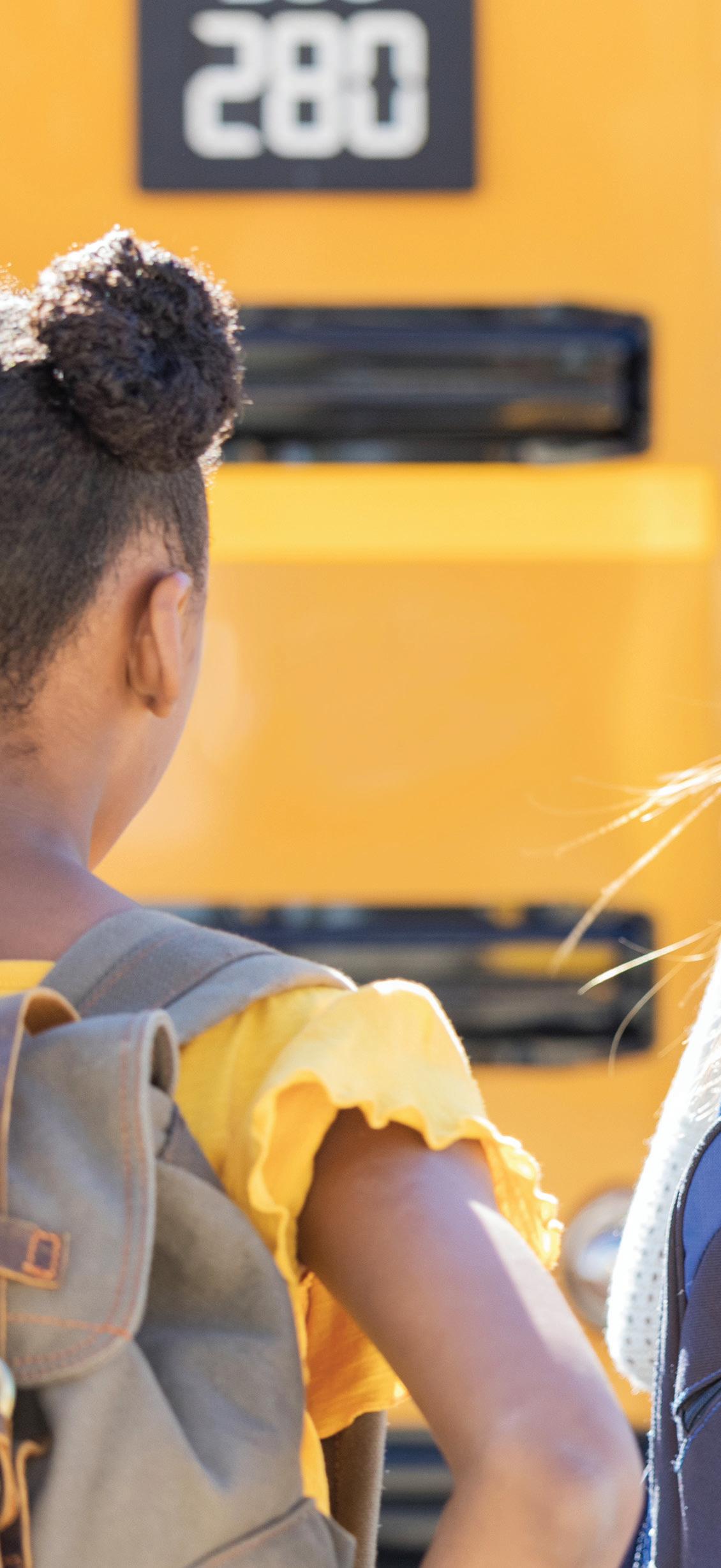
“The goal is to hit the ground running,” says Laurie Kopp Weingarten, an independent education consultant and president of One-Stop College Counseling in Marlboro. She recommends that students and parents review their school’s student handbook and website before school starts to understand their schedule and course selections.
Abraham emphasizes the importance of time management and organizational skills from the get-go. He recommends students schedule their homework, study sessions and extracurricular activities in a planner or digital calendar. “Prioritizing tasks and breaking larger assignments into manageable steps can enhance organization and reduce overwhelm,” he says.
Students should stay as focused as possible when completing homework and take the time to understand it, Weingarten adds. “The goal is to learn and study while they tackle assignments,” she says.
In high school, things start to count for their college application, and students should sign up for honors classes their freshman year if appropriate (as in only if they’re ready), says Weingarten. But the goal is to “challenge, not overwhelm themselves,” she says, and while students should do their best, staying up all night to study isn’t a good idea. For optimal academic performance and mental health, teens
“...SETTING
AND CHOOSING A BALANCED COURSE LOAD ARE ESSENTIAL.”

must get eight to ten hours of sleep each night.
“To manage the pressure of maintaining a good GPA and performing well on standardized tests, setting realistic goals and choosing a balanced course load are essential,” says Abraham. Early and consistent test preparation can alleviate stress and improve performance, he says.
Weingarten emphasizes the importance of self-advocacy— students should connect with their teachers early on if they find themselves struggling in a subject. Teachers can offer guidelines on how to study more e ciently, and it may be possible to change their class schedule early in the year (before students find themselves underwater).
Rising freshmen may be apprehensive about making new friends, but Weingarten points out that starting a new school is an excellent opportunity to form new connections. She urges students to join clubs, try out for sports, and engage in activities that interest them. “Additionally, if a student realizes that their particular interest or hobby isn’t currently represented at their school, they can take the initiative to start a new club,” she says.
Of course, maintaining old friendships is also important, so Weingarten encourages students to stay connected with their middle school friends, too.
No matter how prepared they are, transitioning from middle to high school is a big adjustment. “Parents can play a crucial role in supporting their children as they transition to high school by being empathetic,” says Abraham. He advises parents to establish open lines of communication with teachers, attend parent-teacher conferences, and review their child’s homework regularly. That way, they can stay informed about their child’s progress and any challenges they may face.
Make sure your child knows you’re there for them no matter what.
“It’s always helpful if a parent makes it clear that they are ready to support their teen through di cult times, both academically and socially,” says Weingarten. She says that being available to listen when your teen wants to talk makes a positive difference.
Acclimating to a new school, schedule, rules, expectations, activities, and friends is tough, but there are lots of benefits, too. “Students are often pleasantly surprised to discover they have more freedom than they had in middle school,” Weingarten says. “They feel more grown up, which can be an exciting change!”
—Heidi
Borst is a mother, writer and lifestyle coach based in Wilmington, NC.

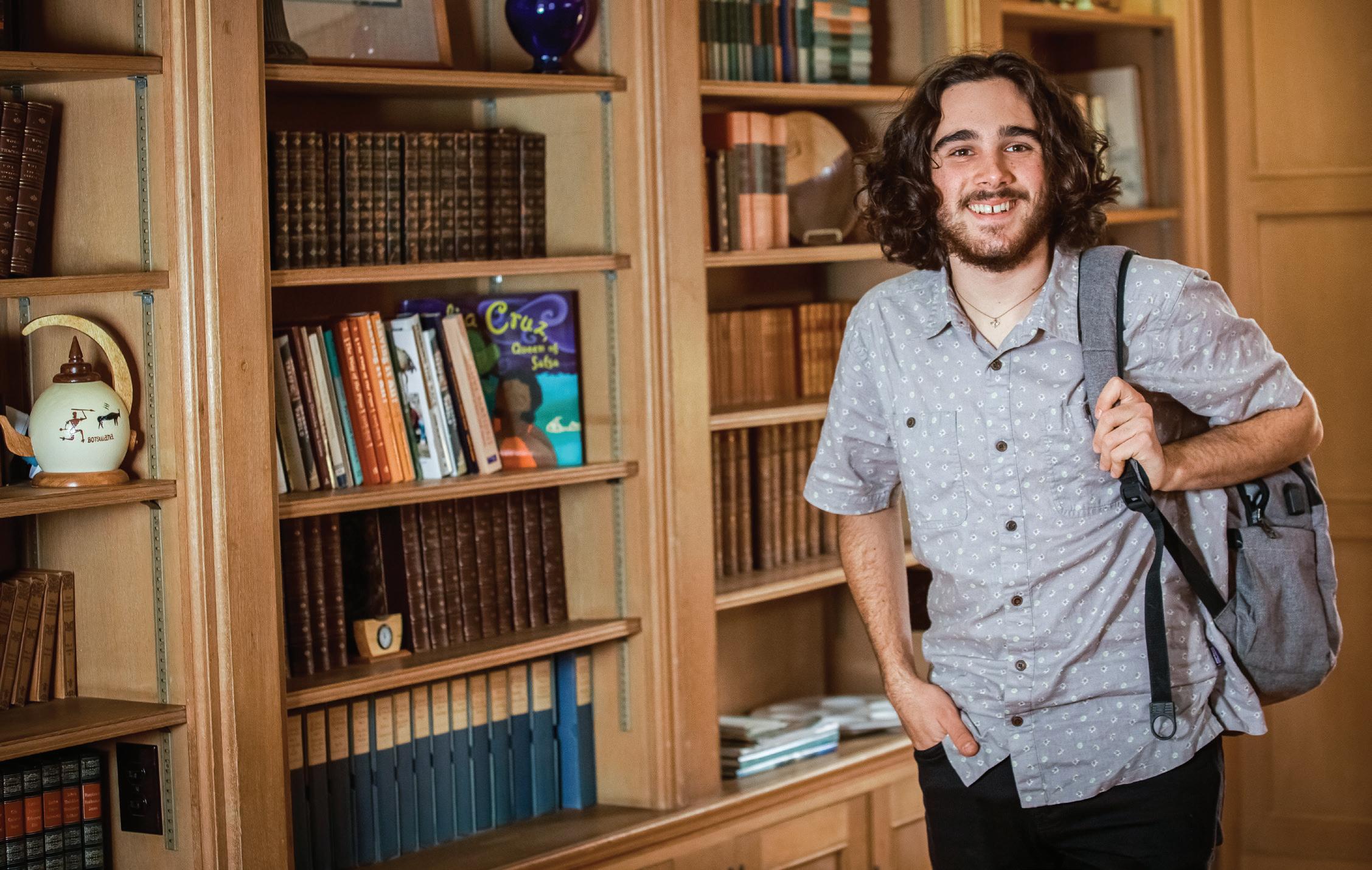

A high school roadmap to preparing for college
By JENNIFER KANTOR
The road to college starts earlier than you think. For many kids—especially those dreaming of top-ranked schools, competitive programs and scholarships— the process often begins before freshman year. Getting a handle on the college timeline early can remove stress. “Being proactive helps prevent last-minute scrambling and the feeling of ‘if I had only known’ and reduces anxiety by keeping students on track for their goals,” says Elaine Cataneo, an educational consultant based in Maplewood.
Although every child’s timeline is unique to them, all students should do as well as they can academically in the most rigorous classes they can handle. For extracurriculars, freshmen should try a few things and see what sticks, narrow their focus sophomore year to activities they’re passionate about and that align with college goals, and take on leadership roles their junior and senior years. And if they don’t? There’s no single path to college (or success outside of college, for that matter). There are lots of less competitive schools, fabulous community colleges, fantastic two-year programs leading to interesting careers, and other roads to be taken. And it all works out. But, if your child is on a college-prep path, here’s what you should know to keep pace.
Connect with a professional advisor when and if it feels right for you. Some hire help as early as freshman or sophomore year but this comes with a much heftier price tag. “A college counselor provides expert guidance from the start, advising students on course selection, extracurricular activities, and standardized testing timelines, ensuring that students are happily engaged and thus on track,” says Cataneo, noting that the increasing demands on high school guidance counselors leave little time for the ever-changing needs of today’s college-bound students. Later on, advisors can help curate a school list tailored to your child and help manage essays and the complicated application process. (For some parents, this alone is worth the cost, which can run about $5,000 and up for a comprehensive package.) Find someone a liated with Independent Education Consultants Association (IECA) or the New Jersey Association for College Admission Counseling (NJACAC), or tap into your parent network for recommendations (they always know). If you’re late to the game, don’t worry—college counselors are skilled at meeting kids wherever they are in the process.
According to Cataneo, colleges like to see progression (i.e. four years of increasingly di cult language, or Art 1 through AP) and completion. For example, many colleges want to see Algebra through to Calculus on a transcript—even for non-STEM students—which requires getting on an advanced track in middle school or taking a math class over the summer. Generally speaking, if your child plans to take a slew of AP classes, you need to plot this out early in high school to make sure they are in the right courses and there’s room in their schedule each year.
Summer is a good time to make the rounds. During the school year (such as when schools are closed during the NJEA Convention week in
NJ) is even better to get a sense of what a college is like in session, so plan visits with this in mind. Tours can help your child figure out what they want in terms of size and setting, which can help narrow down their list. And while it may be impossible to tour every school on your child’s wish list, those at the top definitely deserve a visit no later than junior year. This is how some schools gauge demonstrated interest, and real interest can potentially boost the chance of admission.
Plan to start studying at least 2-3 months before scheduled exams, and register as early as possible to secure a seat at a nearby location. Cataneo advises students to take the SAT or ACT as soon as they complete Algebra 2—this makes the summer before junior year (or even earlier) ideal to begin test prep for most kids. “Many students think they need Precalculus, and this is just not the case. In fact, the further they get from Algebra ll, the harder it becomes to recall topics like simple slope calculations or the few geometry topics on the test, making test prep more challenging.” This also allows plenty of time for retakes. As for the ACT and science, timing the test is not as clear cut. Basically, most kids will have two of the trifecta (Biology, Chemistry and Physics) done by early junior year, and according to Cataneo it’s the scientific ideas that matter more than sheer content. “The ability to work with science concepts should be there,” she says, even if they haven’t mastered every subject.
There’s lots to do. Students should start requesting teacher recommendations during their junior year, and follow up on stragglers after the summer. During the summer before senior year, students should be finalizing their list of schools, signing up for and filling out the Common Application; taking note of deadlines, especially for early decision and action; working on their many essays; and polishing up portfolios and any major-related supplemental materials. They should also get comfortable with the application process—for example, learning how the guidance o ce handles recommendations and transcript requests. Parents should start gathering tax information for FAFSA and CSS to submit for financial and scholarships. Come spring, when acceptances come in, students will need to accept, decline, or if waitlisted, prepare to express continued interest.
But that’s not all. Yes, the timeline is pretty crucial in college planning, says Jenna Shulman, a college consultant based in Florham Park. “But it’s also important to understand that every student is different, so the timeline is not a ‘one-size-fits-all’ method. With the exception of undecided students, there’s a case to be made that every major requires extra planning, some majors more seriously than others,” she says. Which is why it’s extra important that students, especially ones with a focus, talk to admissions counselors to ask them what they are looking for when they are reviewing an application. Here are some examples:
Many art schools and programs expect to see a prospective student’s work. It’s common for students to attend portfolio classes or hire art teachers to help students create pieces that showcase
THE TIMELINE IS PRETTY CRUCIAL IN COLLEGE PLANNING … BUT IT’S ALSO IMPORTANT TO UNDERSTAND THAT EVERY STUDENT IS DIFFERENT, SO THE TIMELINE IS NOT A ‘ONE-SIZE-FITS-ALL’ METHOD.


talent across multiple forms of media—which many will present at a National Portfolio Day Association event sophomore or junior year in order to have pieces evaluated. Every school wants a different number of pieces, so students need to check admissions requirements early.
Theater majors will have to present their work through audition reels (it’s not uncommon to hire advisors junior year to help select and perfect monologues), and show interest performing, whether in school plays, attending theater programs, or working at a camp.
Along with a transcript stacked with advanced science classes (which requires deft planning), schools want to see expressed interest in their desired field, whether audiology or medicine or nursing. This may mean a pre-college program devoted to medical research, volunteering as an EMT, or getting a job at a doctor’s o ce, says Shulman. Many health science majors want to see shadowing hours (following a practitioner in the field), as do most accelerated health programs (BS/MD, accelerated PT and OT) which want the same, as well as high science grades, says Shulman.
Top grades in advanced math are the minimum for acceptance into engineering and computer science programs, plus involvement
in STEM-related clubs (like robotics), pre-college STEM programs, and real-world tech endeavors (such as teaching kids to code). It also doesn’t hurt to have an award, a patent, or a successful app under their belt. Arguably the most competitive major, it’s tricky to transfer into once already attending a school, so for many kids this is their only shot at this lucrative path.
Even less “competitive” departments may want to see expressed interest for admission. A school focused on “fit to major” will want to see that a would-be communications major runs club social media pages, takes English classes at the highest level, participates in the school’s newspaper or television station, edits the literary journal, strings for a local publication, or even simply maintains a personal blog or thriving social media presence, says Shulman.
Although not a major, athletes hoping to earn a school scholarship or play at the college level will need to attend sports camps and showcases, and prepare and submit a 5-10 minute reel (sometimes professionally edited) to coaches at prospective schools.
Here’s one timeline you don’t need to worry about: Scholarships. “One hears so much about outside scholarships, but the best money almost always comes from the institution itself so keep your grades up,” says Cataneo.


From zoos and planetariums to farms and museums, your kids won’t want to miss visiting these fun and educational spots throughout NJ and beyond!
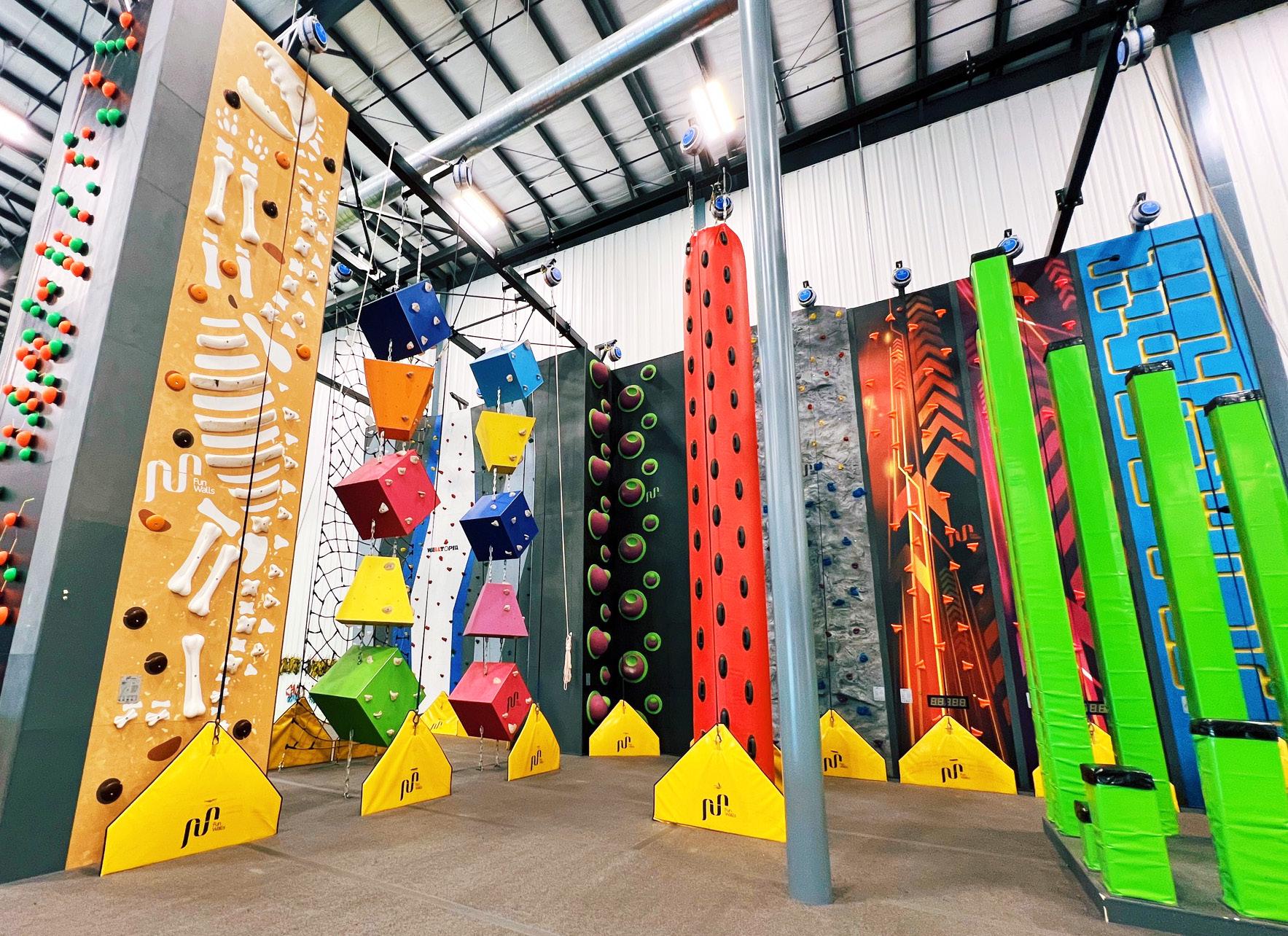
ADVENTURE AQUARIUM
1 Riverside Dr., Camden 844-474-3474 adventureaquarium.com
The aquarium is home to more than 15,000 aquatic animals including the largest collection of sharks in the Northeast. Take a walk through the shark tunnel, and get up close to hippos.
ALICE PAUL INSTITUTE
128 Hooton Rd., Mount Laurel 856-231-1885 alicepaul.org
Named after NJ-born suffragist Alice Paul, there are many opportunities to learn about how she dedicated her life to gender equality initiatives through K-8 programs, teen education, a Girls Leadership Council and community endeavors.
ALLEY POND ENVIRONMENTAL CENTER
224-65 76th Ave., Oakland Gardens, NY 718-229-4000 alleypond.org
Explore nature with a walk outside, spend time with animals and take a lesson on topics ranging from endangered species to animal adaptations.
AMAZING ESCAPE ROOM
Multiple Locations
amazingescaperoom.com
The fun is contagious as you and the kids work together to find clues and solve the mystery before time runs out.
AMERICAN MUSEUM OF NATURAL HISTORY
200 Central Park W., NYC 212-769-5100 amnh.org
Learn about everything from dinos to outer space, discover the secret world of elephants, see hundreds of butterflies and more.
AMERICA’S GROW-A-ROW
150 Pittstown Rd., Pittstown 908-662-6304
americasgrowarow.org
Lessons here offer kids education on nutrition, culinary skills and the importance of volunteering.
BATTLESHIP NEW JERSEY
62 Battleship Pl., Camden 856-966-1652
battleshipnewjersey.org
Visit the massive ship docked in the Delaware River where you can take a guided tour, sleep in the bunks and have the chance to fire the saluting gun.
BAYSHORE CENTER AT BIVALVE
2800 High St., Port Norris 856-785-2060
bayshorecenter.org
When you arrive, look for the A.J. Meerwald, a former oyster schooner that now serves as a hands-on sailing classroom. The Delaware Bay Museum offers shore-based programs on campus and along the scenic Maurice River.
BIG BROOK PARK
Main Entrance: 521 Rte. 520, Marlboro Activity Center: 80 Boundary Rd., Marlboro 732-842-4000, ext. 4312
monmouthcountyparks.com
The rolling hills and open meadows attract families who want to hike, cycle or look for wildlife. But the real attraction is fossil collecting in Big Brook, where you can hunt for treasures.
BRONX ZOO
2300 Southern Blvd., Bronx, NY
718-220-5100
bronxzoo.com
Listen to the roar of tigers, feed animals in the farmyard, watch red pandas from the monorail and see dozens of butterflies in the greenhouse. There are special exhibits to celebrate the zoo’s 125th anniversary this year.
BROOKLYN BOTANIC GARDEN
990 Washington Ave., Brooklyn, NY 718-623-7220
bbg.org
Make sensory observations, discover plant adaptations and learn about tree diversity while exploring gardens filled with multicolored flowers.
BURY THE HATCHET
Multiple Locations
burythehatchet.com
Rent out a private lane and throw axes for some healthy competition, having a good time while also teaching your kids team-building skills.
CAPE MAY POINT STATE PARK
303 Rte. 629, Cape May 609-884-2159
capemay.com
You can’t miss the giant lighthouse, which is 157.5 feet (or 199 steps) from the base to a panoramic view of the southernmost area of New Jersey. Come back down to the Nature Center, which is a small aquarium-meets-museum. There are wooden walkways to the beach where you can look for birds, check out World War II bunkers and enjoy the peacefulness of the ocean.
CENTENARY STAGE COMPANY
715 Grand Ave., Hackettstown 908-979-0900
centenarystageco.org
Kids can watch a variety of professional theater shows, live music and dance events. If they feel inspired, they can join the touring company or take a Young Performers workshop.
CHARLES J. MUTH MUSEUM
Hinchliffe Stadium, 186 Maple St.,Paterson thehinchliffestadium.com/museum
The stadium where the New Jersey Jackals play is one of the last remaining Negro League ballparks. Inside the museum, you can learn about Paterson’s hometown hero Larry Doby, who was the first Black player in the American League. Walk through exhibits of baseball artifacts, watch a documentary inside the mini theater, and see one of the original midget cars that raced around the track.



















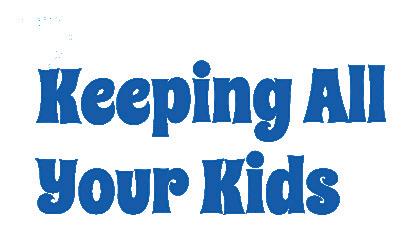
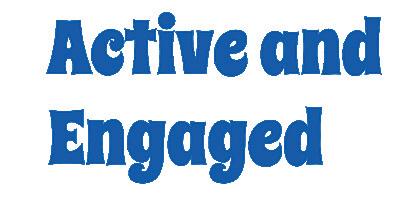
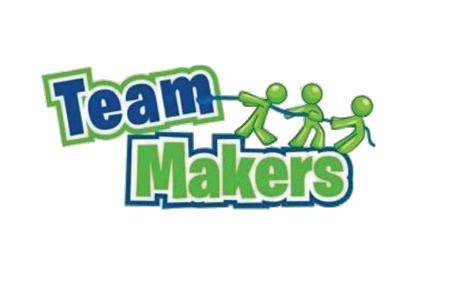


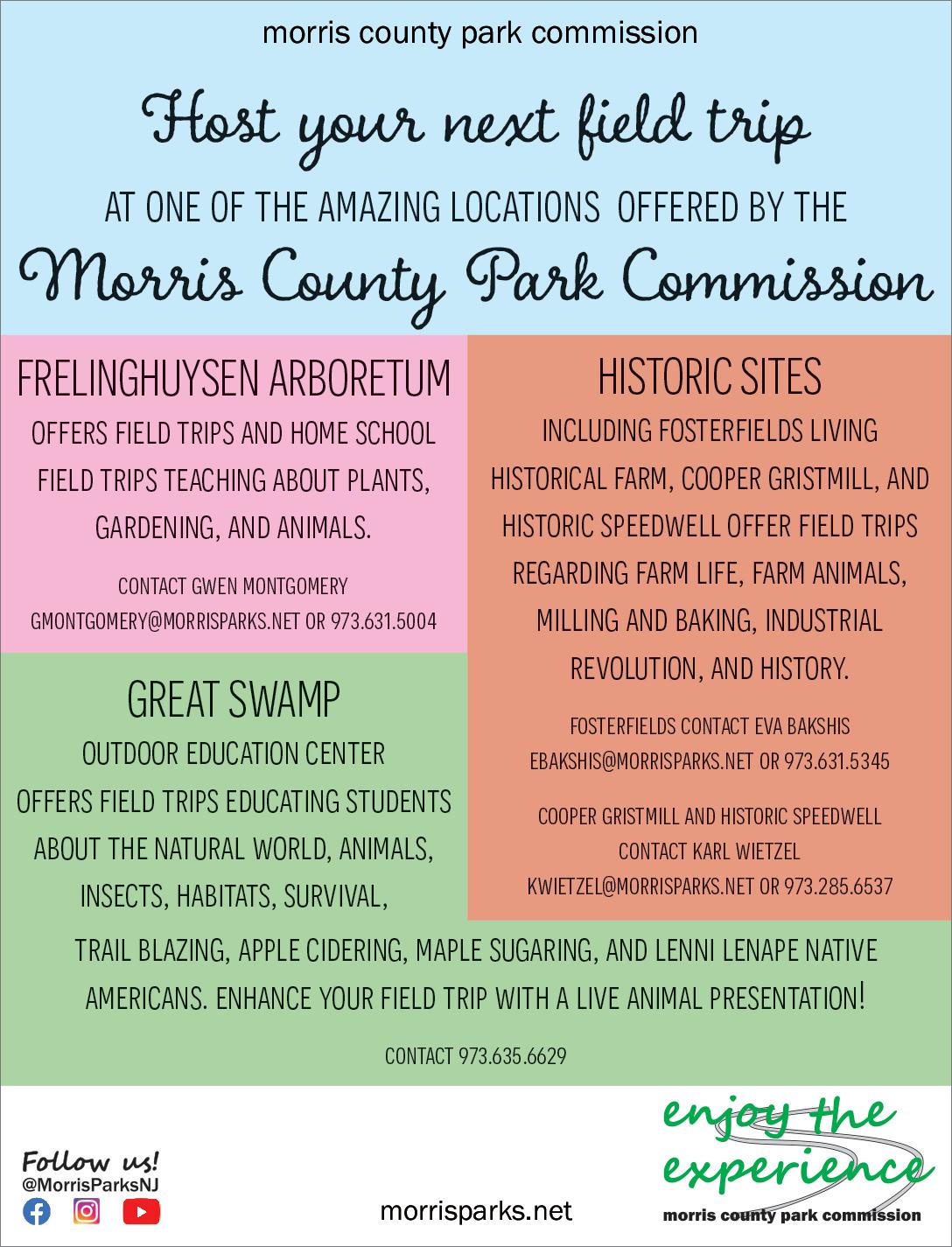

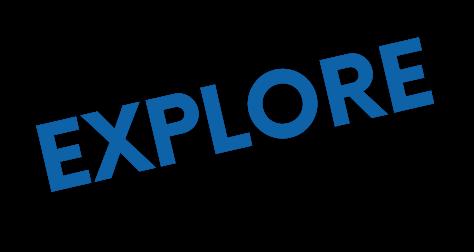



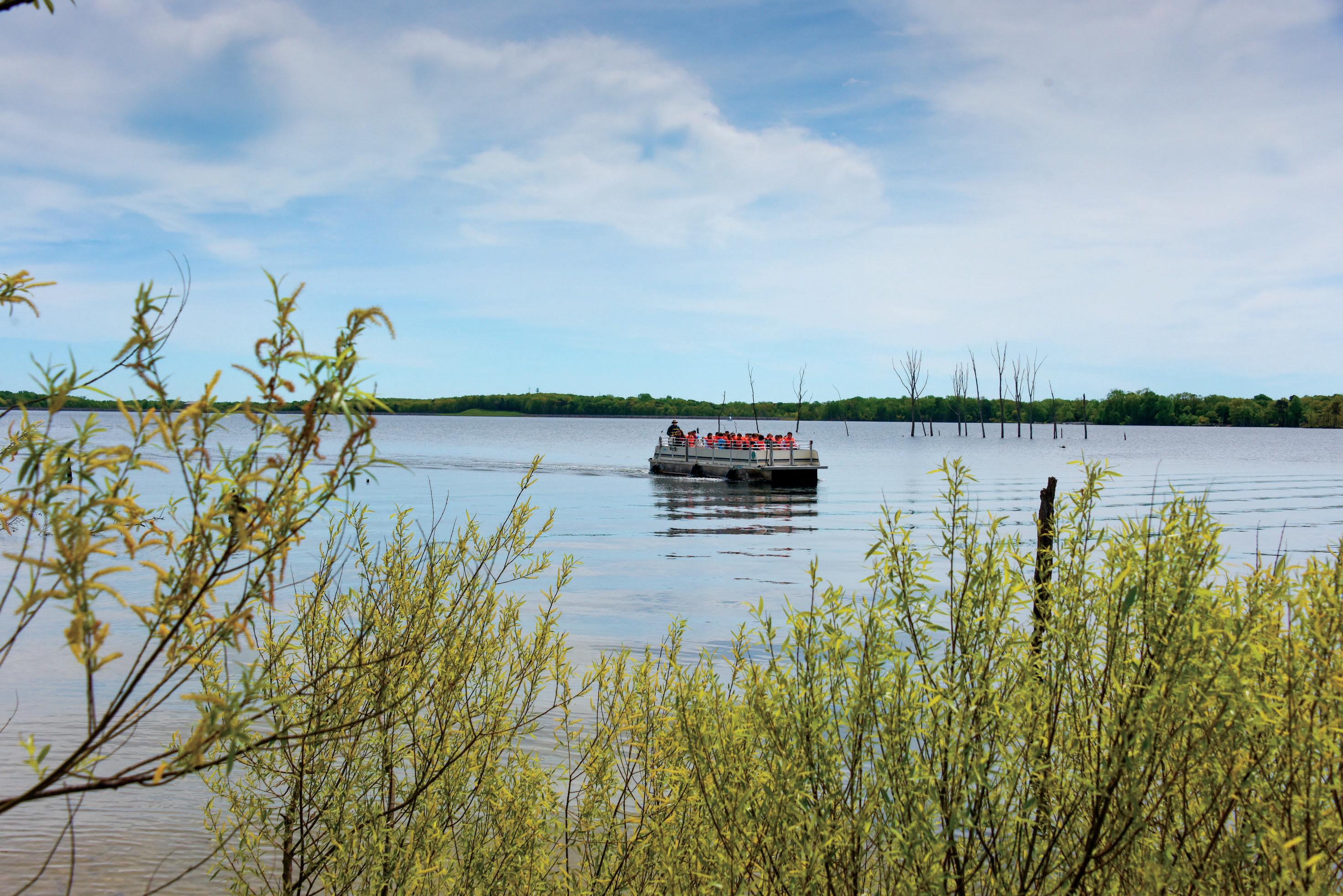
Pier 83, W. 42nd St., NYC
212-563-3200
circleline.com
From the outdoor deck you’ll see views of 140 NYC landmarks. Circumnavigate the island of Manhattan, head to the Statue of Liberty and see the best of the skyline on different cruise options.
66 Rte. 24, Chester Twp. 908-879-5463
morrisparks.net
Nathan Cooper built this gristmill in 1826, and it’s one of the only remaining restored waterpowered mills in NJ. Step back in time during a 45-minute tour led by a costumed master miller who will run the mill’s machinery.
PPL Pavilion, 815 W. Hamilton St., Allentown, PA 610-841-1875
davincisciencecenter.org
Newly relocated, see exhibits like My Body, Curiosity Hall and Science in the Making that have info in both English and Spanish. The City Center Gallery has 8,000 square feet for rotating exhibits.
244 Werimus Rd., Hillsdale 201-666-0472
demarestfarms.com
If you’ve got a school group of 20 or more, make a weekday reservation starting September 16 to pick your own pumpkins. You can go on a hayride, visit the petting zoo, hang out in the play area, and treat yourself to apple cider and donuts.
101 Park St., Bordentown 609-924-4646
drgreenway.org
The 200-year-old house-turned-museum is located on land that was occupied by Lenape tribe members for thousands of years. Joseph Napoleon Bonaparte, the exiled King of Spain, took residence in the 1880s. On site, there are archaeological displays, a circa-1819 painting of Bonaparte in its original frame, and 27 heritage crops that were grown by the earliest settlers.
1 American Dream Way, East Rutherford 833-263-7326
skyviewsobservationwheels.com
It may look like a Ferris wheel but it’s actually an observation wheel with beautiful views of the NYC skyline.
3 Overpeck Park Dwy., Leonia 855-999-9010
jerseydinos.com
This outdoor prehistoric theme park takes kids ages 3-11 on a scientific expedition that features 30 life-sized, moving dinosaurs. Children can learn about the link between dinos and the birds of today at the Great Moments of Discovery Theater.
FOSTERFIELDS LIVING HISTORICAL
73 Kahdena Rd., Morris Twp. 973-326-7645
morrisparks.net
Kids can experience life as it was in the 1920s when Cara Foster—whose father, Charles,

purchased the land in 1881—ran the farm. They’ll have a blast collecting eggs, riding wagons around the farm and looking at antique automobiles.
FRANKLIN MINERAL MUSEUM
32 Evans St., Franklin 973-827-3481
franklinmineralmuseum.com
Children will learn about the history of mineralogy by participating in rock collecting and viewing minerals and artifacts. Exhibits include the Fluorescent Room, featuring a 32-foot-long display of fluorescent minerals; and the American Indian Room, which has Native American tools.
GREAT SWAMP WATERSHED ASSOCIATION
568 Tempe Wick Rd., Morristown 973-538-3500
greatswamp.org
High schoolers can learn about water quality monitoring or explore terrestrial ecology/wetlands hydrology, while younger kids can search for macroinvertebrates in a local body of water or do a pond dip to identify aquatic inhabitants.
GROUNDS
80 Sculptors Way, Hamilton 609-586-0616
groundsforsculpture.org
More than a garden, this beautiful spot combines both nature and art: the grounds boast more than 270 sculptures across 42 acres. Family Open Studios are all-day drop-in workshops available the first Saturday of each month.
7 Ledgewood Ave., Netcong 973-347-4946
growingstage.com/classroom-resources
Part of the Children’s Theatre of New Jersey inside The Historic Palace Theatre, kids on a field trip can watch a matinee performance of the show from the main stage. There are also lesson plans and sessions with the artistic team members.
1057 Hillcrest Rd., Ridgewood 201-444-2955
healthbarnusa.com
Kids will learn the benefits of fresh produce and a healthy lifestyle through a visit to the garden, a smoothie taste test, a seasonal food IQ game and a planting session with recyclable pots.
196 State Park Rd., Blairstown 908-543-4808
hiddenbrookranchalpaca.com

The owners love to share their knowledge of the small herd that lives on 10 acres at the foot of Jenny Jump State Park.
HISTORIC LONGSTREET FARM
44 Longstreet Rd., Holmdel 732-946-3758
monmouthcountyparks.com
See how farmers worked in the 1890s. Tour the farmhouse, milk a cow, play games from the Victorian period, shear sheep, and use a wood stove for cooking. Get an up-close look into Dutch building traditions at the Holmes-Hendrickson House Museum, built way back in 1754.
THE HISTORIC VILLAGE AT ALLAIRE
4263 Atlantic Ave., Farmingdale 732-919-3500
allairevillage.org
This former factory town is now a living history experience where kids can get a glimpse of life during the 19th century. Historic interpreters dressed in period garb give tours and demos about life pre-electricity. 2024 is its 200th year.
HOLLAND RIDGE FARMS
108 Rues Rd., Cream Ridge hollandridgefarms.com
This spectacular springtime tulip farm puts on a gorgeous flower festival filled with sunflowers, kids’ activities and photo ops in the fall. Groups of 20+ more can sign up for a field trip or guided tour.
HOWELL LIVING HISTORY FARM
70 Woodens Ln., Hopewell Twp. 609-737-3299
howellfarm.org
Trips to this farm from the 1700s include hands-
on experiences that engage kids in the seasonal activities of a working farm. They’ll be taught about the food and the work that animals provide while completing daily chores.
INFOAGE SCIENCE & HISTORY MUSEUMS
2201 Marconi Rd., Wall Twp. 732-280-3000 infoage.org
Explore more than two dozen museums and exhibits where you can learn about space exploration, electronic warfare, radio technology, military communications, World War II artifacts, computers, the Lenni-Lenape Tribe and more.
INTREPID MUSEUM
Pier 86, W. 46th St. and 12th Ave., NYC 877-957-7447
intrepidmuseum.org
Visitors to the legendary aircraft carrier will be amazed by the Space Shuttle Pavilion, where they’ll get a close-up look at a retired NASA space shuttle, a former military submarine kids can walk through and the interactive Exploreum. There’s a special exhibit on the Apollo’s trip to the moon, and the newly restored Concorde has returned.
IRON PEAK SPORTS & EVENTS
137 Mountain View Rd., Hillsborough 908-758-2739
ironpeakse.com
Whether the kids like soccer, lacrosse, football, basketball, volleyball or baseball, there’s an activity for them at this indoor and outdoor sports complex. There’s also an arcade, virtual reality games, a climbing area and a Ninja course.
LAKOTA WOLF PRESERVE
89 Mt. Pleasant Rd., Columbia 908-496-9244
lakotawolf.com
Take a Wolf Watch tour to get to know these majestic animals. You’ll see wolves, bobcats, lynx and foxes at play.
LIBERTY HALL MUSEUM
1003 Morris Ave., Union 908-527-0400
libertyhall.kean.edu
This 50-room mansion offers a hands-on look into the daily life of a colonial child of the 1700s by seeing their toys, school, games and chores.
LIBERTY SCIENCE CENTER
222 Jersey City Blvd., Jersey City
201-200-1000
lsc.org
The kids will get hands-on experience with electricity, bounce around an Infinity Climber, crawl through the Touch Tunnel and see a show in the biggest planetarium in the western hemisphere. The fall exhibit is dedicated to blue whales.
MACCULLOCH HALL
45 Macculloch Ave., Morristown 973-538-2404
maccullochhall.org
First graders can tour the historic garden, kitchen and drawing room while kids in grades 2-3 get the scoop on plant cycles and composting. Older students can view the works of cartoonist Thomas Nast or learn about the Civil War.
MANASQUAN RESERVOIR
Visitor Center: 311 Windeler Rd., Howell 732-919-0996
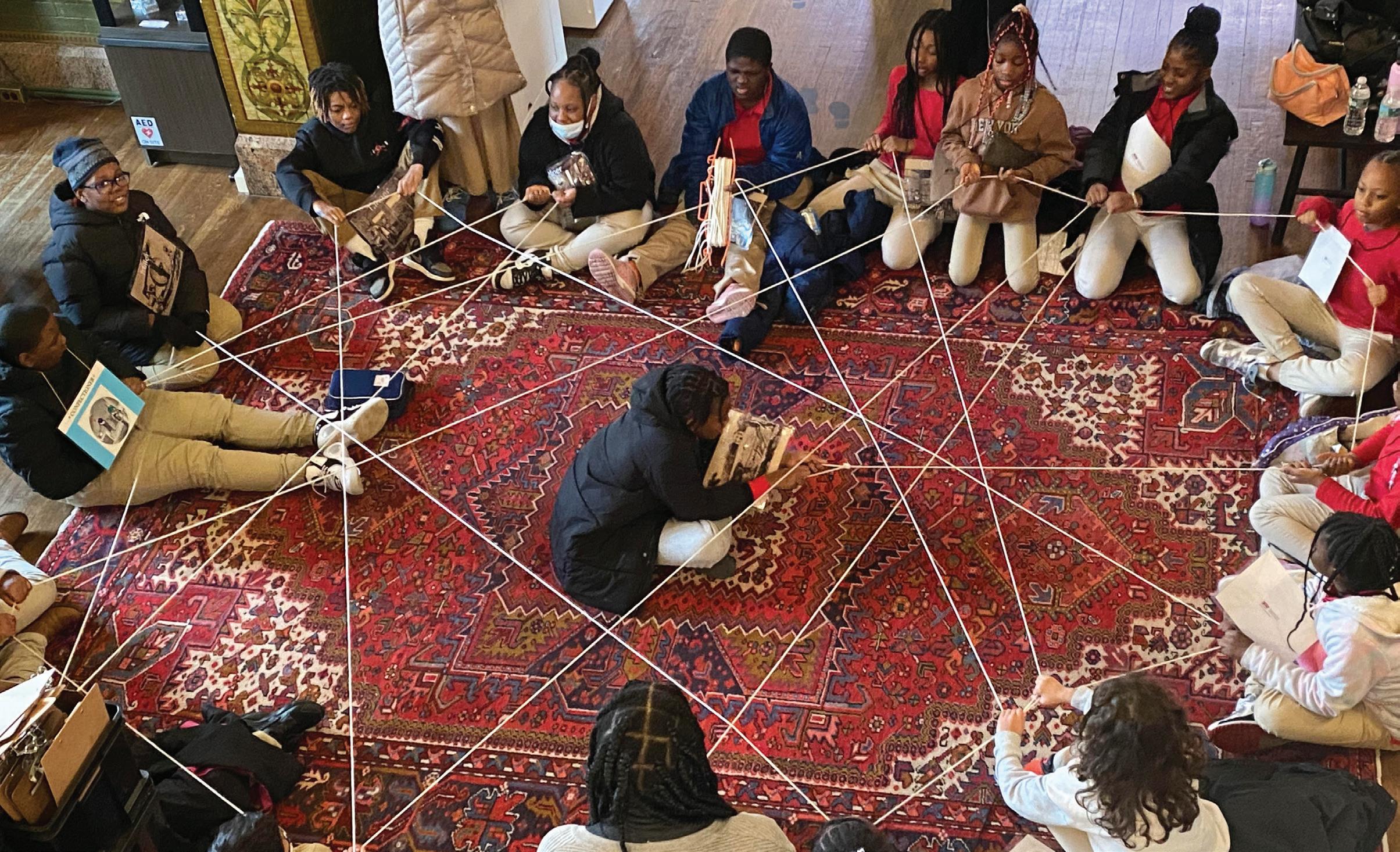
Environmental Center: 331 Georgia Tavern Rd., Howell
monmouthcountyparks.com
Inside the Environmental Center you’ll find activities for kids, plus live animals like turtles and snakes. Outside, take a hike, rent a kayak or rowboat, go bird watching or play on the playground. Free fishing lessons or paid sailboat lessons are offered in the summer; in the winter, try ice fishing, ice skating and boating.
MEDIEVAL TIMES
149 Polito Ave., Lyndhurst
201-933-2220
medievaltimes.com
Be a guest of the Queen at this royal banquet. The castle is home to knights, falcons and horses who’ll put on a show complete with hand-to-hand combat and jousting. Take a look at medieval weaponry in the Hall of Arms.
MONMOUTH COUNTY PARK SYSTEM
Multiple Locations
monmouthcountyparks.com
Group programs include live animal presentations, nature walks, eco-adventures, freshwater ecology and marine life. You can visit Historic Walnford for 19th-century learning, or Longstreet Farm to meet the animals.
MONMOUTH MUSEUM
765 Newman Springs Rd., Lincroft 732-747-2266
monmouthmuseum.org
Explore monthly themes with crafts and workshops. Wander the Becker Children’s Wing and WonderWing to board pirate ships, or visit the Meyer Art & Nature Area for educational programs. This fall, Dinosaurs: Fossils Exposed debuts.
MONTCLAIR ART MUSEUM
3 S. Mountain Ave., Montclair 973-746-5555
montclairartmuseum.org
Interactive field trips support students in creating art and making observations of artwork based on a chosen theme. These include works covering different time periods, LGBTQ artists of color and landscapes.
MORRIS COUNTY PARK COMMISSION
Various locations morrisparks.net
If your kid loves nature and the environment, they can visit sites like the Cooper Gristmill, Fosterfields Living Historical Farm, Great Swamp Outdoor Education Center or the Pyramid Mountain Natural Historic Area.
MORRIS MUSEUM
6 Normandy Heights Rd., Morristown 973-971-3700
morrismuseum.org
Think galleries of geological finds from NJ and beyond, as well as retro trains and more. Be an inventor for the day at the Spark!Lab where
engineering challenges abound.
MORRISTOWN NATIONAL HISTORICAL PARK
30 Washington Pl., Morristown 973-539-2016, ext. 210 nps.gov/morr
This National Historical Park is located at the site where General George Washington and the Continental Army survived the winter of 1779. There are 27 miles of hiking trails to explore. Go on a scavenger hunt to become a Junior Ranger.
MUSEUM OF EARLY TRADES & CRAFTS
9 Main St., Madison 973-377-2982, ext. 10 metc.org
Programs at this 50-year-old museum cover early American toys, immigrant experiences and voting rights. Kids will learn about the real-life experiences of a child living on an 1800s farm and try to problem-solve the hardships they faced.
MUSEUM OF ICE CREAM
558 Broadway, NYC 866-665-1018
museumoficecream.com
Learn about the beloved treat’s history, play in the colorful sprinkle pool and take a trip down NYC’s highest indoor slide.
NATIONAL MUSEUM OF MATHEMATICS
225 Fifth Avenue, NYC

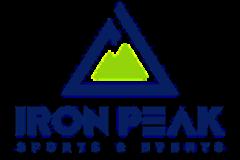


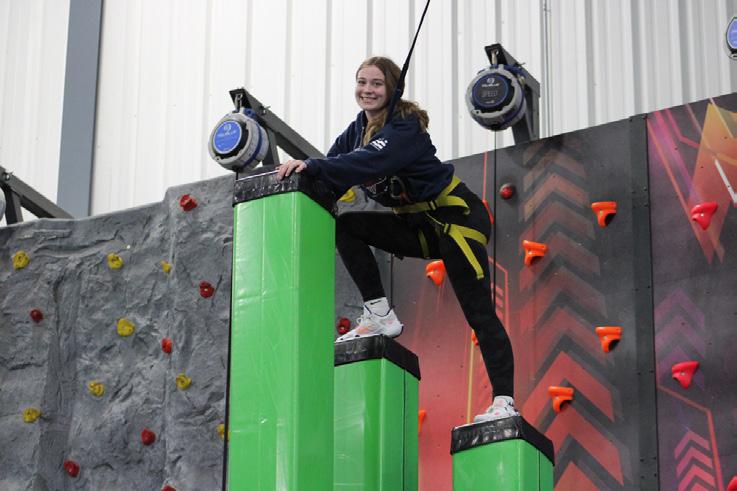
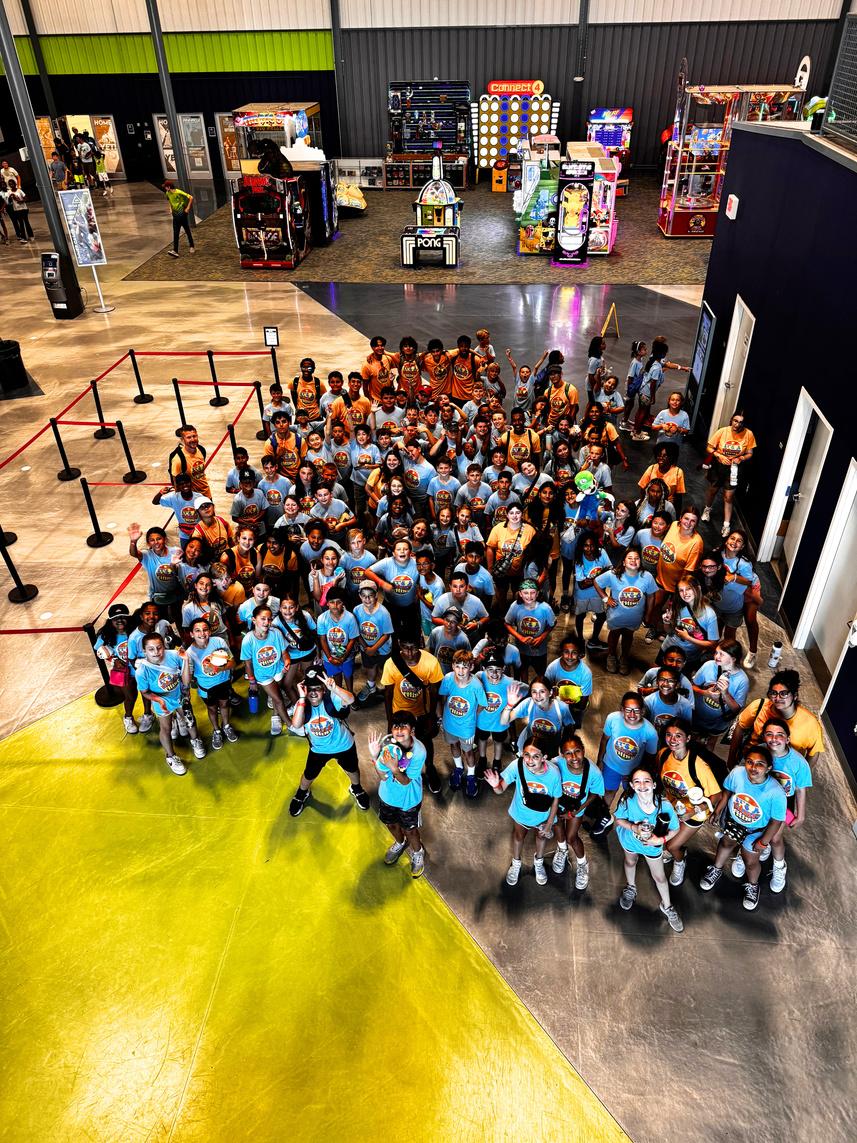
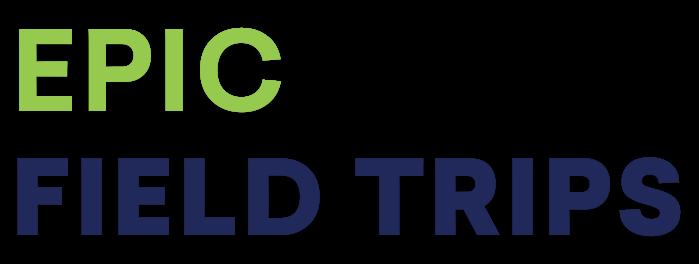
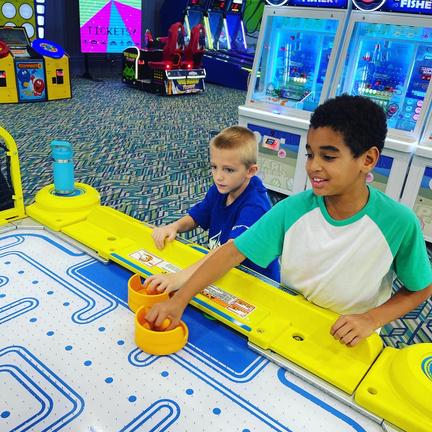

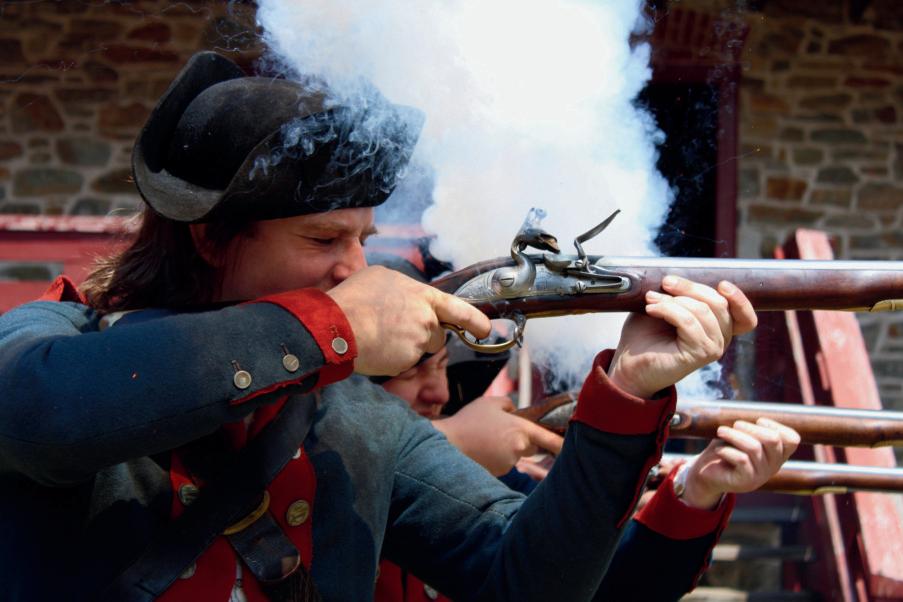
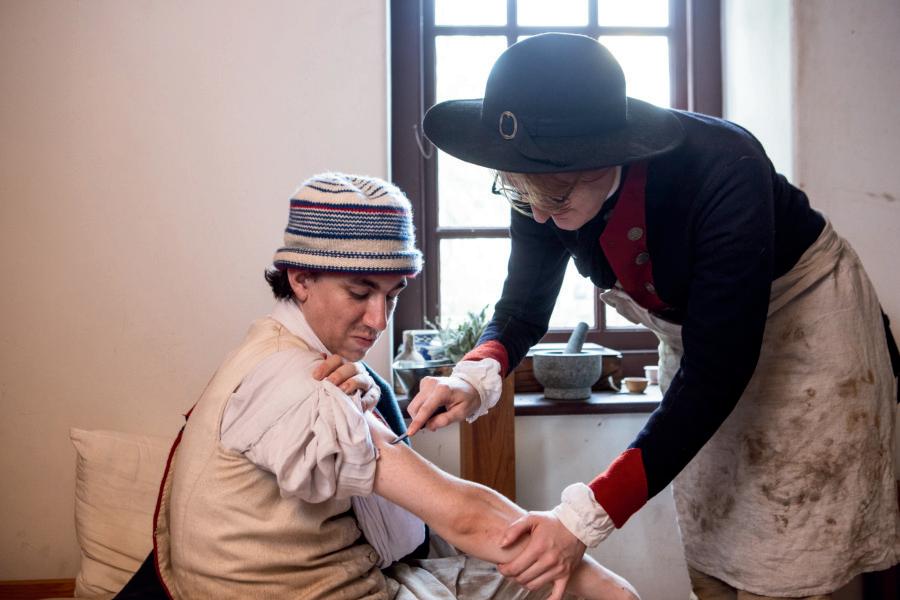

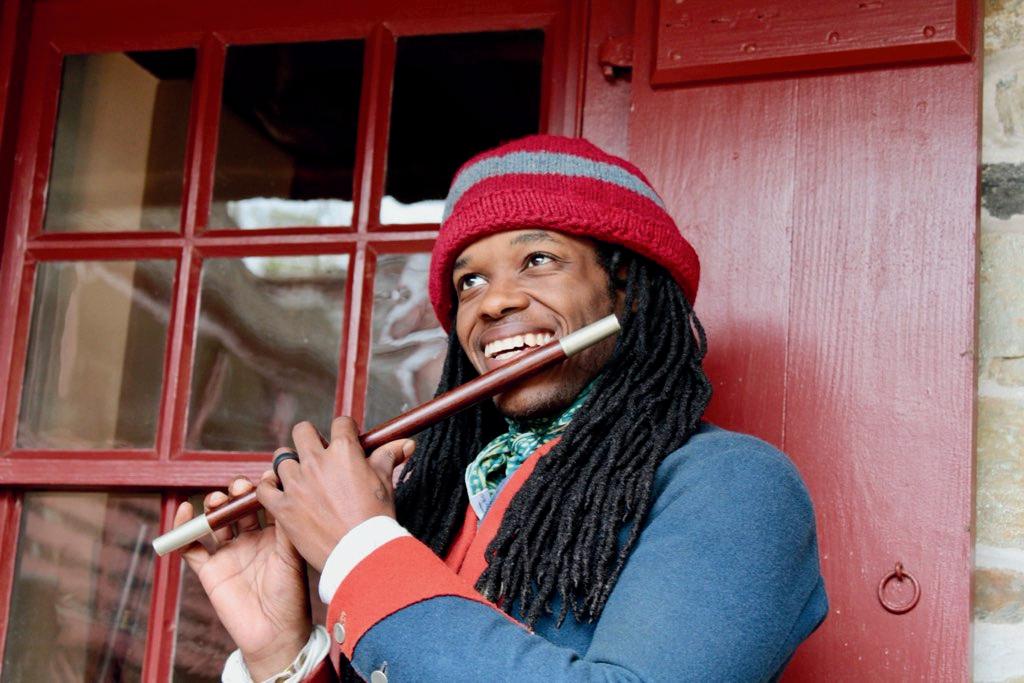
212-542-0566
momath.org
Students from pre-K through 12th grade can attend educator-led sessions on topics like cryptography and topology. Kids can make a mandala, control math games with their feet, animate stereographic images and solve puzzles.
THE NEWARK MUSEUM OF ART
49 Washington St., Newark
973-596-6550
newarkmuseumart.org
Travel around the world in a day with exhibits about Asian, African and Mediterranean art. Lie inside of a kaleidoscope, stand before a Tibetan Buddhist altar and gaze at Native American clothing at this museum committed to inclusivity.
JERSEY HALL OF FAME ENTERTAINMENT AND LEARNING CENTER
1 American Dream Way, East Rutherford njhalloffame.org/entertainment-learning-center
Express your Jersey pride through a series of interactive exhibits where you learn all about New Jersey’s history and heroes. Join a hologram of a famous singer on stage, take a journey to the moon, check out Thomas Edison’s Model T, and host an interview on Late Night Jersey TV.
NEW JERSEY SEA GRANT CONSORTIUM
Various locations
732-872-1300
njseagrant.org
Young marine biologists can learn everything about the sea, from the history of Sandy Hook to how humans affect the ocean and its inhabitants. The Coastal Experience offers a collection of marine science field trips for grades pre-K to 12.
NEW JERSEY STATE HOUSE
145 W. State St., Trenton
609-847-3150
njstatehousetours.org
Kindergarteners to second graders will learn about state symbols, county flags, and the things that make NJ unique. Third through sixth graders will learn about how laws are made, visit the Senate and General Assembly chambers, and explore the building’s art and architecture.
JERSEY STATE MUSEUM
205 W. State St., Trenton
609-292-1382
nj.gov/state/museum
Dive into fascinating pieces of Garden State history like Native American artifacts and dinosaur and shark fossil records. Visit the planetarium or see the gigantic-sized toys from years gone by.
NEW YORK HALL OF SCIENCE
47-01 111th St., Corona, NY
718-699-0005
nysci.org
Step into The Happiness Experiment, Design Lab or more than 450 other exhibits at this science museum. Now open is Building Imagination, a 4,500-square-foot bilingual exhibition that has five areas of imaginative play with an underwater area, transportation section, Cloud City and a garden.
OLD BARRACKS MUSEUM
101 Barrack St., Trenton
609-396-1776
barracks.org
Head to the state’s capital to see where soldiers lived during the Revolutionary War. Get sent back to 1777 to experience what life was like in Washington’s Army as you “Meet the Past.”
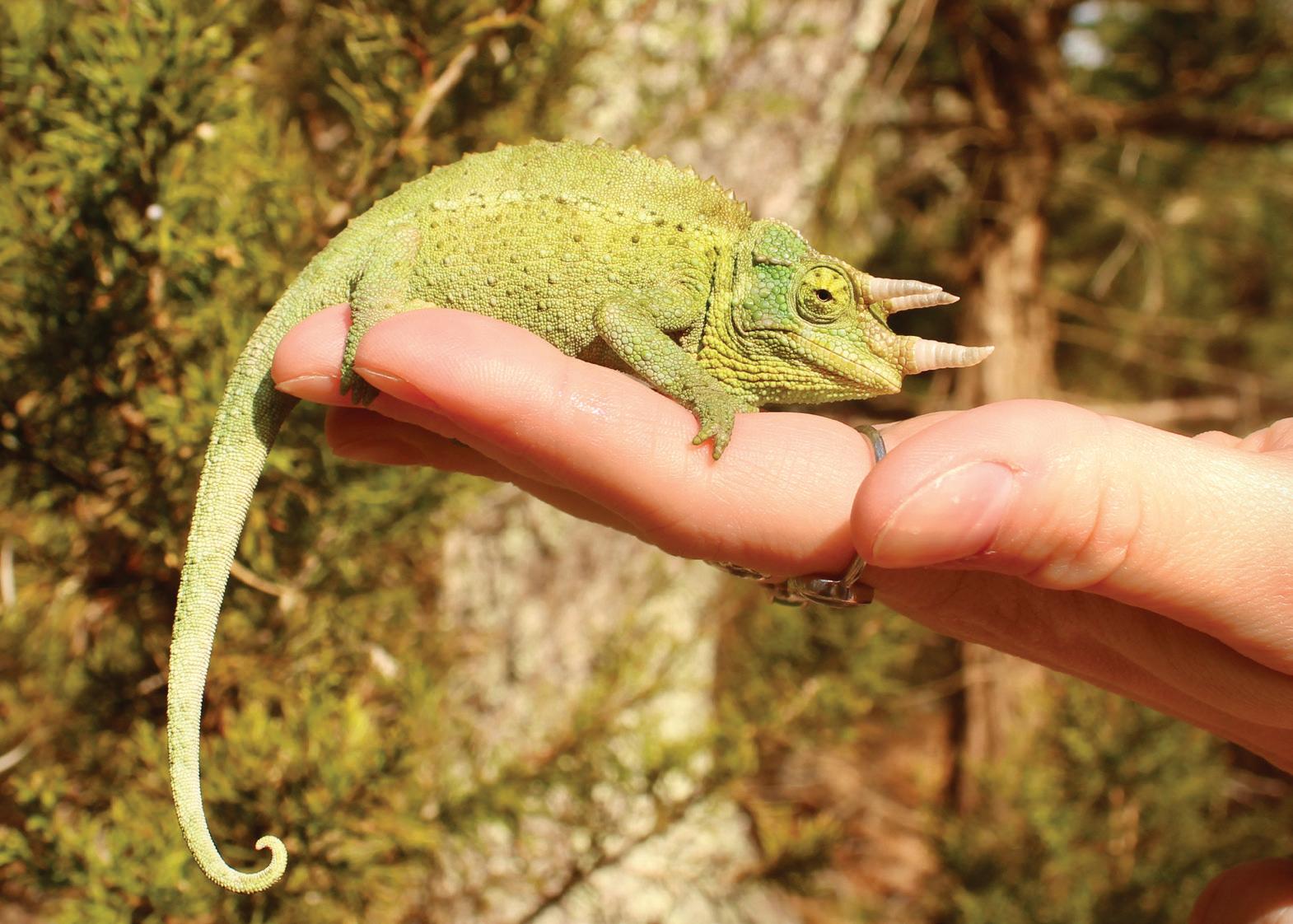
THE PAPER BAG PLAYERS
1120 Avenue of the Americas, NYC 212-353-2332
thepaperbagplayers.org
Field trips are held at theaters in the five boroughs of NYC. The 65th anniversary season features “It’s A Marvelous Paper Bag World!”
PATERSON GREAT FALLS
72 McBride Ave., Paterson 973-523-0370
nps.gov
This stunning natural attraction has magnificent waterfalls that you can marvel at while learning the history of Paterson and its industrial renaissance.
PHILADELPHIA ZOO
3400 W. Girard Ave., Philadelphia, PA 215-243-1100
philadelphiazoo.org
Behind-the-Scenes Experiences are semiprivate meet-and-greets with your favorite animals and the keepers who care for them.
PLAY BIG ZONE
300 Campus Dr., Morganville 732-991-1993
playbigzone.com
This spot is great for kids who are super active. They’ll have a ball on The Spin Zone Bumper Cars, playing Human Foosball, inside the Laser Maze, combatting obstacles in The Amazing Race, playing in the arcade and inside the virtual reality pod.
PLEASE TOUCH MUSEUM
4231 Avenue of the Republic, Philadelphia, PA 215-581-3181
pleasetouchmuseum.org
Touching the exhibits is mandatory here! In Wonderland, kids will feel like they’ve fallen down the rabbit hole, and in Rocket Room, they’ll learn about space and launch their own rocket in Mission Control. Coming soon is Wild Kratts: Creature Power based on the PBS show.
POPCORN PARK ANIMAL REFUGE
1 Humane Way, Forked River 609-693-1900
ahscares.org/education-programs
At this sanctuary for injured, ill or elderly farm animals, birds and wildlife, kids will see everything from goats to peacocks to bears in one place. Join a General Wildlife or Wildlife in NJ program, learn about Alien Creatures (invasive species) or hear about an animal keeper’s life.
QUEENS COUNTY FARM MUSEUM
73-50 Little Neck Parkway, Queens, NY 718-347-3276
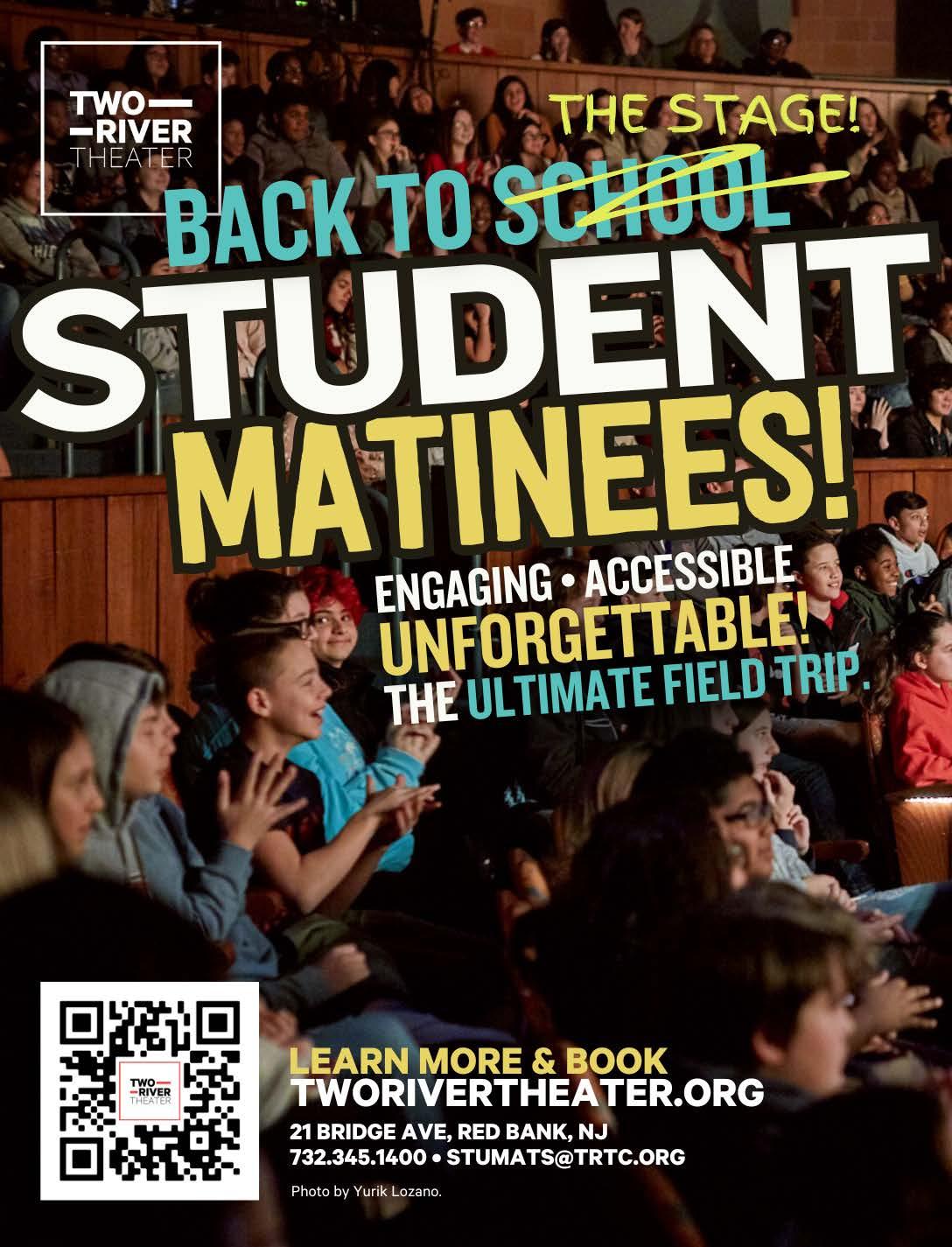
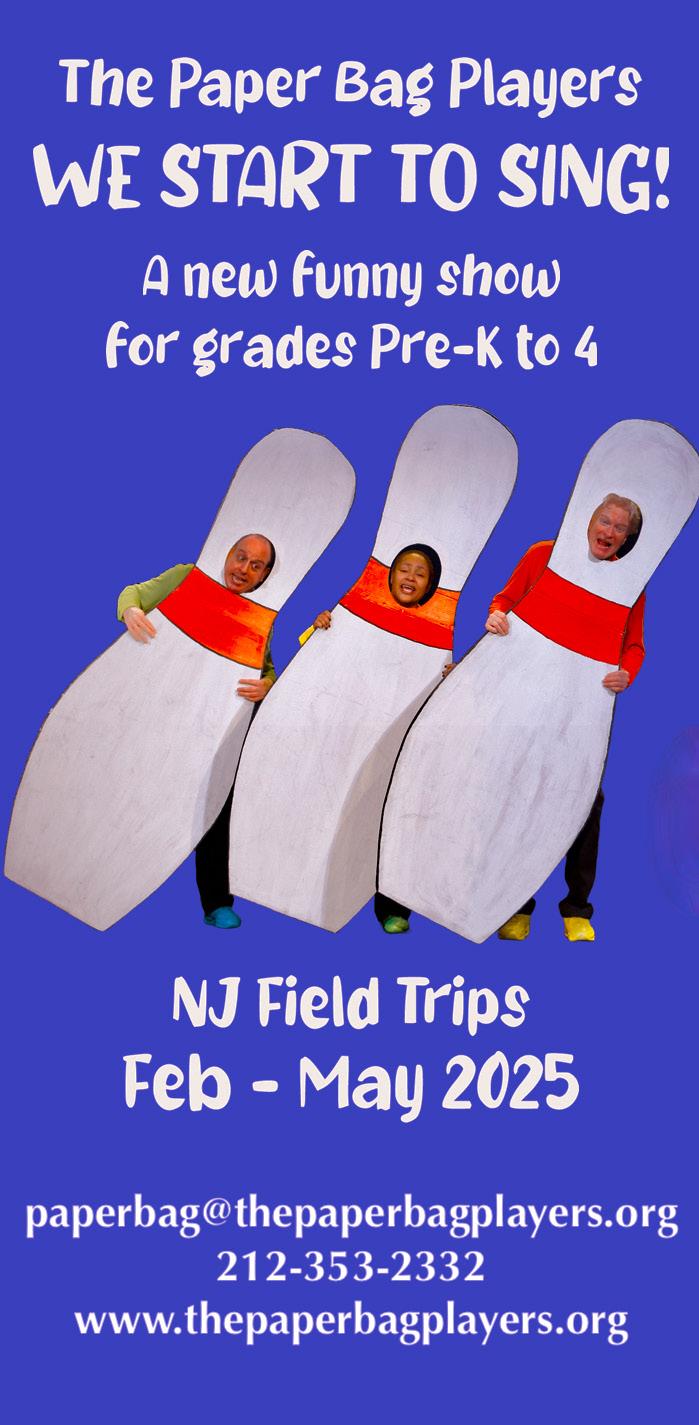
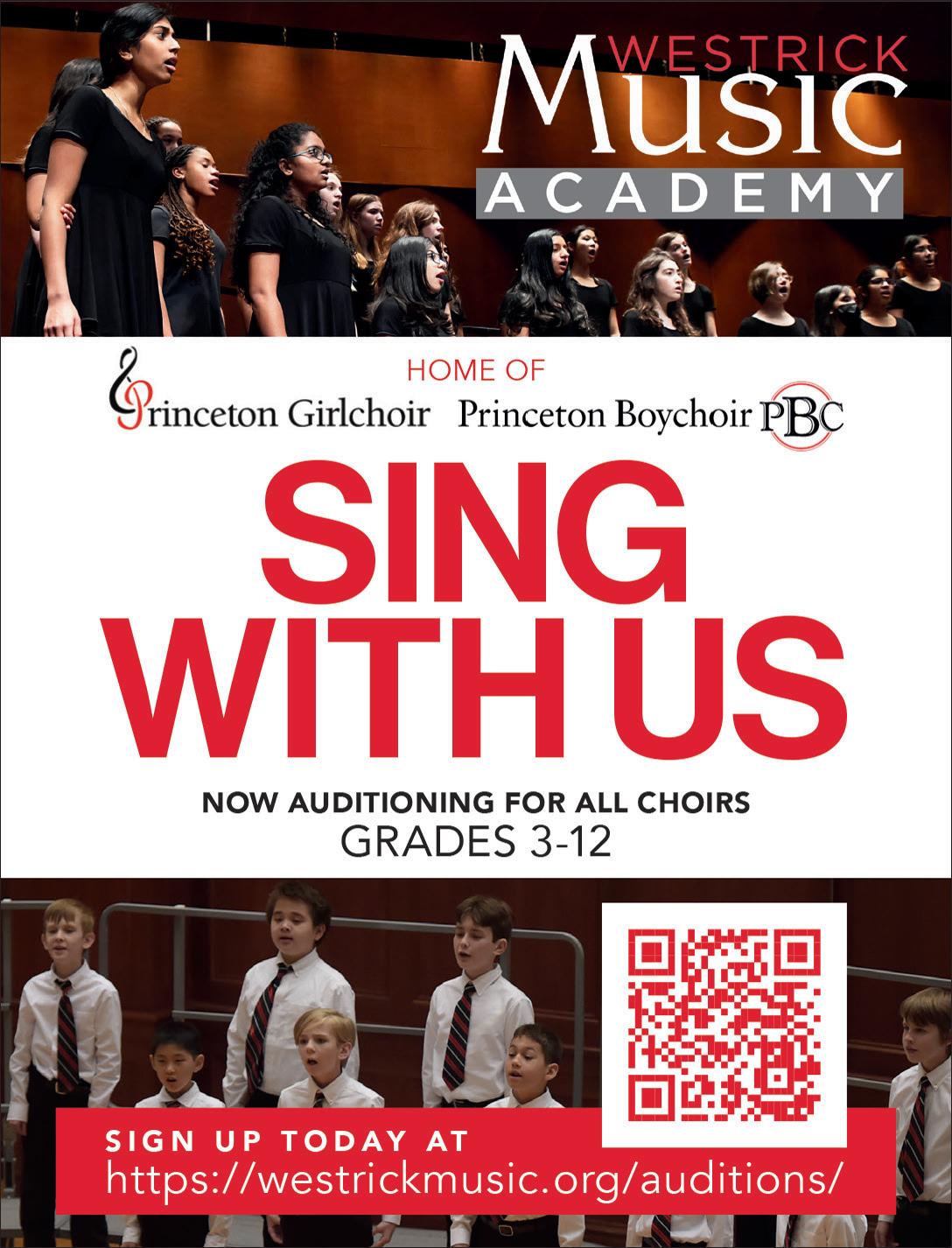


queensfarm.org
The School to Farm Programs have a “menu” by season, including animal adventures, composting, beekeeping, seeding and quilting.
RAMANESSIN CREEK
Holmdel Park, 44 Longstreet Rd., Holmdel 732-946-9562
co.monmouth.nj.us
Walk the Ramanessin Trail along the brook or the Steeplechase Trail by the site’s old farm routes. You can access Bayonet Farm, as well as an area to collect Cretaceous marine fossils and shark teeth.
RAPTOR TRUST
1390 White Bridge Rd., Millington 908-647-2353
theraptortrust.org
Kids can learn about hawks, eagles, owls and other birds of prey being rehabilitated. They’ll explore the personal histories of these species and see them in action while touring the facility.
RARITAN VALLEY COMMUNITY COLLEGE PLANETARIUM
118 Lamington Rd., Branchburg
908-231-8805
raritanval.edu/private-shows-planetarium
Journey through the solar system, ride alongside a star or enter a black hole while inside the planetarium. Unlock your students’ creativity with a laser concert where they’ll draw pictures on the dome as music plays.
RED MILL MUSEUM
56 Main St., Clinton 908-735-4101
theredmill.org
Kids will learn about everything from life during the 1800s to 19th-century energy production as they walk the grounds or try their hand at woolcarding and candlemaking.
REEVES-REED ARBORETUM
165 Hobart Ave., Summit 908-273-8787
reeves-reedarboretum.org
Meet honeybees, engage in a planting project and create a mini-terrarium at this 13.5-acre arboretum composed of forest and gardens.
160 W. 45th St., NYC
718-701-4998
646-619-8615 for student groups
riseny.co
Experience New York from a different view during this three-part adventure. Fly 30 feet above ground on a flight simulation ride as you soar over

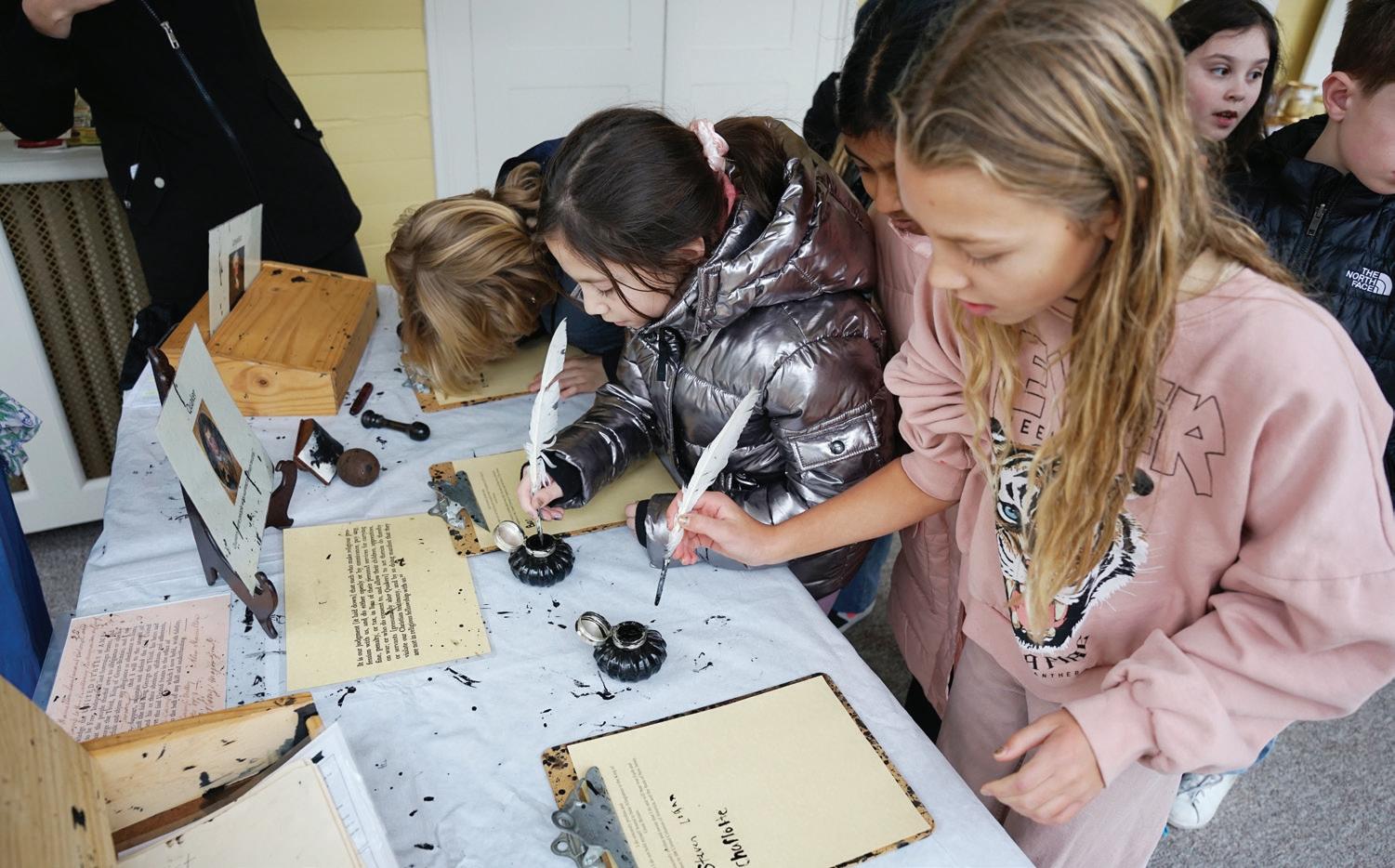
Big Apple, sit down for an immersive film about the very first New York subway, and explore seven interactive exhibits at the museum.
RUTGERS GEOLOGY MUSEUM
85 Somerset St., New Brunswick 848-932-7243
geologymuseum.rutgers.edu
Take a guided tour to learn about dinosaurs, geology, the Ice Age and mummies, with special attention given to NJ-based exhibits.
SCHIFF NATURE PRESERVE
339 Pleasant Valley Rd., Mendham 973-543-6004
schiffnaturepreserve.org
Dubbed the place where “wild things happen naturally,” Schiff is home to 12 miles of trails, 768 acres of protected land and plenty of educational programs. Make sure to check out the Great Meadow and plant garden with native species.
SEA LIFE AQUARIUM
1 American Dream Way, East Rutherford
551-234-6382
visitsealife.com/new-jersey
Kids will come face-to-face with 3,000 different exotic aquatic creatures in more than 20 marine exhibits at The City Under the Sea (and get even closer to some, thanks to the Touchpool). There are also education workshops covering subjects like habitats and animal behavior.
SOLOMON R. GUGGENHEIM MUSEUM
1071 Fifth Ave., NYC 212-423-3500
guggenheim.org
In case the museum’s incredible collections of Impressionist, Post-Impressionist and modern French masterpieces aren’t enough incentive to visit, the building itself is one of eight Frank Lloyd Wright designs designated as a UNESCO World Heritage Site.
SOUTH STREET SEAPORT MUSEUM 12 Fulton St., NYC 212-748-8600
southstreetseaportmuseum.org
This museum offers tours of historic buildings and ships and interactive learning activities. Kids will ride a tugboat or schooner after learning about the 19th-century port of New York.
STATUE OF LIBERTY
Liberty Island, NYC
212-363-3200
nps.gov
Climb the pedestal and access Lady Liberty’s crown. You can also check out the Statue of Liberty Museum and theater. Then head to the National Museum of Immigration on Ellis Island.
30 Plant St., Ogdensburg 973-209-7212
sterlinghillminingmuseum.org
For an underground experience, tour the Zobel Hall Museum, the mine and the Warren Museum of Fluorescence. Sluicing is a good option for children, since they like to sift sand for minerals and fossils through the water trough.
STORM KING ART CENTER
1 Museum Rd., New Windsor, NY 845-534-3115
stormking.org
Kids will marvel at the large-scale works of art and on-site commissions at this open-air arts center located on 500 acres in NY’s Hudson Valley.
400 Tenafly Rd., Tenafly 201-500-8076
teammakersnorthjersey.com
Young kids are divided into teams so they can work on team building, engineering, skill games, science and other experiments they choose.
THOMAS EDISON NATIONAL HISTORICAL PARK
211 Main St., West Orange 973-736-0550, ext. 11 nps.gov
Your kids may know Thomas Edison invented the lightbulb, but what about his other works? Here, they can explore his chemistry lab and tour the Black Maria, Edison’s first film studio.
TiLT MUSEUM
1 American Dream Way, East Rutherford 833-263-7326
americandream.com/venue/tilt-museum
Become one with the art at TiLT, which provides an immersive art experience and optical illusions designed by award-winning artist Tracy Lee Stum.
TWO RIVER THEATER
21 Bridge Ave., Red Bank 732-345-1400
tworivertheater.org
Arts education supports the artist in each student and builds future audiences. There are student matinees, including a special 75-minute abridged Shakespeare play.
TURTLE BACK ZOO
560 Northfield Ave., West Orange 973-731-5800
turtlebackzoo.com
Take a behind-the-scenes tour or get upclose-and-personal with giraffes, sea lions, sea turtles, penguins and butterflies.
VALLEY SHEPHERD CREAMERY
50 Fairmount Rd., Long Valley 908-876-3200
valleyshepherd.com
During a guided farm tour, kids can see the newborn lambs in the spring, or take a wagon ride up the mountain and look inside the cheese aging cave in the fall.
THE WILDLIFE CONSERVATION AND EDUCATION CENTER
303 Midland Ave., Garfield 201-257-2231 thebatcave.org
Students learn how important bats are to the ecosystem. Kids watch presentations on reptiles and rainforest critters, plus see animals up close.
YOGI BERRA MUSEUM & LEARNING CENTER
Montclair State University, 8 Yogi Berra Dr., Little Falls 973-655-2378
yogiberramuseum.org
This museum is dedicated to the New York Yankees legend. Third through 12th graders can choose from Baseball & STEM; Poetry, Spoken Word & Yogi-isms, Gender Equity, Discovering the Negro Leagues and Overwhelming Underdogs.
ZIMMERLI ART MUSEUM
71 Hamilton St., New Brunswick 848-932-7237
zimmerli.rutgers.edu
Kids can check out thousands of pieces of art across several mediums, create stories inspired by portraits and go on interactive educator-led discovery tours at this museum.
—Jennifer Amato, James LaForge, Sunny Sequeira and Nia Sylva contributed to this story.

RATINER SPEECH AND LANGUAGE THERAPY SERVICES
Building Bridges to Success
Serving the community over 20 years
Assessment & Treatment for Speech, Language and Orofacial Myofunctional Disorders in Children and Adults
Sharon Ratiner
MA CCC-SLP, COM NJ License # 41YS00057000
344 Main Street, Suite A, Metuchen sprspeech@yahoo.com ratinerspeechtherapy.com • 848-200-7276

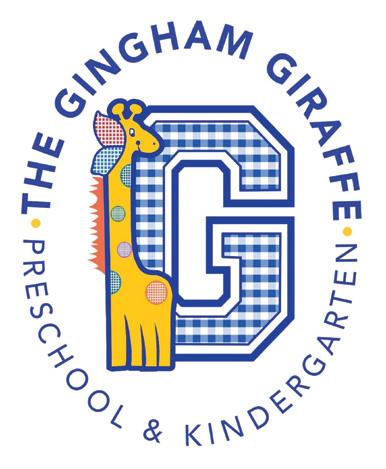
them the best start.
• Morning and Full Day Programs for Ages 2 & up
• Full Day Kindergarten
• 6 month age span in every class
• Academics, Dramatic and Performing Arts, Sports & Movement
234 Southern Blvd., Chatham, NJ 973.635.0033 • www.ginghamgiraffe.com

